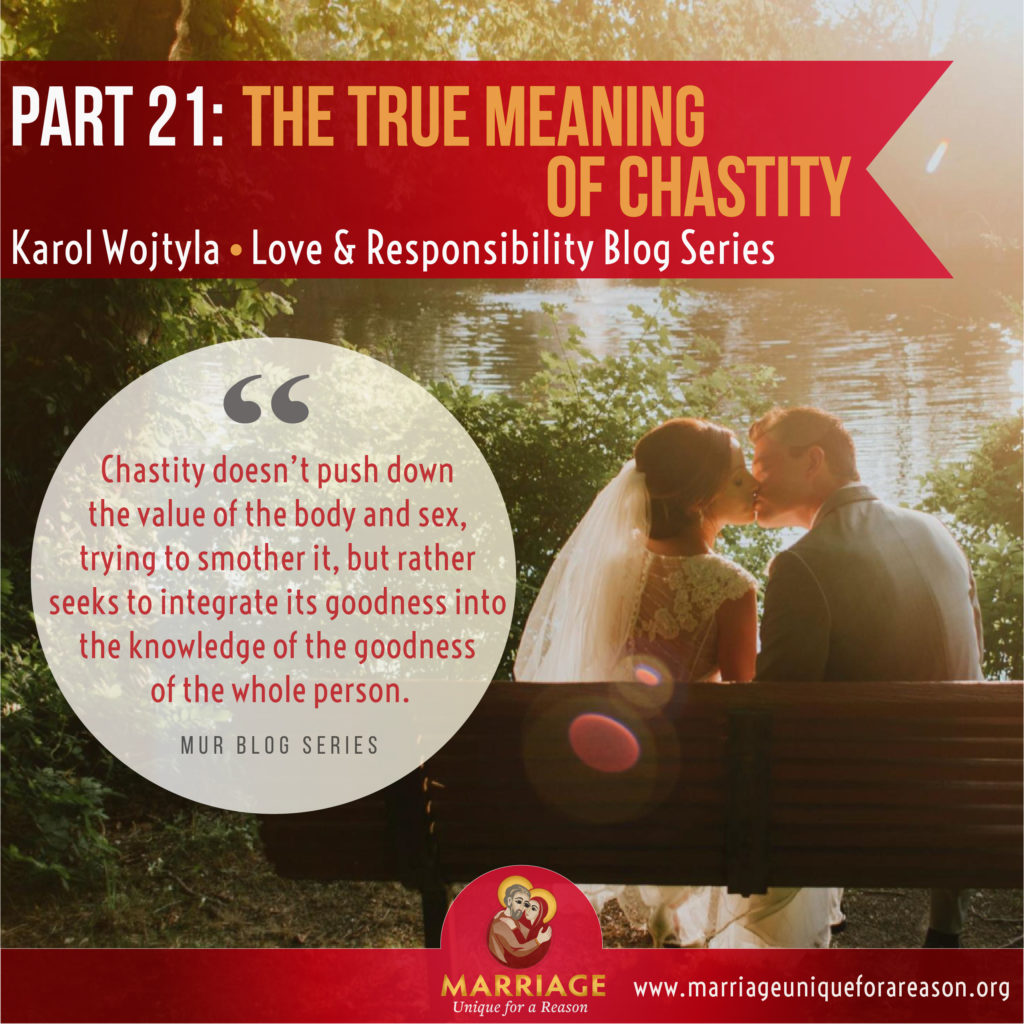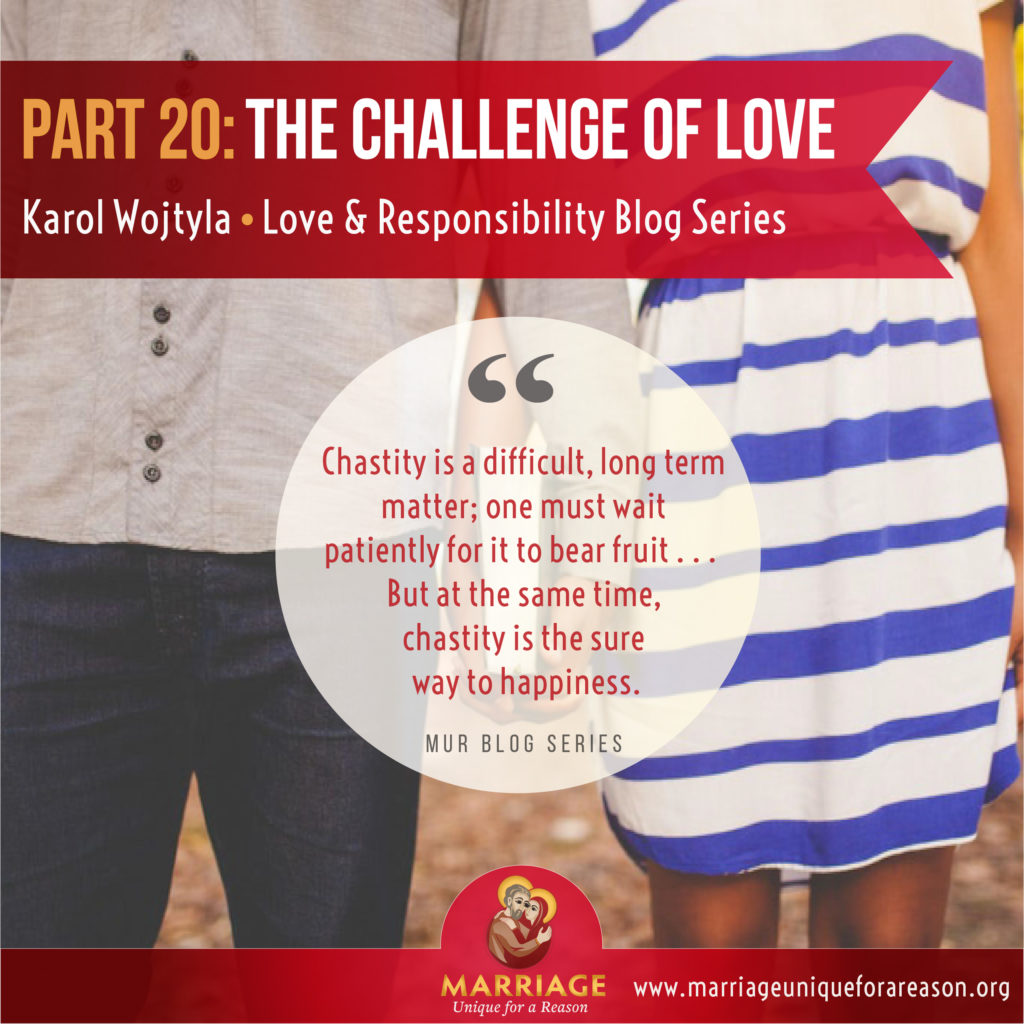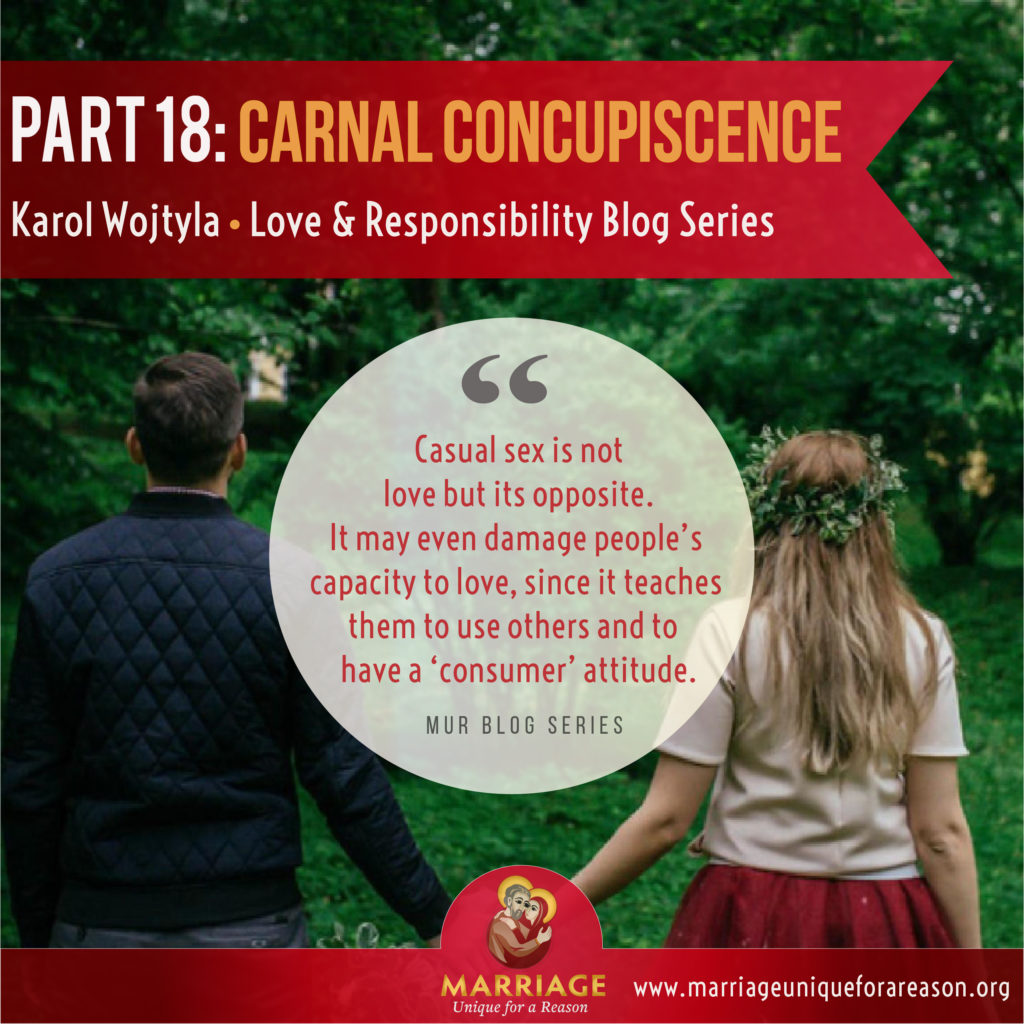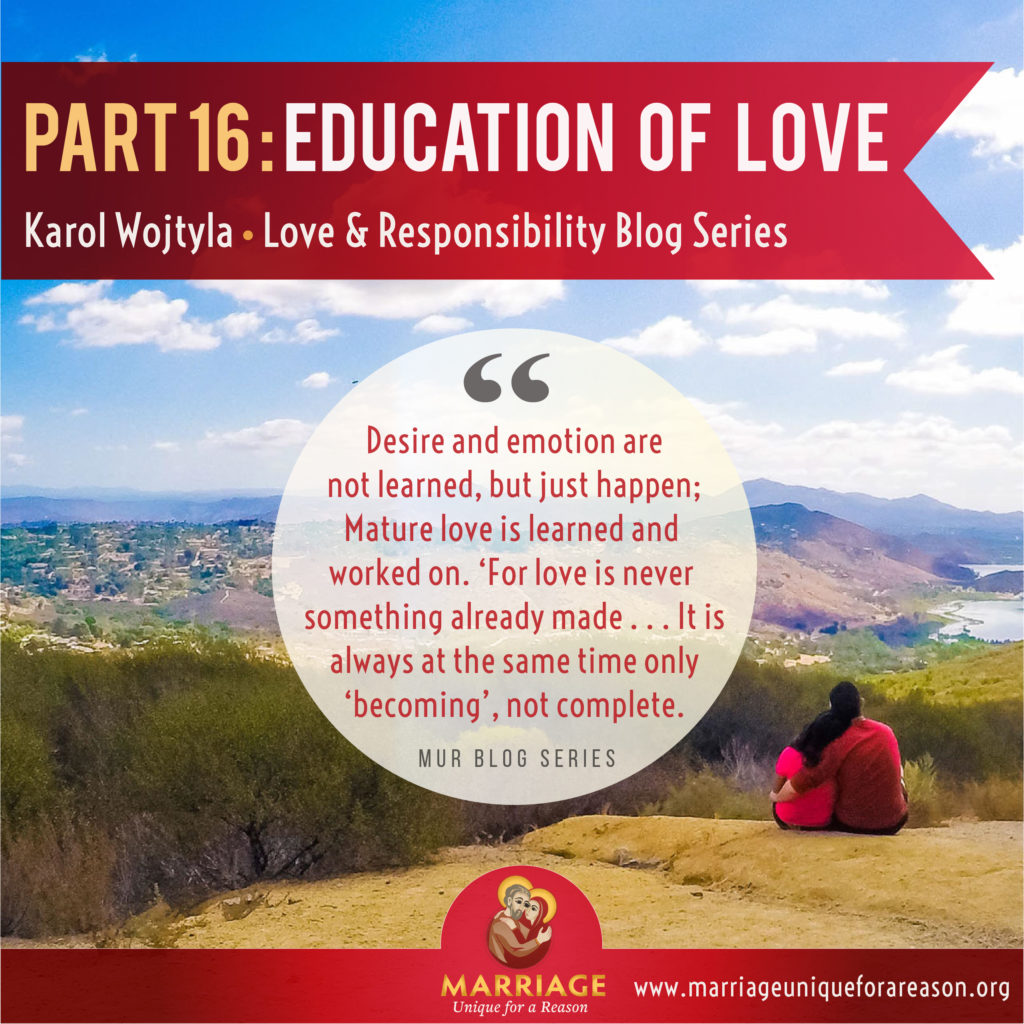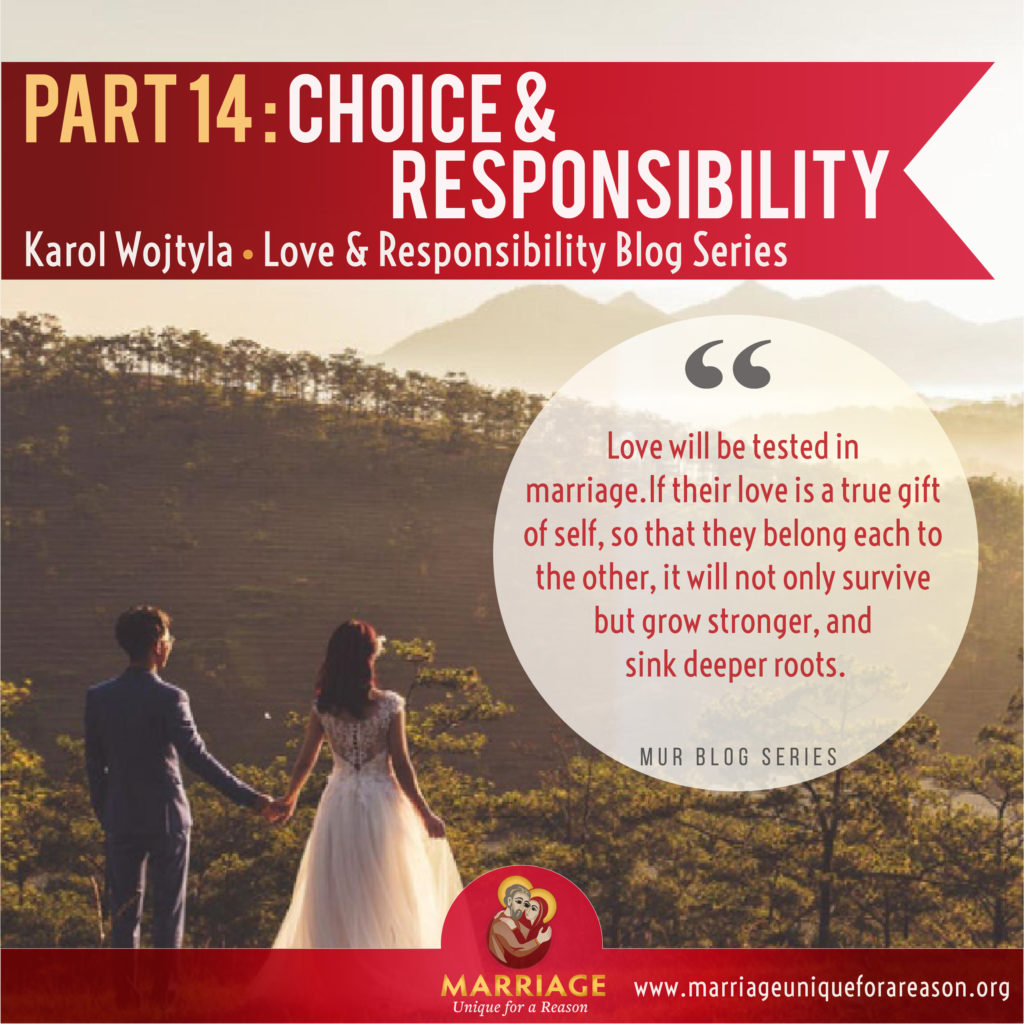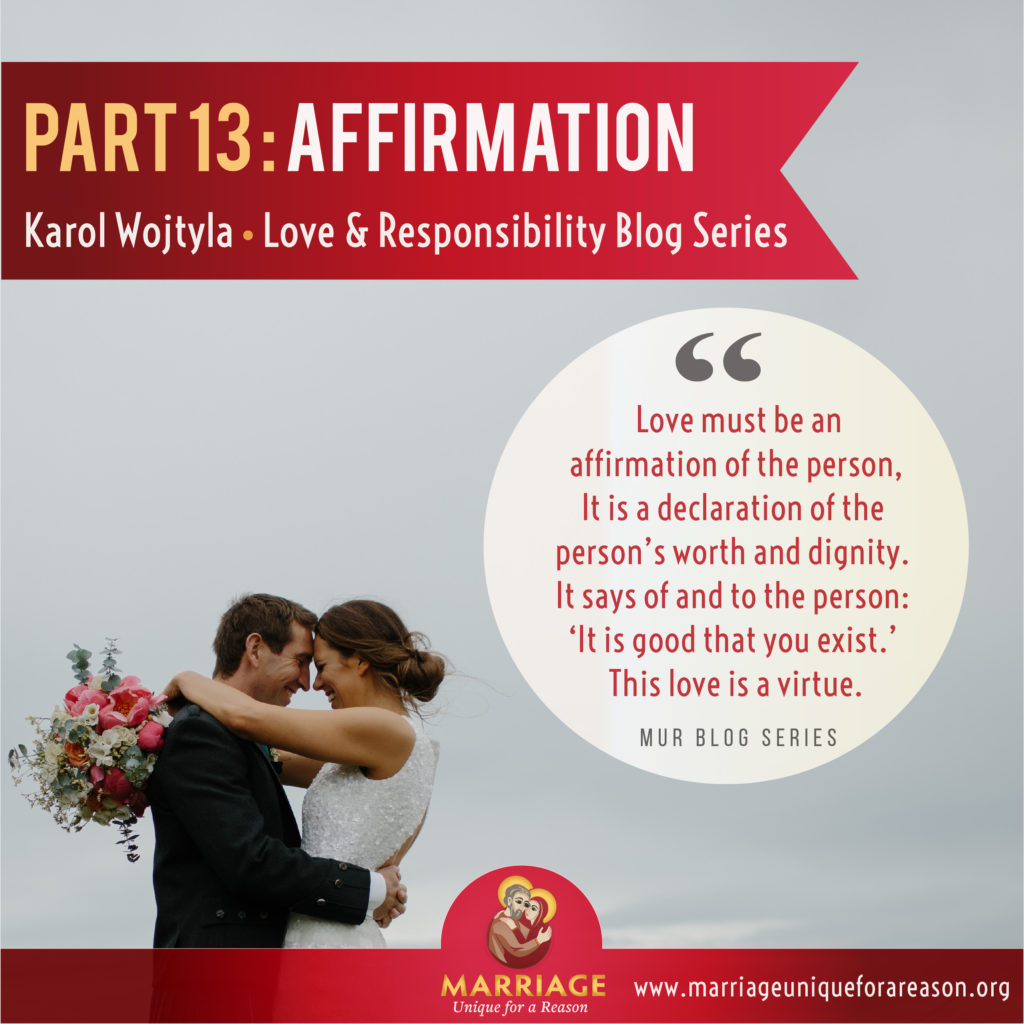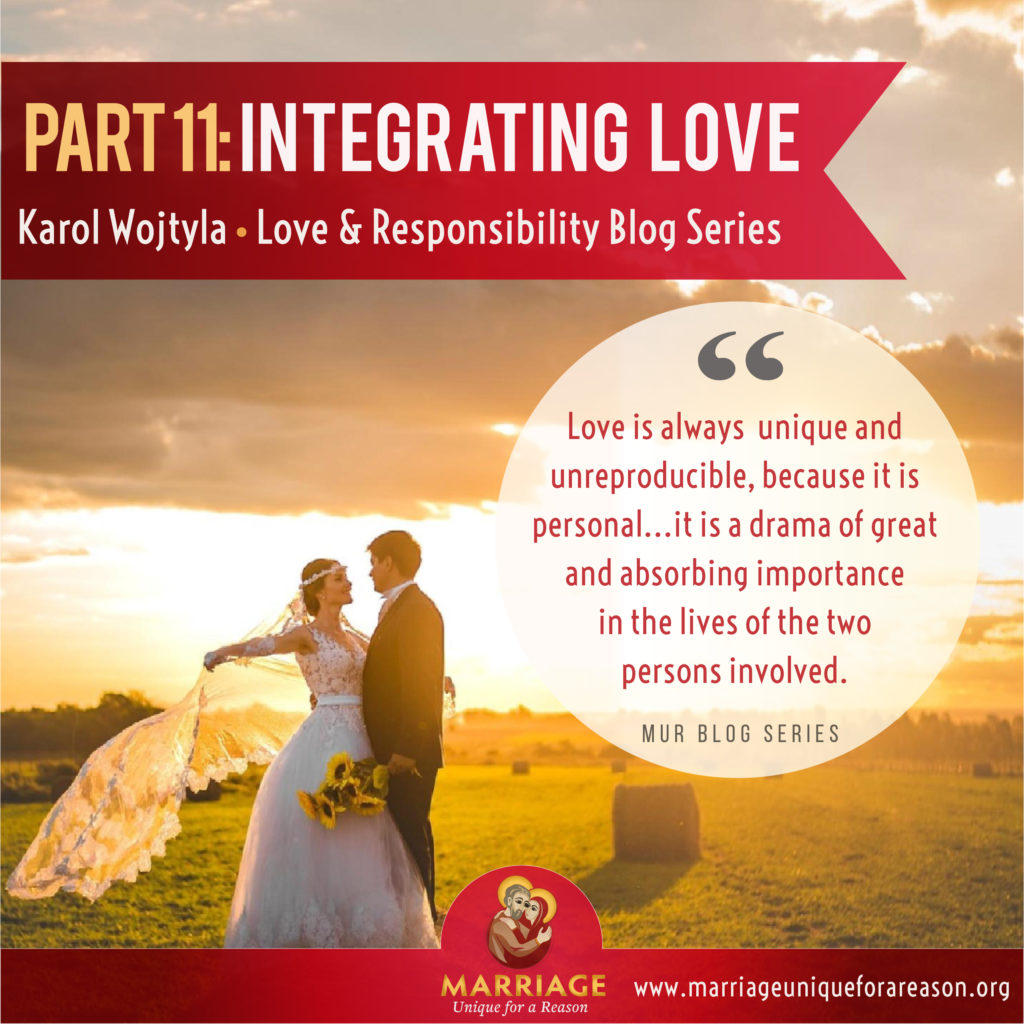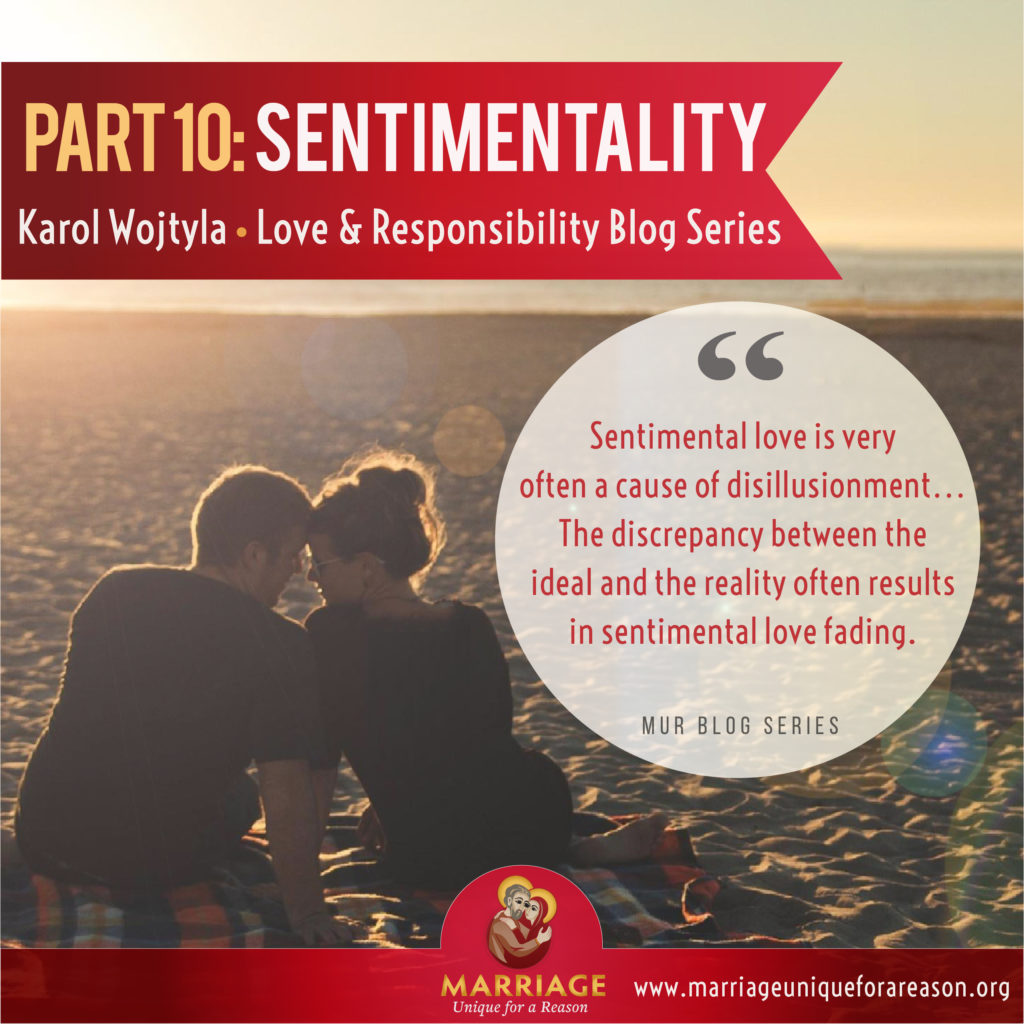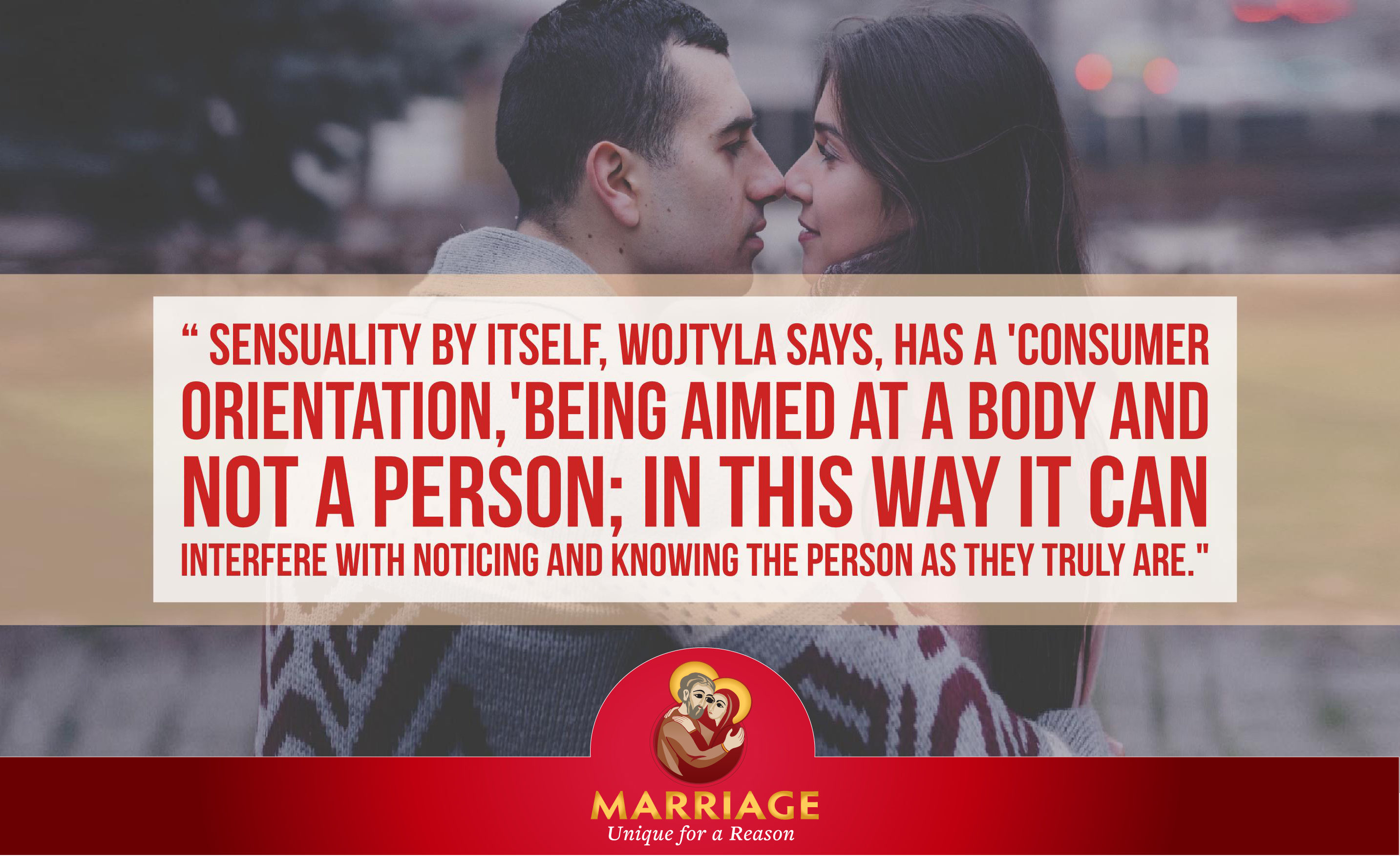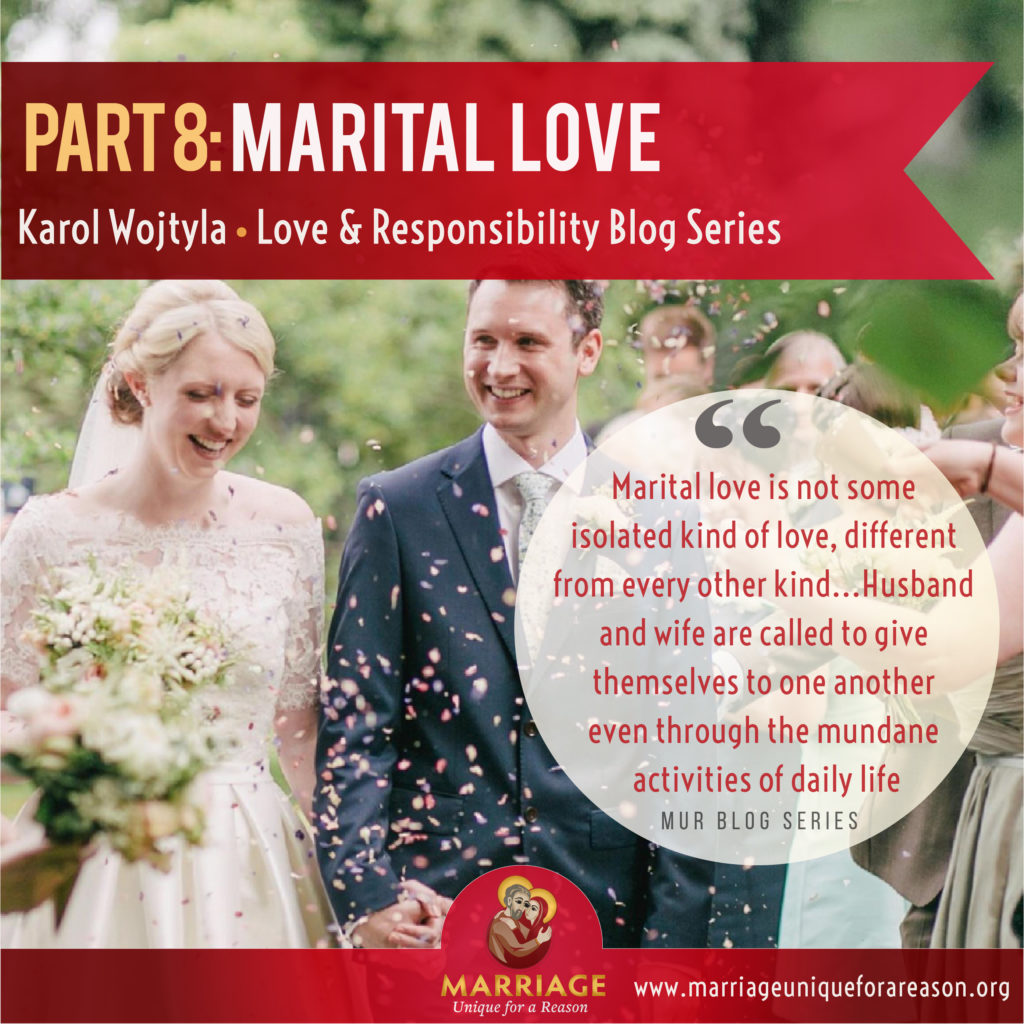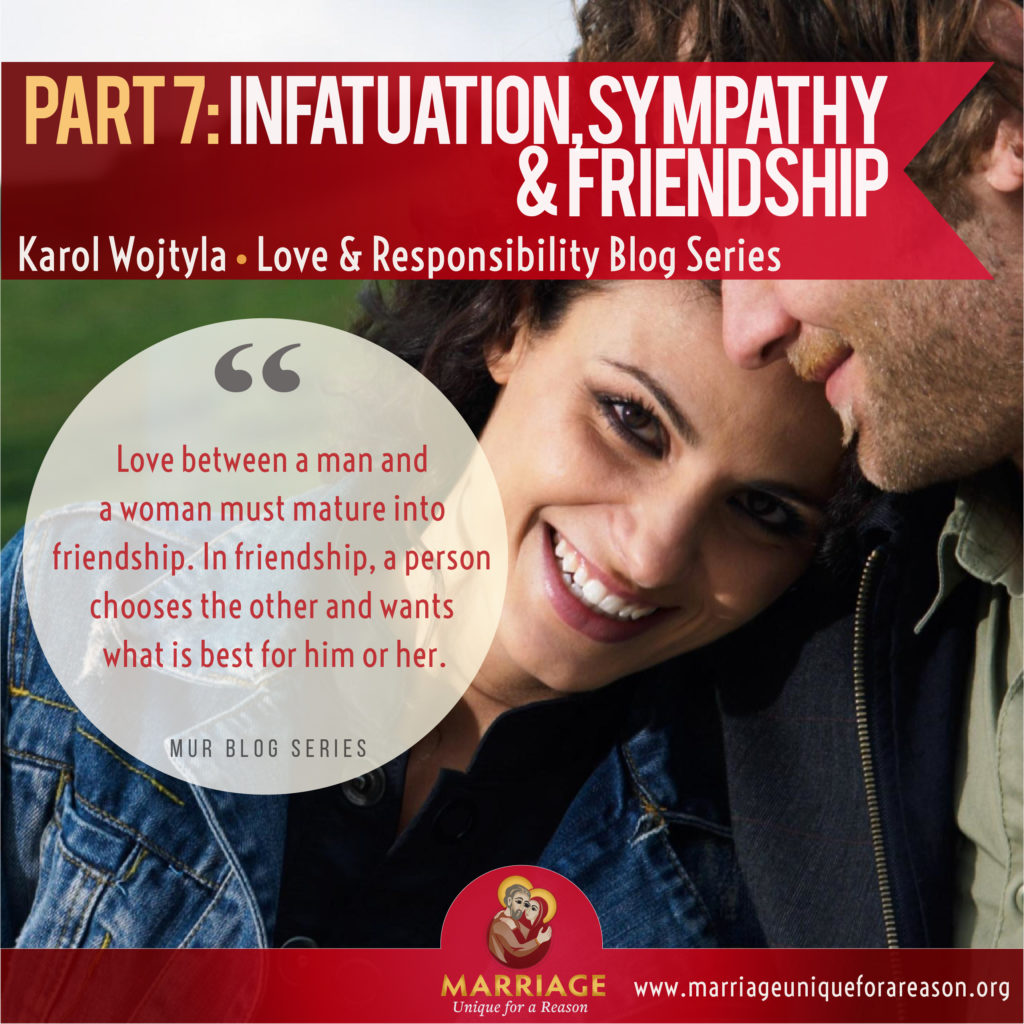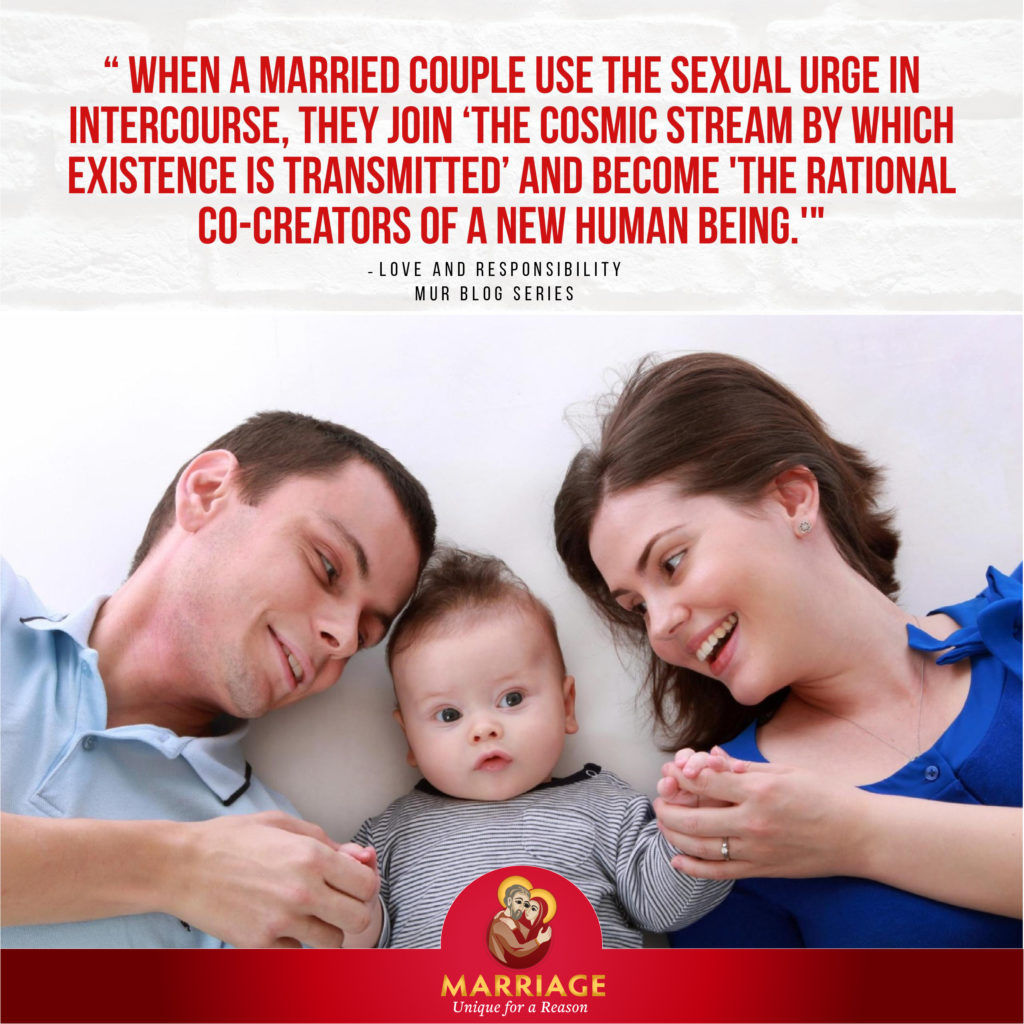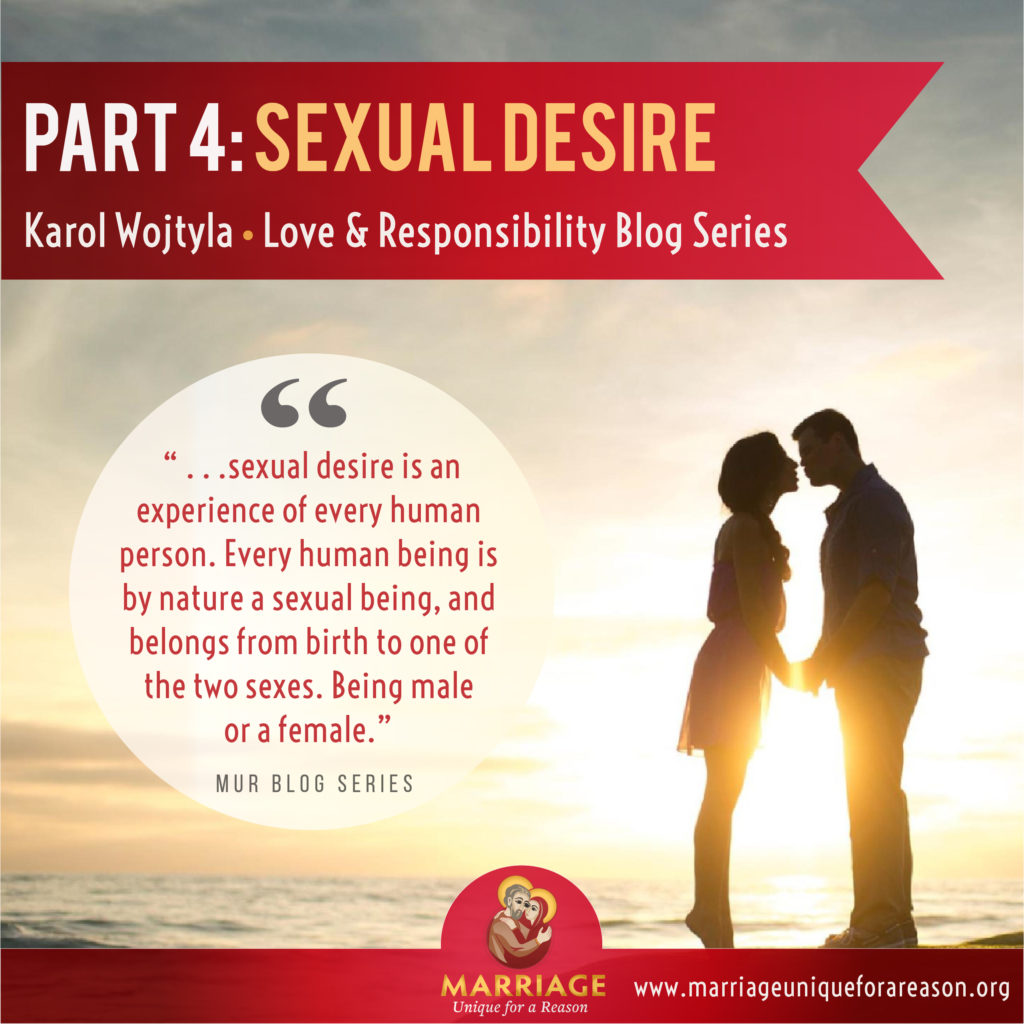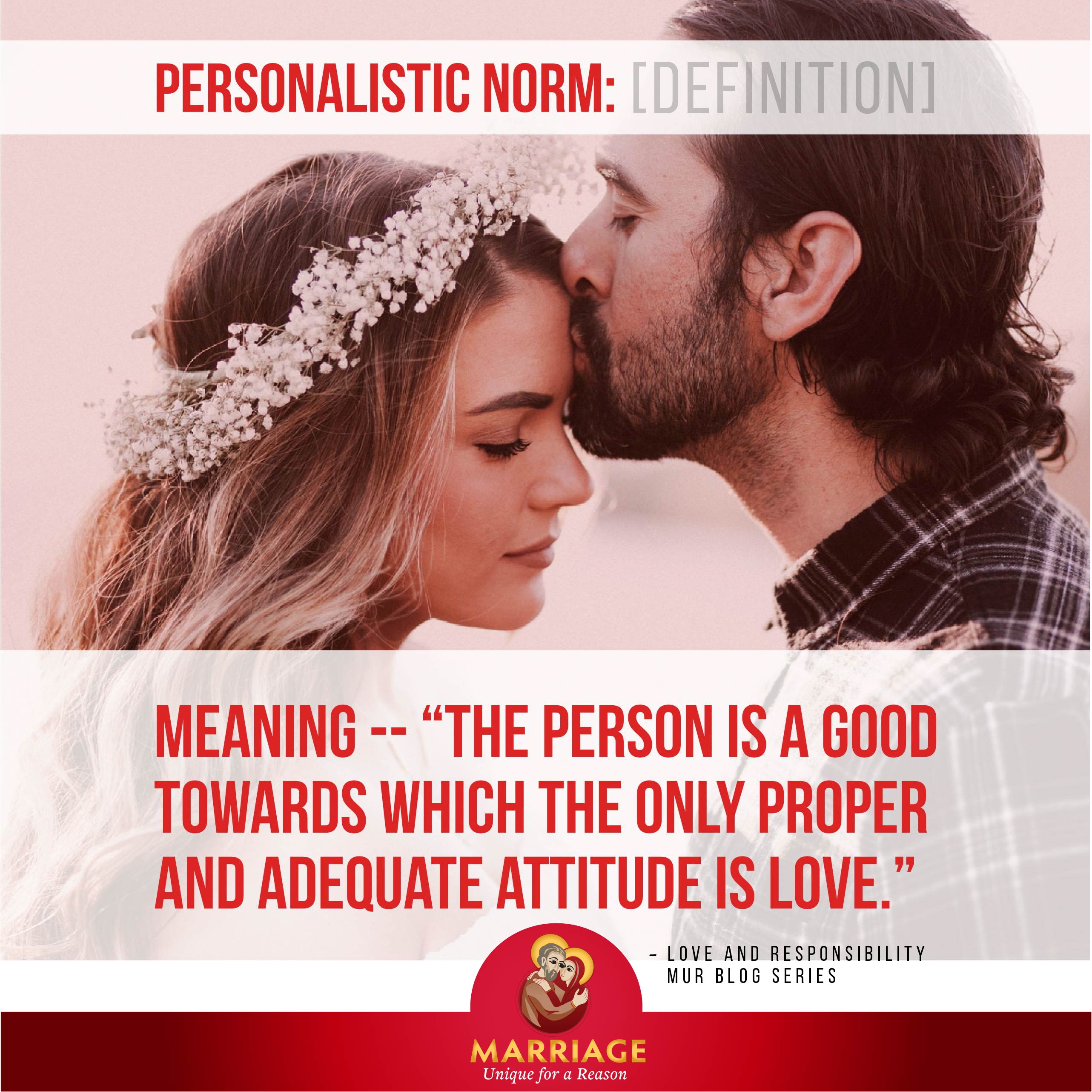The True Meaning of Chastity: Love and Responsibility (Post #21)
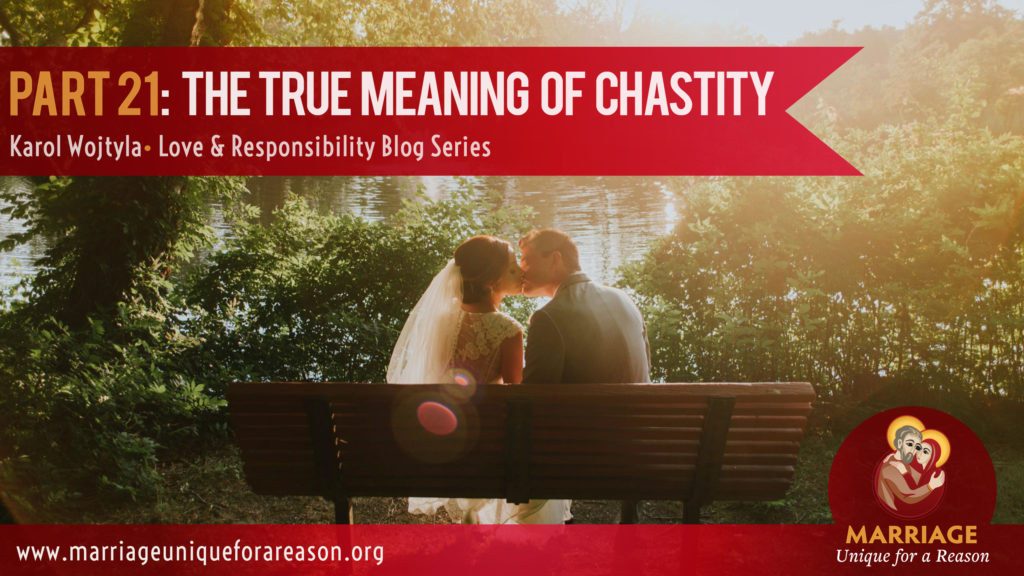 Note bene: This blog post includes a quote from the newer translation by Grzegorz Ignatik of Love and Responsibility—this translation is more readable and may be in some ways more faithful to the original, but the blog post author is most familiar with the H.T. Willets translation and that is why it has been used more!
Note bene: This blog post includes a quote from the newer translation by Grzegorz Ignatik of Love and Responsibility—this translation is more readable and may be in some ways more faithful to the original, but the blog post author is most familiar with the H.T. Willets translation and that is why it has been used more!
Chastity as Virtue:
Where does chastity fit in the general pursuit of virtue? This is what Wojtyla seeks to answer in this section of Love and Responsibility. Aquinas places chastity under the cardinal virtue of temperance[1], or moderation, by which reason moderates physical drives (for food, drink, and  sex). Thus for Aquinas, chastity, as a sub-virtue of moderation, is having control over one’s sensual desire, such that the person is in a more or less permanent state of control (in the will).
sex). Thus for Aquinas, chastity, as a sub-virtue of moderation, is having control over one’s sensual desire, such that the person is in a more or less permanent state of control (in the will).
Wojtyla asks, is that really the best way to think about chastity? As self-control? No, he argues, “There is no way to comprehend chastity without the virtue of love.”[i] The virtue of chastity cannot only consist in control over one’s impulses, but rather control of “those centres deep within the human being in which the utilitarian attitude is hatched and grows.”[ii] This is much harder, and much easier, than acquiring chastity as moderation. It’s harder because looking at yourself honestly and working to root out self-centeredness and a tendency to use others is the work of a lifetime. And yet, once you engage in this deeper work you are much less likely to fall into particular sins related to lust or emotional manipulation. A virtue makes doing what is right easy and joyful. It becomes “co-natural” and it is no longer a real question or temptation because the will is solidly grounded in the understanding of the value of the person.
Consider pornography, for example. There will always be external temptations to view pornography, but the man or woman who has internalized and gained the virtue of chastity does not experience these temptations in the same way that 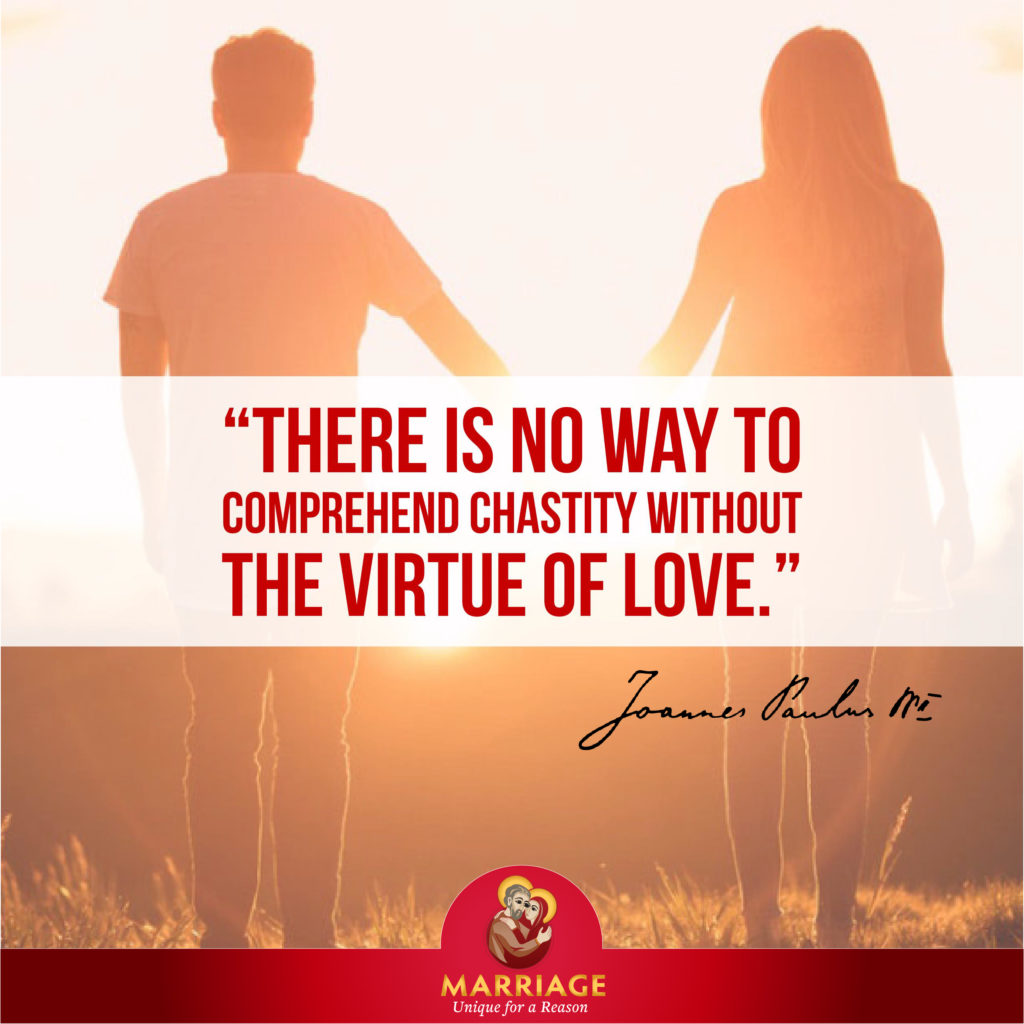 someone who does not have the virtue does. He or she knows in their mind that pornography degrades a human being, and has chosen with his or her will, over and over again, to reject it, such that pornography loses much of its power.[2]
someone who does not have the virtue does. He or she knows in their mind that pornography degrades a human being, and has chosen with his or her will, over and over again, to reject it, such that pornography loses much of its power.[2]
The Goodness of the Whole Person:
“To be chaste,” Wojtyla writes, “means to have a ‘transparent’ attitude to a person of the other sex… the desire to ‘enjoy’ is subordinated to a readiness to show loving kindness in every situation.”[iii] Wojtyla reiterates that chastity does not mean “artificially banishing the values of the ‘body’ or more generally the values of sex to the subconscious, of pretending that they do not exist or at any rate have no effect.”[iv] That is not a good idea. As Wojtyla notes, this false idea of chastity lends itself to “explosions” of sexual desire after repression.[v] Such repression happens when one sees chastity only as a negative virtue (a “no”), “whereas it is above all the ‘yes’ of which certain ‘no’s’ are the consequence.”[vi] Chastity’s essence is 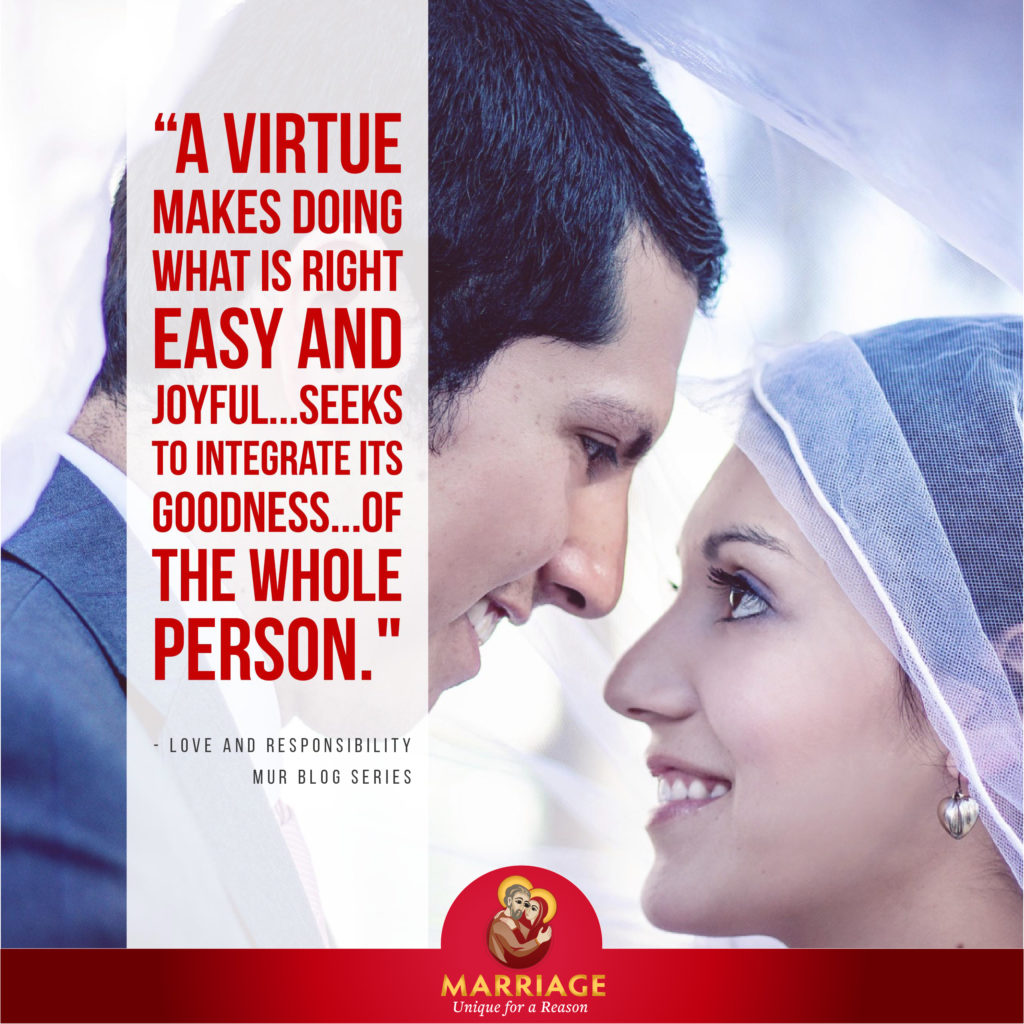 “quickness to affirm the value of the person in every situation and in raising to the personal level all reactions to the value of ‘the body and sex.’”[vii] It doesn’t push down the value of the body and sex, trying to smother it, but rather seeks to integrate its goodness into the knowledge of the goodness of the whole person. As Wendy Shalit wrote about modesty (a sub-virtue of chastity) in A Return to Modesty:
“quickness to affirm the value of the person in every situation and in raising to the personal level all reactions to the value of ‘the body and sex.’”[vii] It doesn’t push down the value of the body and sex, trying to smother it, but rather seeks to integrate its goodness into the knowledge of the goodness of the whole person. As Wendy Shalit wrote about modesty (a sub-virtue of chastity) in A Return to Modesty:
“Whether she decides to have scores of men or none, promiscuous
and prudish women in some sense embrace the same flippant world view,
which one might call the nothing-fazes-me world view. As types, they rep-
resent two sides of the same unerotic coin, which flips over arrogantly and
announces to the world when it lands, “Ha!—I cannot be moved.” Modesty
is prudery’s true opposite, because it admits that one can be moved and
issues a specific invitation for one man to try.”[viii]
If sexual reactions were always bad or undesirable, how could marriage be considered good or holy? “True chastity does not lead to disdain for the body or to disparagement of matrimony and the sexual life,”[ix] Wojytla writes. “That is the result of false chastity, chastity with a tinge of hypocrisy, or, still more frequently, of unchastity.”[x] A person who has not integrated their sexual reactions into a deeper affirmation of the person will see all sexual reactions as ‘dirty.’ “Thus only the chaste man and the chaste woman are capable of true love.”[xi] Chastity frees a couple from using each other and gives them the ability to love in their marital 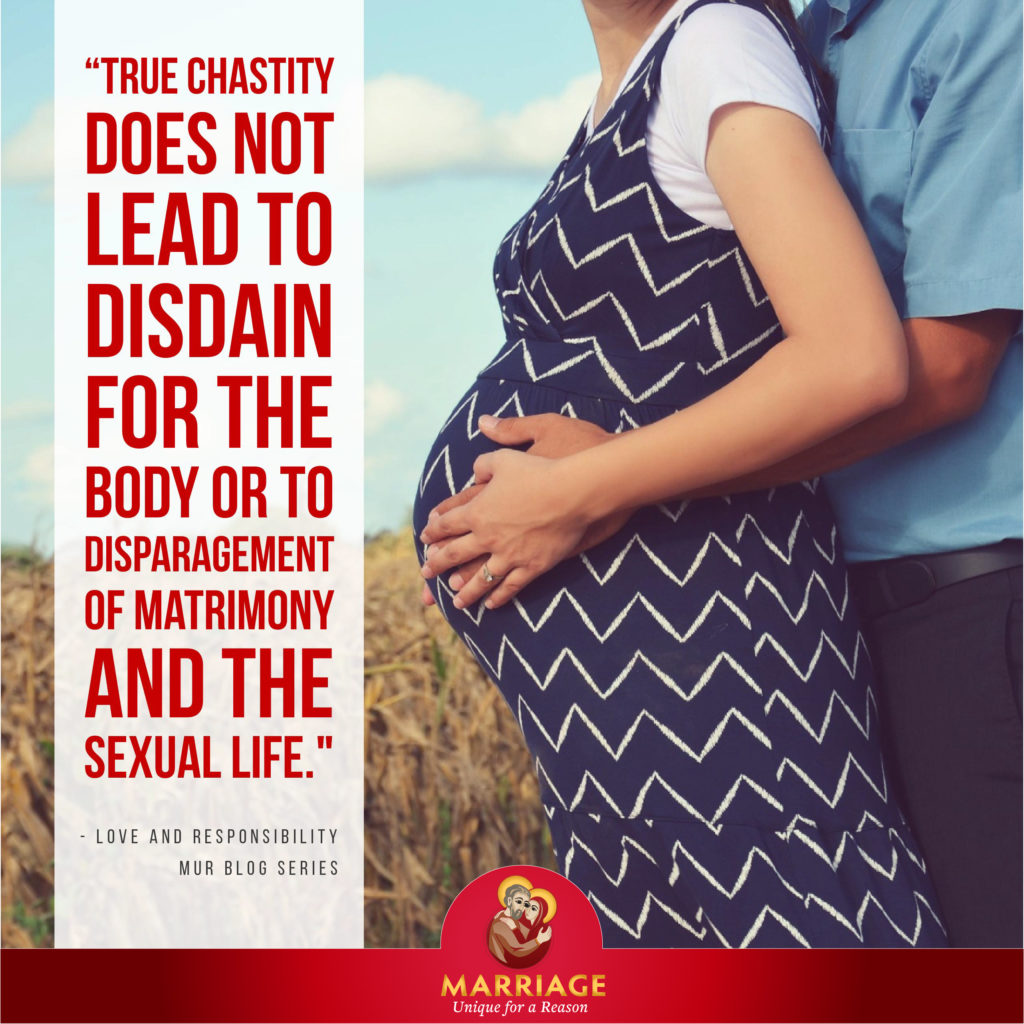 sexual relationship.[xii] This requires maturity of many kinds, since concupiscence remains. “For this reason, chastity is a difficult, long term matter; one must wait patiently for it to bear fruit.”[xiii]
sexual relationship.[xii] This requires maturity of many kinds, since concupiscence remains. “For this reason, chastity is a difficult, long term matter; one must wait patiently for it to bear fruit.”[xiii]
Finally, Wojytla writes about the “humility of the body,” which he asserts is necessary for love.[xiv] “The human body must ‘humble itself’ in face of the magnitude represented by love… subordinate itself [to love].”[xv] Instead of the person striving to satisfy the body’s desires, the chaste person basically says to the body, “Not so fast! This is a person, and he/she is a child of God, destined for heaven.” Thus the body is subordinated to the ultimate happiness of the person. For, “Blessed are the pure in heart, for they shall see God” (Mt. 5:8).
[1] If you need a little refresher, the cardinal virtues are the four “big” virtues, under which other virtues fall. They are prudence, temperance, justice, and fortitude.
[2] This is one of the reasons that early exposure to pornography is so harmful to the person—it snatches away, if you will, the innocent period of time when a child sees everyone as a human person first and only later as a sexual body, and makes it that much harder to develop chastity and a proper view of the human person.
[i] Karol Wojtyla. Love and Responsibility (Boston: Pauline Books and Media, 2013), p. 154.
[ii] Wojtyla, Karol. Love and Responsibility (San Francisco: Ignatius Press, 1993), p. 170.
[iii] Ibid, p. 170.
[iv] Ibid, p. 170.
[v] Ibid, p. 170.
[vi] Ibid, p. 170.
[vii] Ibid, p. 171.
[viii] Wendy Shalit. A Return to Modesty (New York: Touchstone, 1999), p. 182.
[ix] Ibid, p. 171.
[x] Ibid, p. 171.
[xi] Ibid, p. 171.
[xii] Ibid, p. 171.
[xiii] Ibid, p. 172.
[xiv] Ibid, p. 172.
[xv] Ibid, p. 172.
Archive
The Challenge of Love: Love and Responsibility Series (Post #20)
 Integration of Love:
Integration of Love:
In this section of Love and Responsibility, Wojtyla analyzes what concupiscence is and what it’s not. It’s not a sin, but it is a challenge to the growth of mature love between a man and a woman. “Concupiscence is a consistent tendency to see persons of the other sex through the prism of sexuality alone, as ‘objects of potential enjoyment.’”[1] 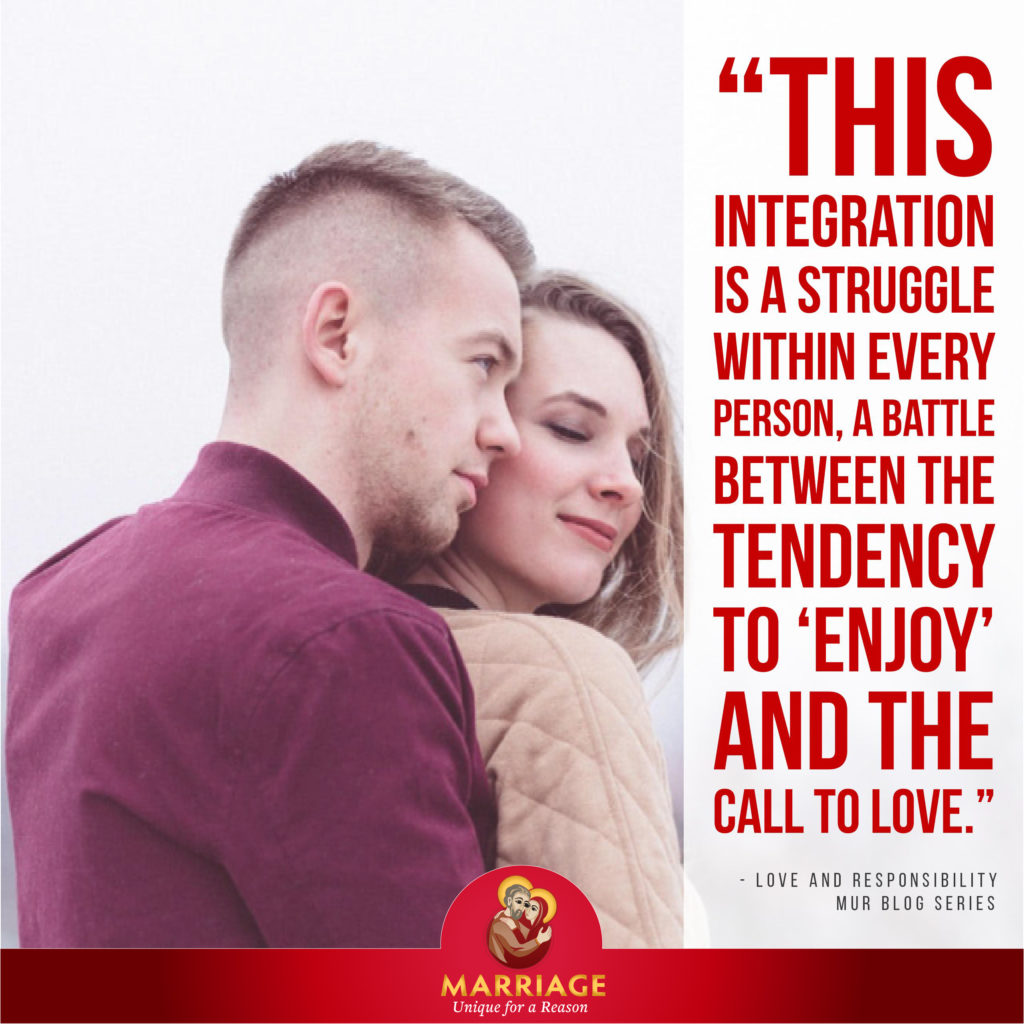 Wojtyla points out that overcoming this tendency does not mean becoming “a-sexual” or “blind to the value of ‘the body and sex,’” but rather that it is integrated into love of the person, the whole person, which includes his or her body.[2] (There’s a sweet song about this kind of integration called “You Wouldn’t Mind” by Colleen Nixon.)
Wojtyla points out that overcoming this tendency does not mean becoming “a-sexual” or “blind to the value of ‘the body and sex,’” but rather that it is integrated into love of the person, the whole person, which includes his or her body.[2] (There’s a sweet song about this kind of integration called “You Wouldn’t Mind” by Colleen Nixon.)
Wojtyla writes that this integration is a struggle within every person, a battle between the tendency to “enjoy” and the call to love. He emphasizes again that concupiscence is only the “germ of sin,” not sin itself, since it is not a choice.[3] Our reactions toward one another are “muddied” because of original sin, so that “it is not altogether safe to put one’s trust in the reactions of the senses” or emotions.[4] That is hard! We want to just relax and go with our desires and feelings, but that’s not always a good plan.
Concupiscence vs. Lust:
Wojtyla points out that because of original sin, human beings tend to desire others sexually even if they don’t “love” them at all—concupiscence pushes people in that direction. Therefore, for concupiscence to become lust, “passive acquiescence suffices.”[5] In other words, if one does not actively guard against lust (the sin), one will most likely lose the battle. Concupiscence will win. At the same time, one shouldn’t mistake concupiscence for the sin of lust. It’s the will that determines whether we sin or not. “As soon as the will consents,” Wojtyla writes, the desire becomes something that the person is “actively doing” rather than something that is “happening to” him or her.[6]
 Some people (perhaps all!) have a hard time finding that boundary between what is just happening in them and what they are choosing. Wojtyla says that since concupiscence pushes the human being toward lust, the person may mistake this push for the choice. But just because a person feels something doesn’t mean they will or choose it. In fact, “an act of the will directed against a sensual impulse does not generally produce any immediate result… [the sexual reaction] generally runs its full course even if it meets emphatic opposition in the sphere of the will.”[7] If you didn’t choose it, it’s not a sin.
Some people (perhaps all!) have a hard time finding that boundary between what is just happening in them and what they are choosing. Wojtyla says that since concupiscence pushes the human being toward lust, the person may mistake this push for the choice. But just because a person feels something doesn’t mean they will or choose it. In fact, “an act of the will directed against a sensual impulse does not generally produce any immediate result… [the sexual reaction] generally runs its full course even if it meets emphatic opposition in the sphere of the will.”[7] If you didn’t choose it, it’s not a sin.
So far in this section, Wojtyla has been focused on sensual reactions, but now he turns to emotions. He reiterates that love cannot be reduced to emotion and that sin comes when “the will puts emotion before the person.”[8] He notes that, “Authenticity of feeling is quite often inimical to truth in behavior.”[9] In the footnote to this statement, Wojtyla notes that one should treat one’s feelings, “with a certain distrust,” noting that often, someone’s being “true to their feelings” is used to justify bad actions, like leaving one’s spouse for another.[10] “The particular danger of ‘sinful love’ [lust] consists in a fiction: immediately, and before reflection, it is not felt to be ‘sinful,’ but is, above all, felt to be love… it makes the sin more dangerous.”[11]
Lust is dangerous because it is not experienced as what it is: wrong, a sin. The persons justify it by a false idea of love as emotion. Instead, the will must “demand of reason a correct vision of love and of the happiness which love can bring to a woman and a man.”[12] It is the will that guards the person against a “sinful love” and if the will guards one person, it simultaneously protects the other.
[1] Wojtyla, Karol. Love and Responsibility (San Francisco: Ignatius Press, 1993), p. 159.
[2] Ibid, p. 159.
[3] Ibid, p. 160.
[4] Ibid, p. 161.
[5] Ibid, p. 161.
[6] Ibid, p. 162.
[7] Ibid, p. 162.
[8] Ibid, p. 163.
[9] Ibid, p. 163.
[10] Ibid, p. 302.
[11] Ibid, p. 165.
[12] Ibid, p. 166.
Archive
Carnal Concupiscence: Love and Responsibility Series (Post #18)
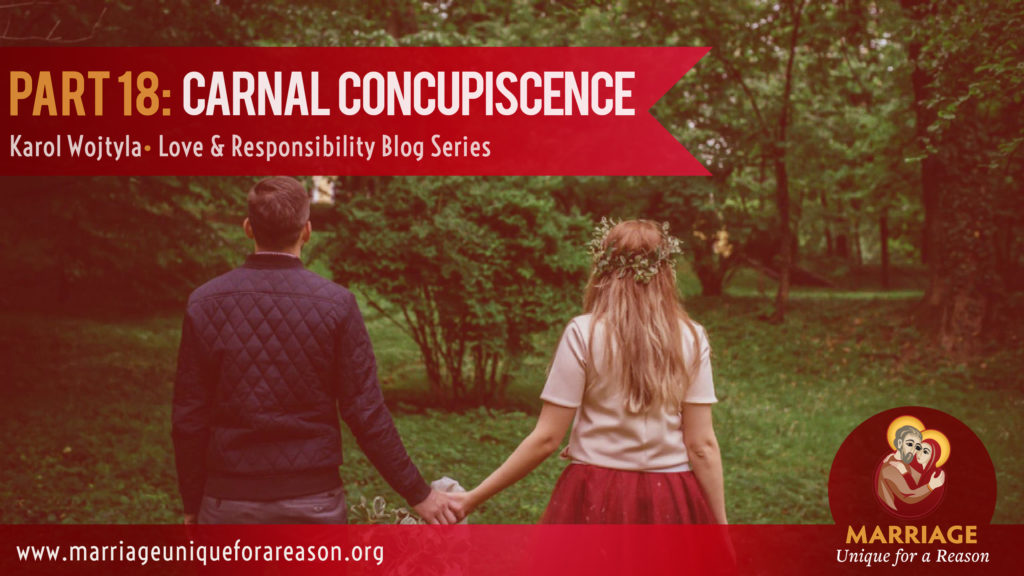
What is Carnal Concupiscence?
Wojtyla begins this section on carnal concupiscence (Definition: the tendency toward sin in the area of sexuality) in Love and Responsibility by noting that, in the relationship between man and woman, the subject of an action is a person of one sex and the object is the other sex, and “only love blurs this relationship,”[i]—i.e. the two persons see each other as “another self,” and therefore not a totally separate individuals. Even if the two persons really do feel like a “we,” a joint, single subject, “This feeling, however, does nothing to alter the objective fact that they are in reality two different 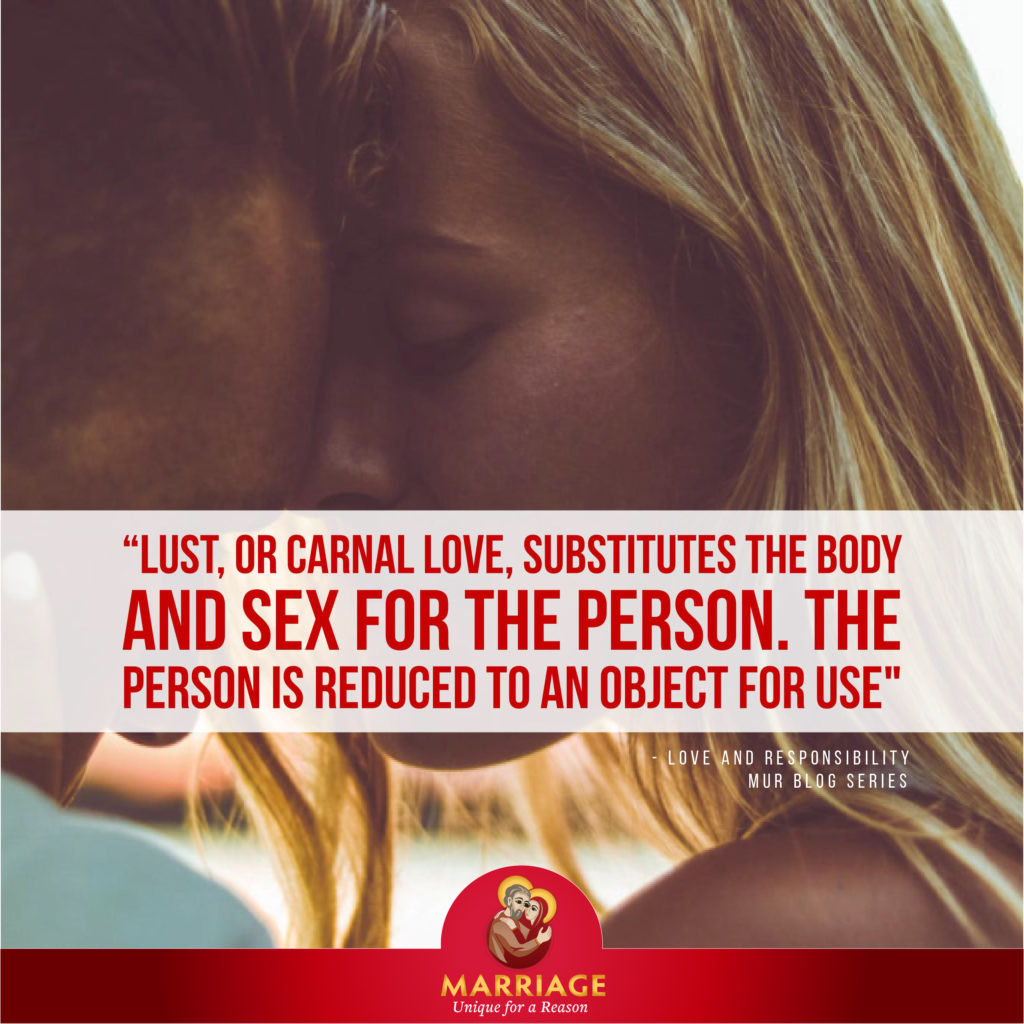 beings and two different subjects of action,”[ii] Wojtyla writes. Often the actions of each person affect the other in a way that is more intense than in friendship or other more casual relationships. Wojtyla uses the word “actions” here to include thoughts and feelings which are “internal actions” only known to the person him- or herself.
beings and two different subjects of action,”[ii] Wojtyla writes. Often the actions of each person affect the other in a way that is more intense than in friendship or other more casual relationships. Wojtyla uses the word “actions” here to include thoughts and feelings which are “internal actions” only known to the person him- or herself.
Wojtyla turns to the Ten Commandments, pointing out that the two Commandments that have to do specifically with the relationship of the sexes cover both external actions (“Thou shalt not commit adultery”) and internal actions (“Thou shalt not covet thy neighbor’s wife”). In both cases, the object of the action is a person of the other sex. Carnal concupiscence, Wojtyla writes, is closely related to sensuality but it is not the same. Sensuality is the first reaction to a body of the other sex, as a possible “object of enjoyment,” but this reaction is not a sin. Concupiscence, like lust, is in the second movement—the movement of the will—to actively seek enjoyment out of the other person. The “obvious ease”[iii] by which a person moves from a reaction to this choice “is the source of great tensions in the inner life of the person,”[iv] Wojtyla writes.
Does Sex always = Love?
Sensuality easily turns into concupiscence or lust; the body’s reaction pushes the person in that direction. Wojtyla turns here to the famous philosopher and theologian St. Thomas Aquinas, who distinguishes these two movements of the soul as desire and the urge to act. Our feelings tend toward one or the other (thirst is an example of desire, anger of an urge to act). When sexual desire, focused solely on a body, is taken into the will and embraced, that is lust. The lustful person seeks bodily pleasure without regard to the  person. In such a case, as soon as this person achieves the bodily release that he or she craves, his or her attitude toward the other person changes completely. Consider one night stands as one clear way that this plays out in people’s lives. If Harry and Sally meet at a bar and “hook up,” it’s likely that Harry and Sally will look at each other very differently the next morning (or even just a short time later). “Sensuality is ‘expended’ in concupiscence,”[v] Wojtyla writes. If bodily desires are the only thing bringing two people together, and those desires are satisfied (at least temporarily) by the sexual act, then the two persons no longer have any reason to be together afterwards. This is normal in the animal world but a serious moral problem for human beings.
person. In such a case, as soon as this person achieves the bodily release that he or she craves, his or her attitude toward the other person changes completely. Consider one night stands as one clear way that this plays out in people’s lives. If Harry and Sally meet at a bar and “hook up,” it’s likely that Harry and Sally will look at each other very differently the next morning (or even just a short time later). “Sensuality is ‘expended’ in concupiscence,”[v] Wojtyla writes. If bodily desires are the only thing bringing two people together, and those desires are satisfied (at least temporarily) by the sexual act, then the two persons no longer have any reason to be together afterwards. This is normal in the animal world but a serious moral problem for human beings.
Lust, or carnal love, substitutes the body and sex for the person. The person is reduced to an object for use. The persons may feel love because of it— they may experience a powerful feeling of closeness and intimacy that comes from the release of hormones during sex—but this is a trick of nature. Lust drives people to have sex but it does not unite them as persons. Casual sex is not love but its opposite. It may even damage people’s capacity to love, since it teaches them to use others, to have a “consumer” attitude; to use and discard another human being.
Wojtyla notes that emotion (sentimentality) can act as one safeguard against carnal concupiscence or lust but it is not enough—the virtue of chastity is the only real security against being used and using others.
[i] Wojtyla, Karol. Love and Responsibility (San Francisco: Ignatius Press, 1993), p. 147.
[ii] Ibid, p. 147.
[iii] Ibid, p. 148.
[iv] Ibid, p. 148.
[v] Ibid, p. 149.
Archive
The Education of Love: Love and Responsibility Series (Post #16)
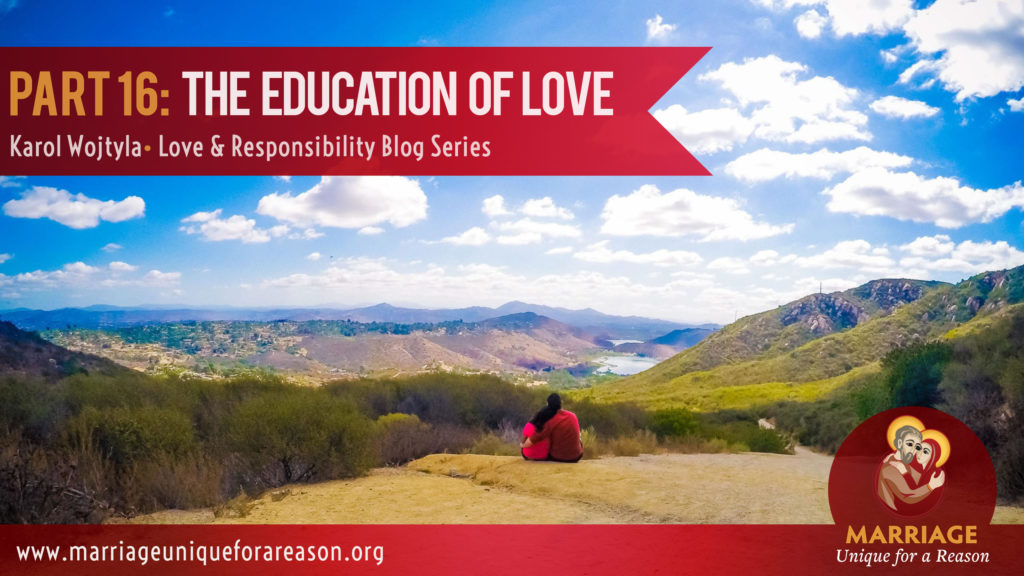
Mature Love is Learned:
Young people may scoff, Wojtyla notes in this section of Love and Responsibility, at the idea that love must be educated, or learned. But the love that a scoffer is are thinking of is the psychological aspect of love, its emotions and desires, not the  mature love on which a marriage should be based. Desire and emotion are not learned, but just happen; Mature love is learned and worked on. “For love is never something ready made, something merely ‘given’ to man and woman,” Wojtyla writes, “It is always at the same time a ‘task’ which they are set.”[1] Love is like a mission, “Should you choose to accept it” (Mission Impossible). Wojtyla writes that love is always “only ‘becoming’,”[2] not complete. The couple can never brush their hands together and declare, “Okay, now we love each other perfectly! What shall we do next?”
mature love on which a marriage should be based. Desire and emotion are not learned, but just happen; Mature love is learned and worked on. “For love is never something ready made, something merely ‘given’ to man and woman,” Wojtyla writes, “It is always at the same time a ‘task’ which they are set.”[1] Love is like a mission, “Should you choose to accept it” (Mission Impossible). Wojtyla writes that love is always “only ‘becoming’,”[2] not complete. The couple can never brush their hands together and declare, “Okay, now we love each other perfectly! What shall we do next?”
Creators of Love:
Man and woman must continually be creators of their love. They may be given, by God, their past experience, and their natural inclinations, the raw material of attraction or infatuation, but they must make their love by choosing it, over and 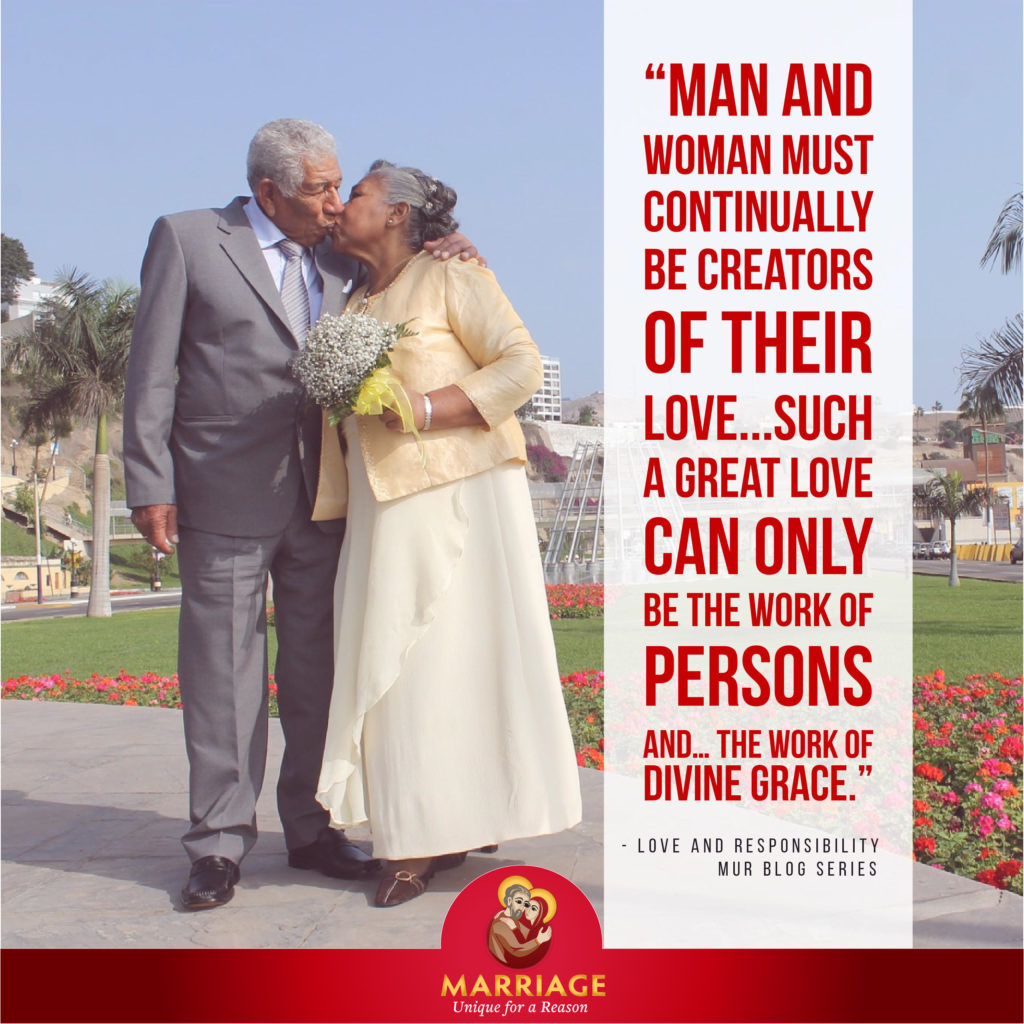 over. Love takes work and it is not easy. “Such a great love can only be the work of persons and… the work of Divine Grace.”[3] Wojtyla notes that sometimes love “follows tortuous ways,” but, “Grace has the power to make straight the paths of human love.”[4] This is the hope that couples can cling to in difficult times. God is with them.
over. Love takes work and it is not easy. “Such a great love can only be the work of persons and… the work of Divine Grace.”[3] Wojtyla notes that sometimes love “follows tortuous ways,” but, “Grace has the power to make straight the paths of human love.”[4] This is the hope that couples can cling to in difficult times. God is with them.
Wojtyla concludes his “Ethical Analysis of Love” here by noting that there is, in the relationship and man and woman, “an insidious possibility of disintegration”[5] (i.e. separation of the desires and emotions from the real choice of the person) which must be countered by developing the virtue of chastity. This is the topic of the next chapter. 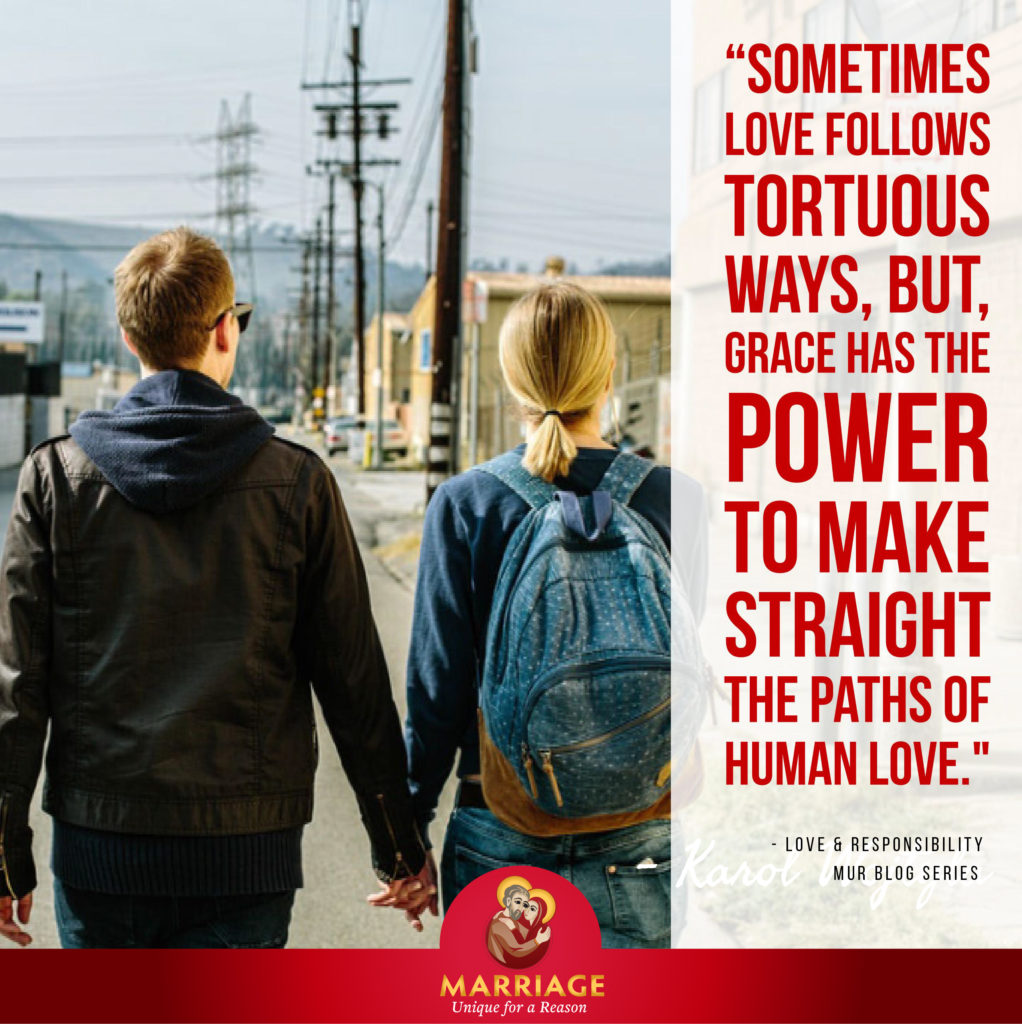
[1] Wojtyla, Karol. Love and Responsibility (San Francisco: Ignatius Press, 1993), p. 139.
[2] Ibid, p. 139.
[3] Ibid, p. 140.
[4] Ibid, p. 140.
[5] Ibid, p. 140.
Archive
Commitment: Love and Responsibility Series (Post #15)

True knowledge for True Love
“Only true knowledge of a person makes it possible to commit one’s freedom to him or her,”[i] Wojtyla writes at the beginning of this section of Love and Responsibility. While giving up or limiting one’s freedom sounds unpleasant (especially to American ears), Wojtyla notes that, “Freedom exists for the sake of love.”[ii] In fact, human beings want to use their freedom to love—and not just to love for a little while but to love in a permanent, irrevocable way. “Forever” is implicit in “I love you,” not something added on. If someone said, “I love you today, but I’m not sure about tomorrow,” the other person would rightly respond, “Then you don’t love me at all.”
Wojtyla notes that the choice of loving another person—keeping in mind that love is the affirmation of the person—must be free. It cannot be made out of coercion or even passion. Wojtyla says that a person’s will “is usually the arena for a struggle  between the sexual instinct and the need for freedom.”[iii] Someone may have to conciously struggle against their bodily desires and emotions in order to see the other person clearly and to treat them as a person, not an object. “Willed love expresses itself above all in the desire of what is good for the beloved person,”[iv] Wojtyla writes.
between the sexual instinct and the need for freedom.”[iii] Someone may have to conciously struggle against their bodily desires and emotions in order to see the other person clearly and to treat them as a person, not an object. “Willed love expresses itself above all in the desire of what is good for the beloved person,”[iv] Wojtyla writes.
Focused on Oneself vs. Focused on the Other
While sexual desire and infatuation, even though they involve another person, are focused on oneself, the will can focus on the other. One can can desire happiness for the other in an unselfish way—and not just momentary happiness but the ultimate happiness of heaven. “[Love in the will] desires the absolute good, the unlimited good, happiness for that person, and in this way compensates and atones for the desire to have that other person, a person of the other sex, for itself.”[v] Rather than denying that the body and emotions are driving someone toward relationships with the other person, the will acknowledges it and seeks to shape and form what is happening into mature love.
Sexual desire and emotional infatuation want to take; love wants to give. This is the “divine aspect of love,”[vi] the fact that to love someone, “is really to desire God for that person.”[vii] In your relationships, can you say that you desire God for 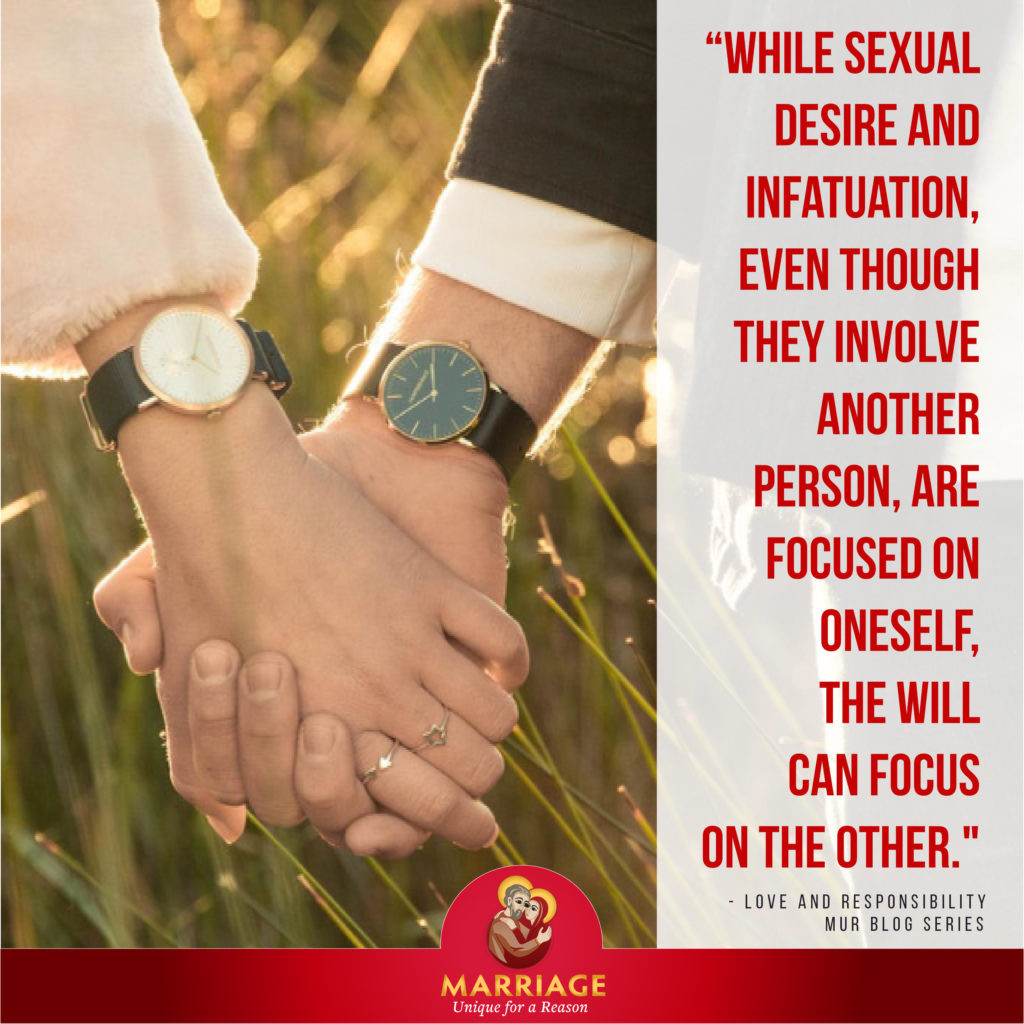 the other person? Wojtyla notes that “only people of profound faith”[viii] see this truth. Wojtyla notes that it is sometimes a great discovery when a person realizes that he can put another person first, freely and joyfully. A person who loves may sacrifice much without thinking too much about it. Think of parents who constantly put their children’s needs before their own. “Love is indeed the highest of moral values. but one must know how to transfer it to the ordinary affairs of everyday life. This is where the problem of educating love arises.”[ix] This ability to love in action shows a person’s capacity for greatness, but this greatness is often manifested in small gestures of tenderness or sacrifice: getting up before one’s spouse to start the coffee, complimenting him or her, etc. Marriage means doing “small things with great love” (as St. [Mother] Teresa of Calcutta would say).
the other person? Wojtyla notes that “only people of profound faith”[viii] see this truth. Wojtyla notes that it is sometimes a great discovery when a person realizes that he can put another person first, freely and joyfully. A person who loves may sacrifice much without thinking too much about it. Think of parents who constantly put their children’s needs before their own. “Love is indeed the highest of moral values. but one must know how to transfer it to the ordinary affairs of everyday life. This is where the problem of educating love arises.”[ix] This ability to love in action shows a person’s capacity for greatness, but this greatness is often manifested in small gestures of tenderness or sacrifice: getting up before one’s spouse to start the coffee, complimenting him or her, etc. Marriage means doing “small things with great love” (as St. [Mother] Teresa of Calcutta would say).
[i] Wojtyla, Karol. Love and Responsibility (San Francisco: Ignatius Press, 1993), p. 135.
[ii] Ibid, p. 135.
[iii] Ibid, p. 136.
[iv] Ibid, p. 137.
[v] Ibid, p. 137.
[vi] Ibid, p. 138.
[vii] Ibid, p. 138.
[viii] Ibid, p. 138.
[ix] Ibid, p. 139.
Archive
Choice and Responsibility: Love and Responsibility Series (Post #14)

A Responsibility for One’s Own Love:
This part of Love and Responsibility is perhaps the crux of Wojtyla’s argument in the book—“Choice and Responsibility.” A human person has a “responsibility for one’s own love,” he says, and this responsibility is “immense.”[1] It is only recognized as such by someone who understands the value and worth of the human person—a person is a child of God, worth the blood of God’s Son! A person who knows this will be careful about how he or she approaches relationships. Wojtyla notes that a man (or a woman) who does not understand the worth and dignity of others, “will 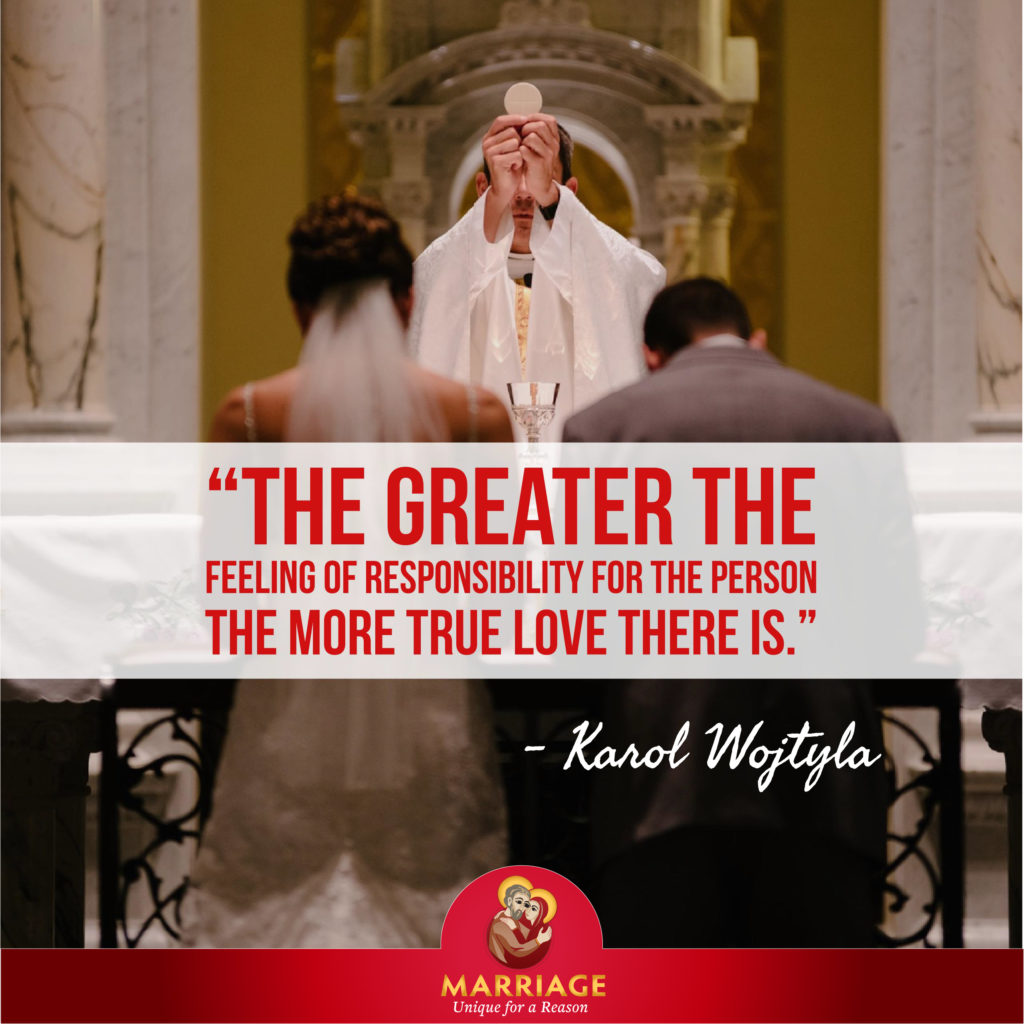 complicate his own life and that of others by letting the reality of love, its true ‘relish,’ escape him.”[2] Someone who never sees the deeper reality of what love is, is bound to hurt other people.
complicate his own life and that of others by letting the reality of love, its true ‘relish,’ escape him.”[2] Someone who never sees the deeper reality of what love is, is bound to hurt other people.
When I read the above, I think of my friend Sally’s[*] father. He left her and her mom when Sally was three; remarried and divorced again when Sally was in elementary school; remarried and divorced again when she was in college… to say that this man “complicated his own life and that of others” is perhaps an understatement. Sally was hurt by every one of those changes and reasonably questions whether marriage can ever be permanent, whether she ever wants to be married. Her father never seemed to care about the effects of his choices on his daughter. He is an example, to me, of a person who does not feel responsibility for other people. Wojtyla says, “The greater the feeling of responsibility for the person the more true love there is.”[3]
Relationships Involve Choices:
Relationships involve choices. Before a man and a woman can pledge their love to one another, “each face the choice of the person on whom to bestow the gift of self. Its consequences makes the choice a weighty matter.”[4] Marriage is (obviously) not a decision to be taken lightly. Dating and engagement ought to be a time of discernment, asking and then verifying that one’s choice of spouse is the right one. Choosing one’s partner in marriage, “is as though one were choosing another ‘I,’ 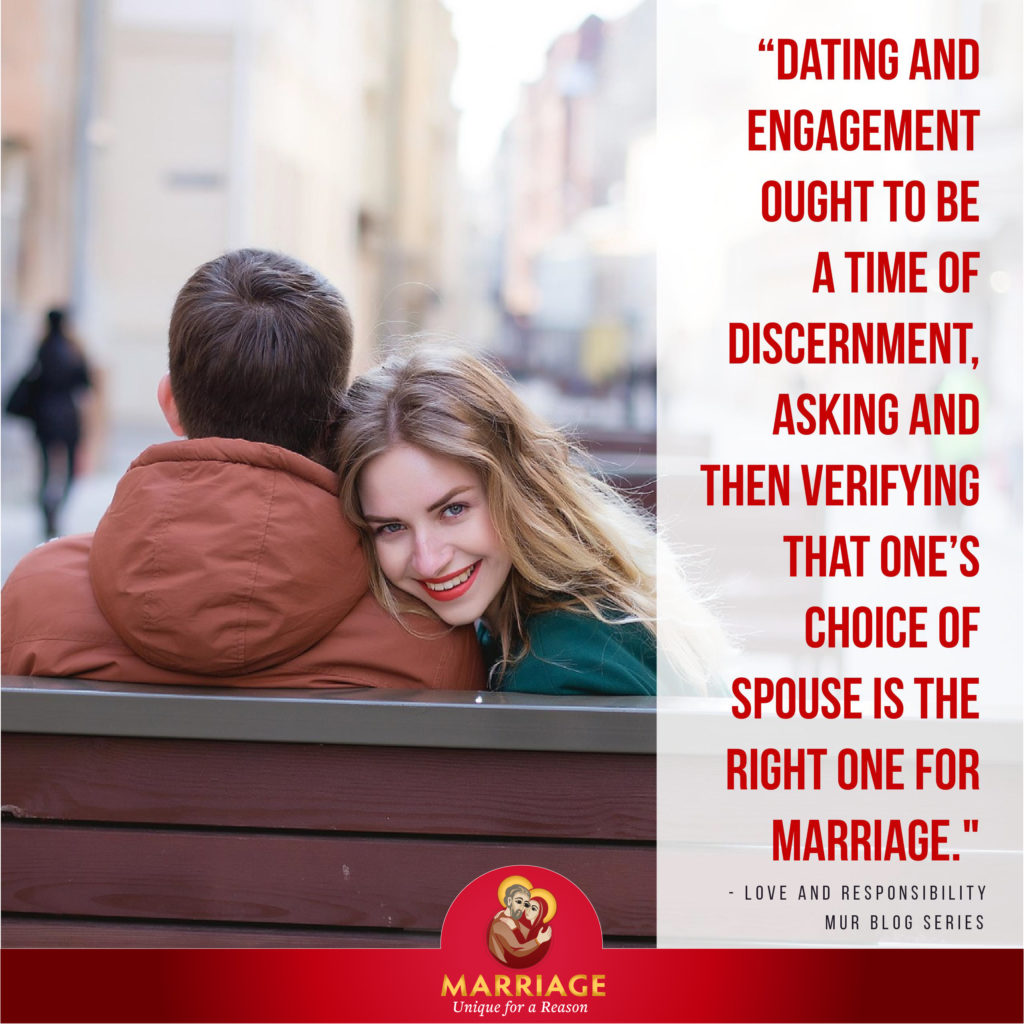 choosing oneself in another, and the other in oneself… in order not merely to live with another but to live by and for that other person, he must continually discover himself in the other and the other in himself.”[5] One’s spouse must be like another self.
choosing oneself in another, and the other in oneself… in order not merely to live with another but to live by and for that other person, he must continually discover himself in the other and the other in himself.”[5] One’s spouse must be like another self.
No one can really explain why one person chooses another, Wojtyla notes. Certainly sexual attraction plays a part, but only the choice of this person (not this body) can be considered valid for marriage. “True love is one in which we choose the person for the sake of the person,”[6] not for the sake of having sex, having children, or in order not to be alone. Whether one has chosen wisely will be discovered as time goes by. “Life will determine the value of a choice and the value and true magnitude of love.”[7]
Love and Marriage:
Love will be tested in marriage. Sexual interest may fade and fatigue set in; two people who once vowed to be all to one another may feel like strangers. “Nothing then remains except the value of the person, and the inner truth about the love of those concerned comes to light,” Wojtyla writes. “If their love is a true gift of self, so that they belong each to the other, it will not only survive but grow stronger, and sink deeper roots… only when love between human beings is put to the test can its true value be seen.”[8] If life was always easy, we would not really find out how real our love is.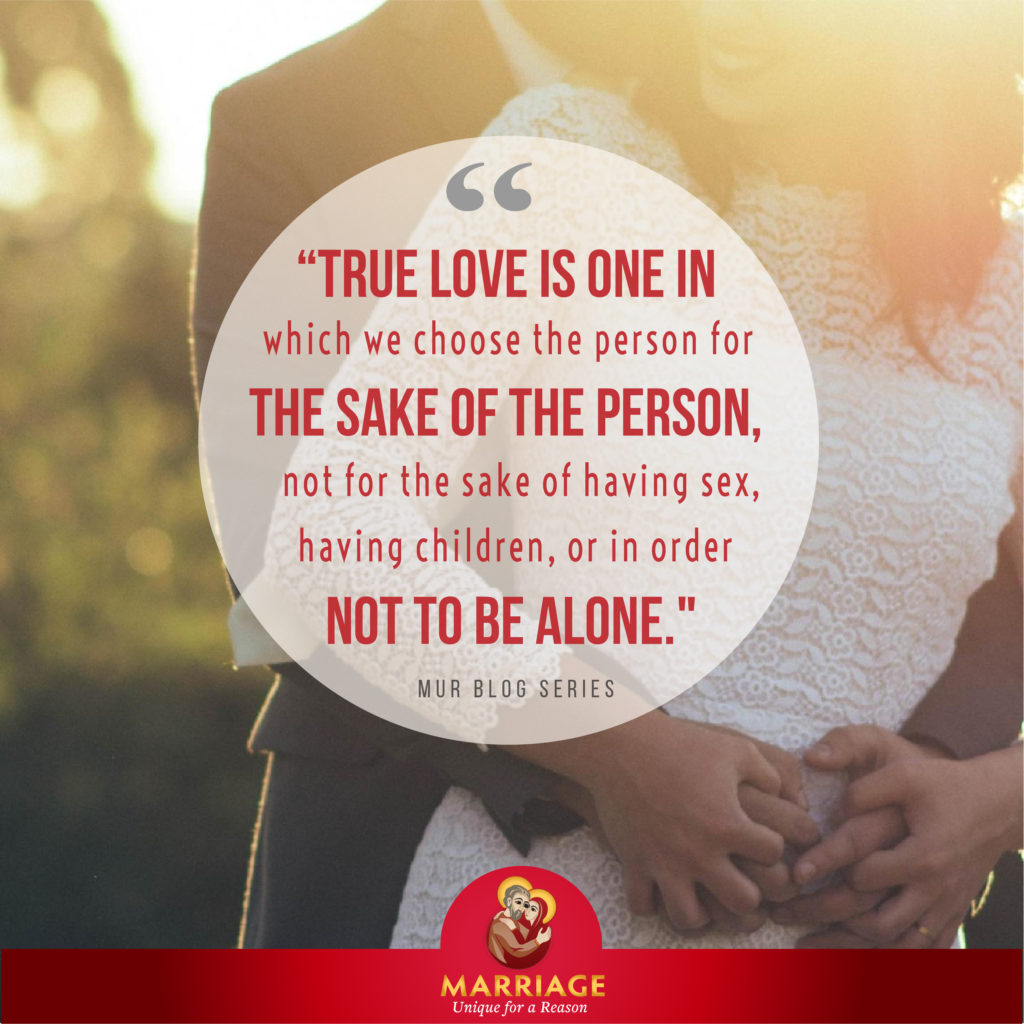
I see an elderly couple at Mass sometimes; the woman is in a wheelchair and she cannot speak. Her husband appears to take such good care of her, pulling her up to the front of the church, fixing her cardigan so that she won’t get cold, and smiling at people who come up to greet them. That is what true love looks like; it’s not easy, but it’s beautiful.
While emotions and desires change and fluctuate, a love which has matured within the subject frees itself from this anxiety by its choice of person.”[9] True love, based on the value of the person, “makes us feel emotional love for the person as he or she really is, not for the person of our imagination, but for the real person.”[10] At a certain level, this love is not dependent on the person’s virtues and lives on in spite of his or her faults. The strength of love shows itself most when the loved one fails in some way (makes mistakes, even sins). “One who truly loves does not then withdraw his love, but loves all the more, loves in full consciousness of the other’s shortcomings and faults, and without in the least approving of them. For the person as such never loses its essential value.”[11]
More on how this choice happens next time!
You can read ALL of MUR’s Love and Responsibility blog series in the link below: http://www.marriageuniqueforareason.org/category/love-and-responsibility/
[*] Not her real name.
[1] Wojtyla, Karol. Love and Responsibility (San Francisco: Ignatius Press, 1993), p. 130.
[2] Ibid, p. 130.
[3] Ibid, p. 131.
[4] Ibid, p. 131.
[5] Ibid, p. 131.
[6] Ibid, p. 134.
[7] Ibid, p. 134.
[8] Ibid, p. 134.
[9] Ibid, p. 134.
[10] Ibid, p. 135.
[11] Ibid, p. 135.
Archive
Affirmation: Love and Responsibility Series (Post #13)
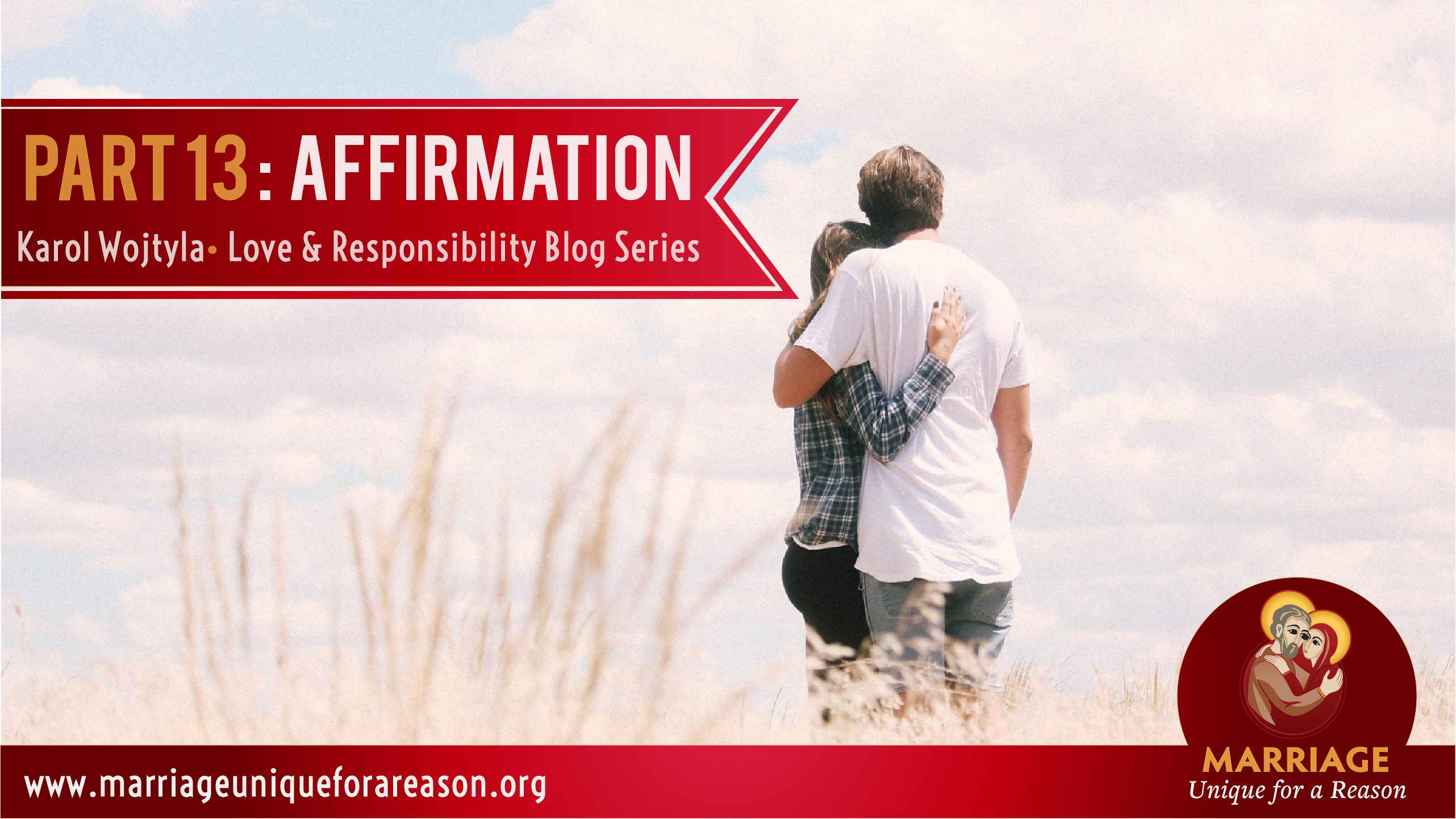
The Inherent Value of the Human Person
Karol Wojtyla reminds us in this section of Love and Responsibility that a person has worth beyond any other created thing or object in the world. A person has an inner life (spirit) and is capable of spiritual perfection (in heaven). The inherent value of every human person goes far beyond any quality that they may possess (such as beauty, brains, or brawn). [This is one reason that racism is clearly an evil, since it reduces the value of the person due to an accidental[i] quality.] The human person has unique dignity because he or she is made in God’s image and called to communion with him. 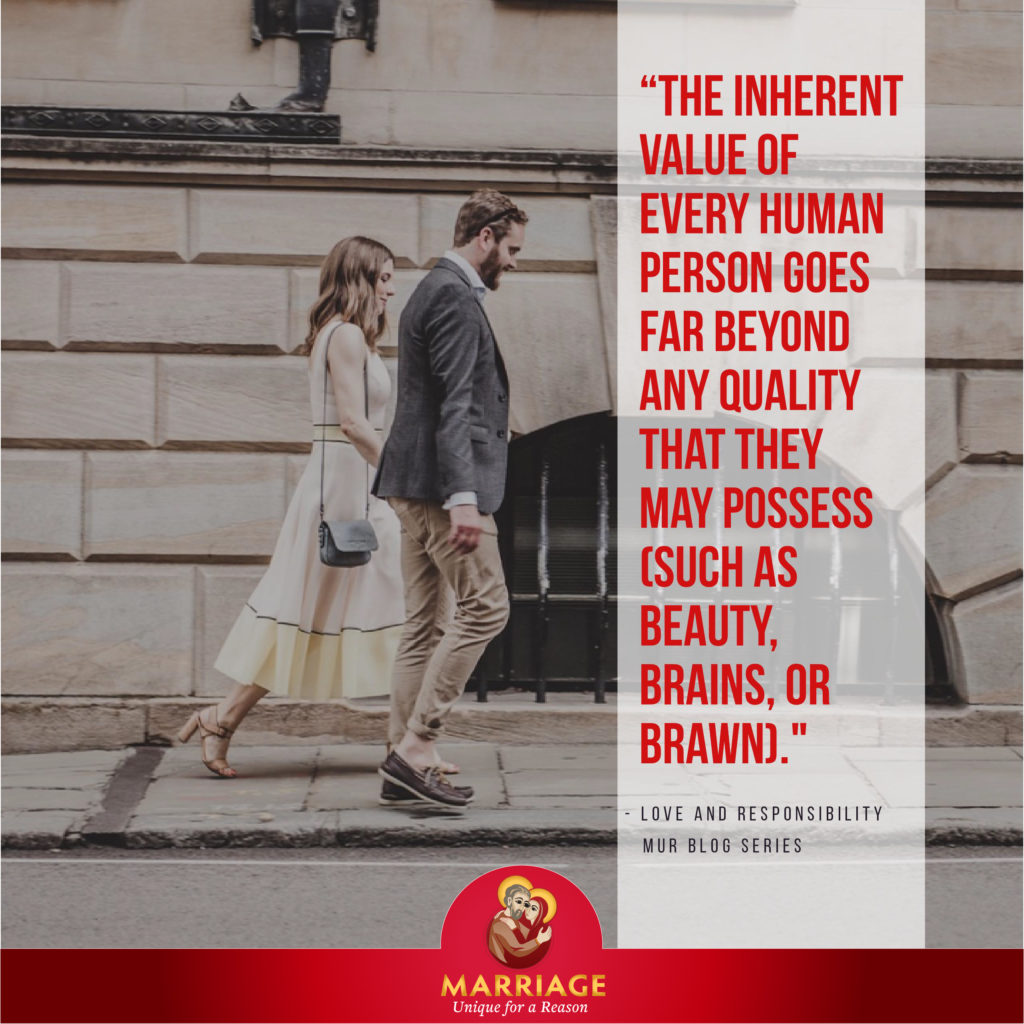
“That being so,” Wojtyla writes, “every person of the opposite sex possesses value in the first place as a person, and only secondarily possesses a sexual value.”[ii] Everyone is a person first, man or woman second. Experientially, when a man meets a woman, he typically sees her as a woman (and vice versa, when a woman meets a man, he registers as “male”) but the fact that the other is a person, “demands that the sensual and emotional reaction to a ‘human being of the other sex’ be somehow adjusted to the knowledge that the human being concerned is a person.”[iii] Harry isn’t just some kind of incarnation of maleness, and Sally isn’t just some beautiful piece of art to gaze at; they are persons whom God loves.
The Affirmation of the Person
Love must be an affirmation of the person, per Wojtyla; It is a declaration of the person’s worth and dignity. It says of and to the person: “It is good that you exist.” This love is a virtue, an “authentic commitment of the free will of one person… resulting from the truth about another person.”[iv] Affirmation of the person is connected with the other aspects of love (sensuality, emotion) but not reducible to them. The full truth of the person—with his or her faults and weaknesses as well as virtues and gifts—must be seen and accepted by the one who truly loves. 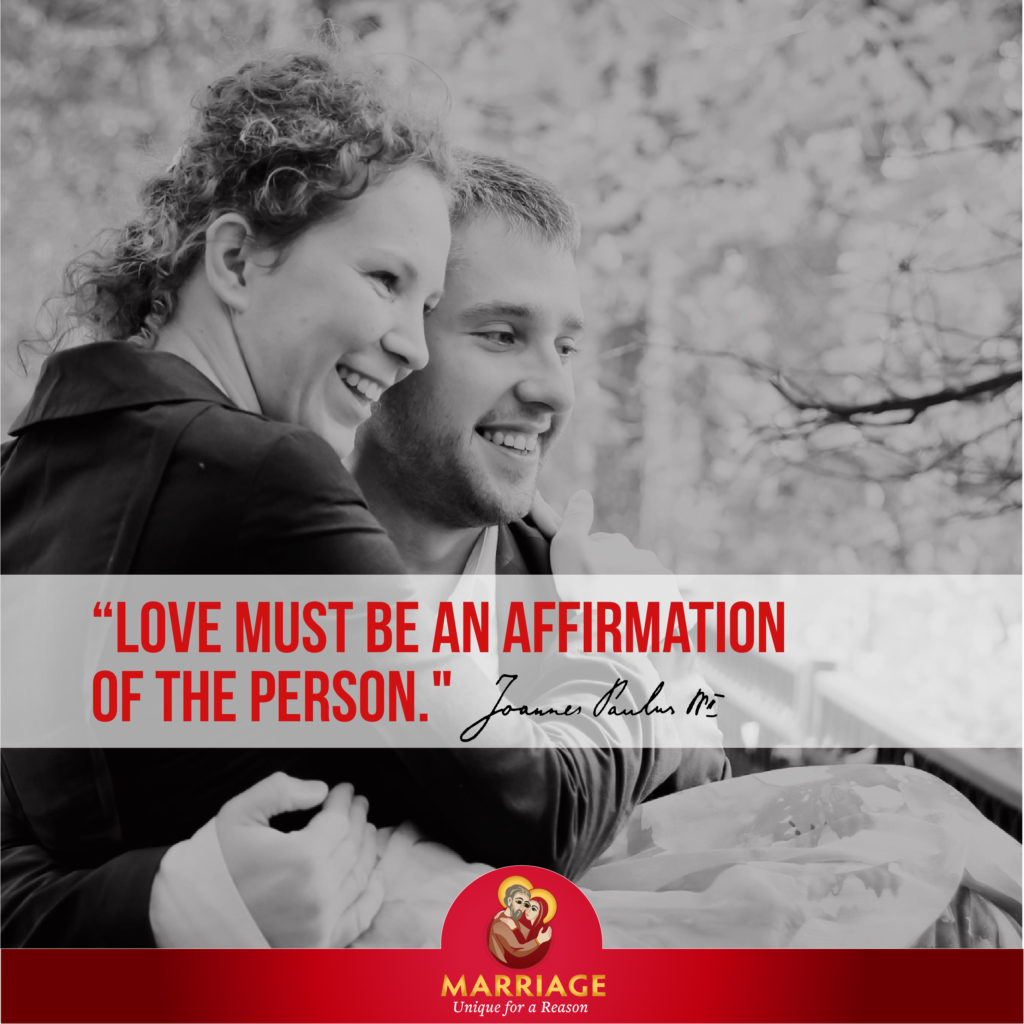
Learning this virtue of charity/love by focusing on affirming the person leads to two other developments in a person’s life. One is growth in the virtue of chastity, exhibiting self-control over one’s sensual and emotional reactions. Second is the discernment of one’s vocation or state in life (marriage or celibacy for the Kingdom). Both states in life are based on the call to love—to affirm every person—in a particular way.
In the next section, Wojtyla continues contemplating the necessity of marital love to be both subjective and objective, repeating much of what has been said before. He talks of what it takes for two people to belong to one another in love. A point he reiterates from earlier is the necessity of each person to know their own worth and dignity as a person before entering a relationship. “A woman is capable of truly making a gift of herself only if she fully believes in the value of her person and in the value as a person of the man to whom she gives herself.”[v] This can be assumed to be reciprocal. One of the challenges of love between a man and a woman is each internalizing that he or she is worthy of it.
[i] Please note the use of the term “accidental” in its philosophical meaning as un-essential, or not determinative of the thing’s nature. For example, for a cat, having long fur is an “accident” while being a creature with four paws and a superiority complex is essential.
[ii] Wojtyla, Karol. Love and Responsibility (San Francisco: Ignatius Press, 1993), p. 122.
[iii] Ibid, p. 123, emphasis original.
[iv] Ibid, p. 123.
[v] Ibid, p. 129.
Archive
Ethics: Love and Responsibility (Post #12)
 To begin his formal ethical analysis of love in Love and Responsibility, Karol Wojtyla sets out two fundamental ways through which to consider ethics: experience or virtue.
To begin his formal ethical analysis of love in Love and Responsibility, Karol Wojtyla sets out two fundamental ways through which to consider ethics: experience or virtue.
Ethics of Experience:
Wojtyla starts with the use of experience as a guideline for ethics. Situationalism (or relativism) sees every situation as unique in such a way that there can be no objective rules about behavior. What is right or wrong in a given situation just 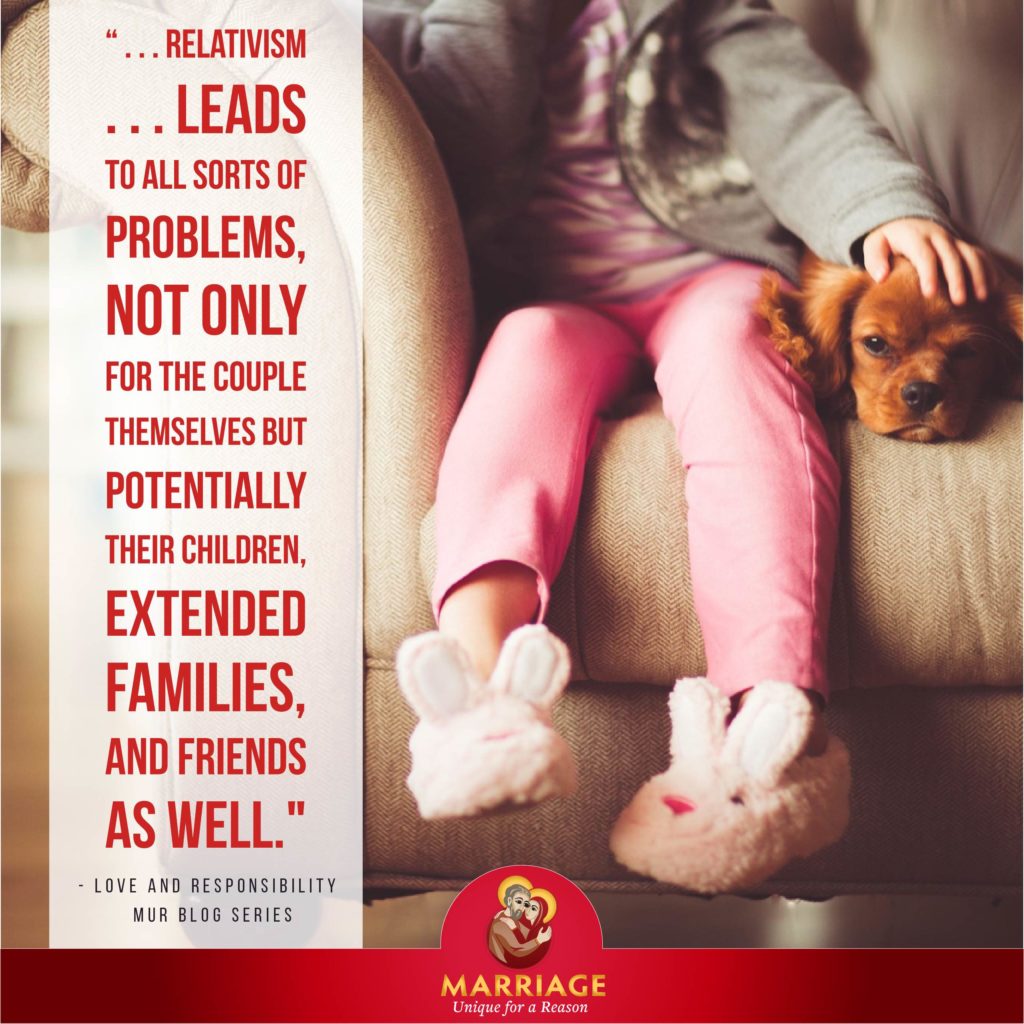 depends on the situation and the people in it. The people themselves are the only ones who can know (or say) what is good for them. So when it comes to the relationship between a man and a woman, anything goes as long as it “works” for the couple. Hopefully, it is obvious that this kind of ethical system leads to all sorts of problems, not only for the couple themselves but potentially their children, extended families, and friends as well.
depends on the situation and the people in it. The people themselves are the only ones who can know (or say) what is good for them. So when it comes to the relationship between a man and a woman, anything goes as long as it “works” for the couple. Hopefully, it is obvious that this kind of ethical system leads to all sorts of problems, not only for the couple themselves but potentially their children, extended families, and friends as well.
Ethics of Virtue:
In contrast, according to the ethics of virtue, it is a person’s duty to choose what is good. What is good is not decided by the person himself but rather determined by some objective rule or norm. “For the freedom of the human will is most fully displayed in morality through duty,”[1] Wojtyla writes. A duty is discovered, not created, through applying a norm. For Wojtyla, the personalistic norm (i.e. the command to love) furnishes the “should’s” and “should not’s” of the relationship between man and woman. Whatever is done should be done out of love, not lust or emotional manipulation. 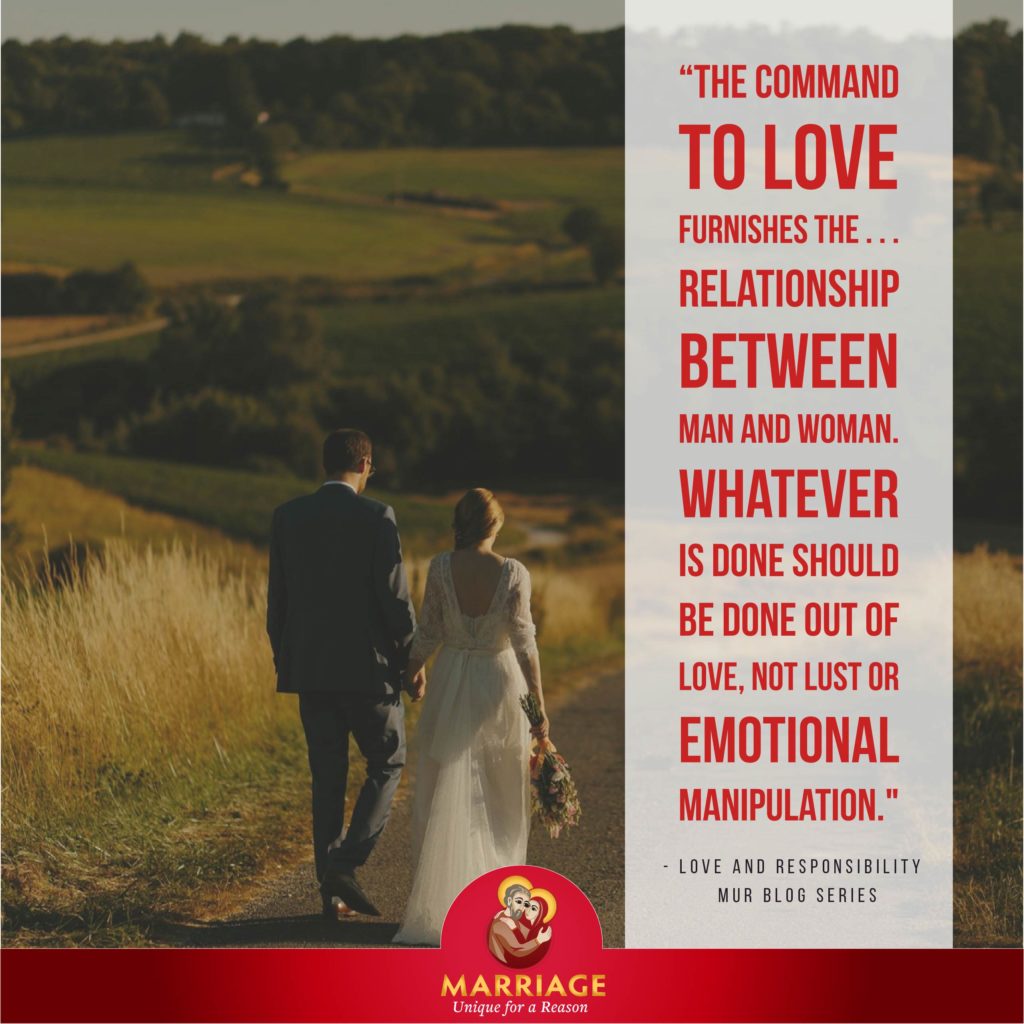 Wojtyla argues that without ethical completeness (respect, love for the other over oneself, etc.), there is no psychological completeness to love either. In other words, if love as a virtue is not present in the relationship between a man and a woman, it will not even be psychologically satisfying in the end because it is not authentic love.
Wojtyla argues that without ethical completeness (respect, love for the other over oneself, etc.), there is no psychological completeness to love either. In other words, if love as a virtue is not present in the relationship between a man and a woman, it will not even be psychologically satisfying in the end because it is not authentic love.
Consider these two approaches to ethics as if they were applied to eating. Situationalism would say that whatever you eat is fine, if you think it is. Doughnuts every day? Go for it! Only you can know if that is a good breakfast for you. Virtue, on the other hand, requires you to consider the objective nutritional value of the food and act accordingly. That doesn’t mean that you always make the right decision, but that you know there is a right to strive for.
So how do a man and woman grow in the Christian virtue of love/charity? Stay tuned!
Click the link below to read ALL of MUR’s Love and Responsibility blog series: https://goo.gl/6itvJH
[1] Wojtyla, Karol. Love and Responsibility (San Francisco: Ignatius Press, 1993), p. 120.
Archive
Integrating Love: Love and Responsibility Series (Post #11)

Integrating Love
In this section of Love and Responsibility, the future pope (St. John Paul II) identifies a challenge that is before a man and a woman who seek love: The Problem of Integrating Love.
So far, Wojtyla’s psychological analysis of love has been of sensual or sentimental reactions of a man for a woman and vice versa. In this section, he notes that all these reactions are “strictly individual”[1]—every person and every relationship is different. Love is always “unique and unreproducible,”[2] 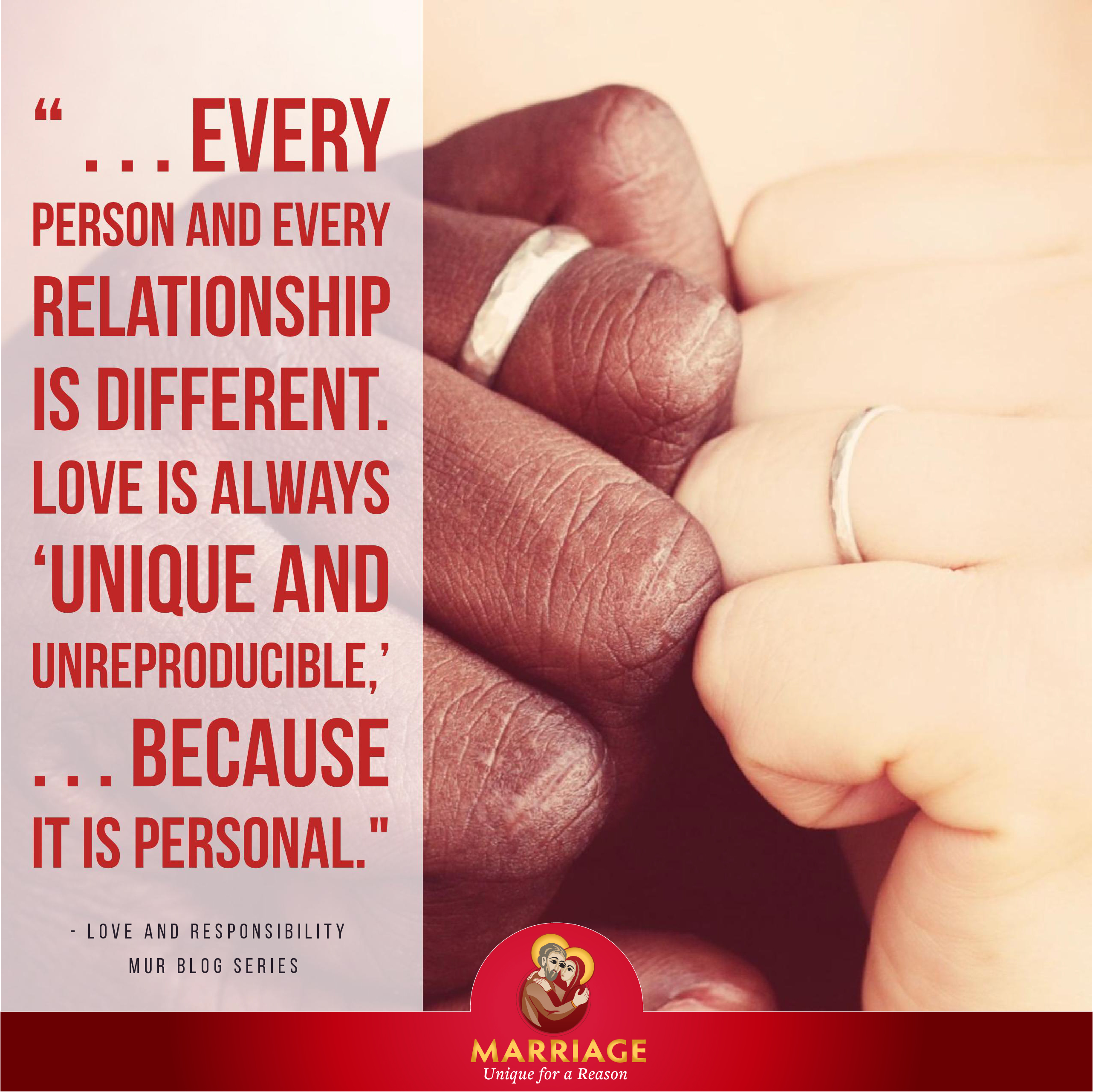 because it is personal. It has an inner dimension and an outer dimension; it is a drama of “great and absorbing importance”[3] in the lives of the two persons involved. Love between a man and a woman can make other experiences pale in comparison and may reveal parts of the self that the person didn’t even know were there. Love has great psychological power.
because it is personal. It has an inner dimension and an outer dimension; it is a drama of “great and absorbing importance”[3] in the lives of the two persons involved. Love between a man and a woman can make other experiences pale in comparison and may reveal parts of the self that the person didn’t even know were there. Love has great psychological power.
Truth and Freedom Integrate Love
Psychology itself, though, confirms that feelings are not enough to sustain love. Two characteristics of a person’s inner life that must enter into the relationship are truth and freedom. These help to  “integrate” the couple’s love—to make it the kind of love that thrives in marriage.
“integrate” the couple’s love—to make it the kind of love that thrives in marriage.
Wojtyla comes back, then, to the choice of the will based on knowledge of the other. “The value of the person is closely bound up with freedom, and freedom is a property of the will.”[5] As previously discussed, the commitment of the will to the other person’s good is decisive in true love. Love must be a free choice; one that is unconditional, and this kind of love cannot be promised without knowledge: “A really free commitment of the will is possible only on the basis of truth,” Wojtyla writes. The truth cannot be only the psychological truth (i.e. “We really feel in love with one another”) but also the objective truth that these two are good for one another. This objective, ethical side of love is Wojtyla’s next subject.
[1] Ibid, p. 115.
[2] Wojtyla, Karol. Love and Responsibility (San Francisco: Ignatius Press, 1993), p. 114.
[3] Ibid, p. 114.
[4] Ibid, p. 116.
[5] Ibid, p. 117.
Archive
Sentimentality: Love and Responsibility Series (Post #10)
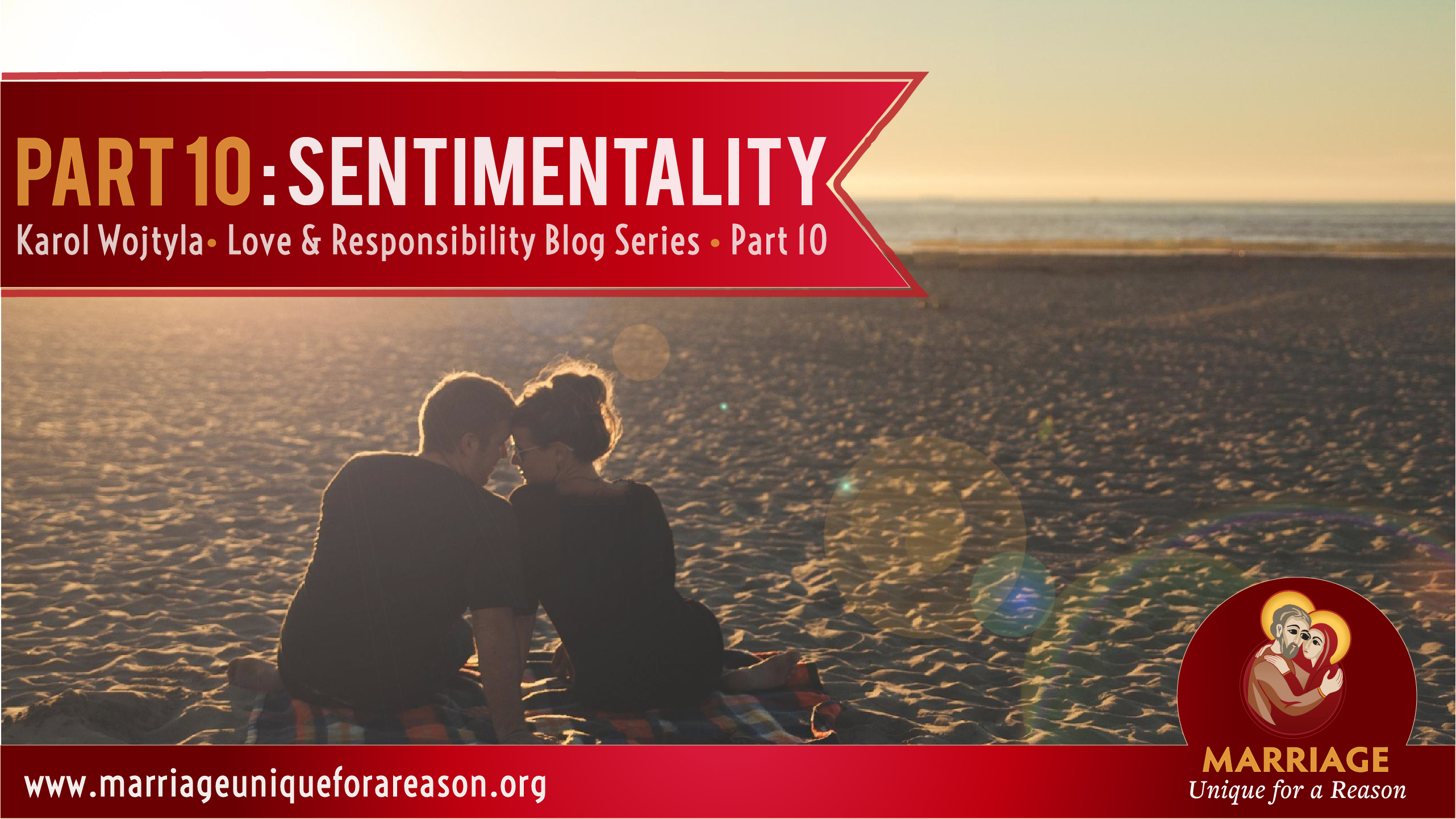 What is Sentimentality?
What is Sentimentality?
After sensuality, Wojtyla turns in Love and Responsibility to sentimentality. While sensuality focuses on the body, sentimentality focuses on the person as masculine or feminine. Sentiment is an affection for the person in which “a different sort of desire [from that of sensuality] is discernible… the desire for nearness… exclusivity or intimacy, a longing to be always alone together.”[i] 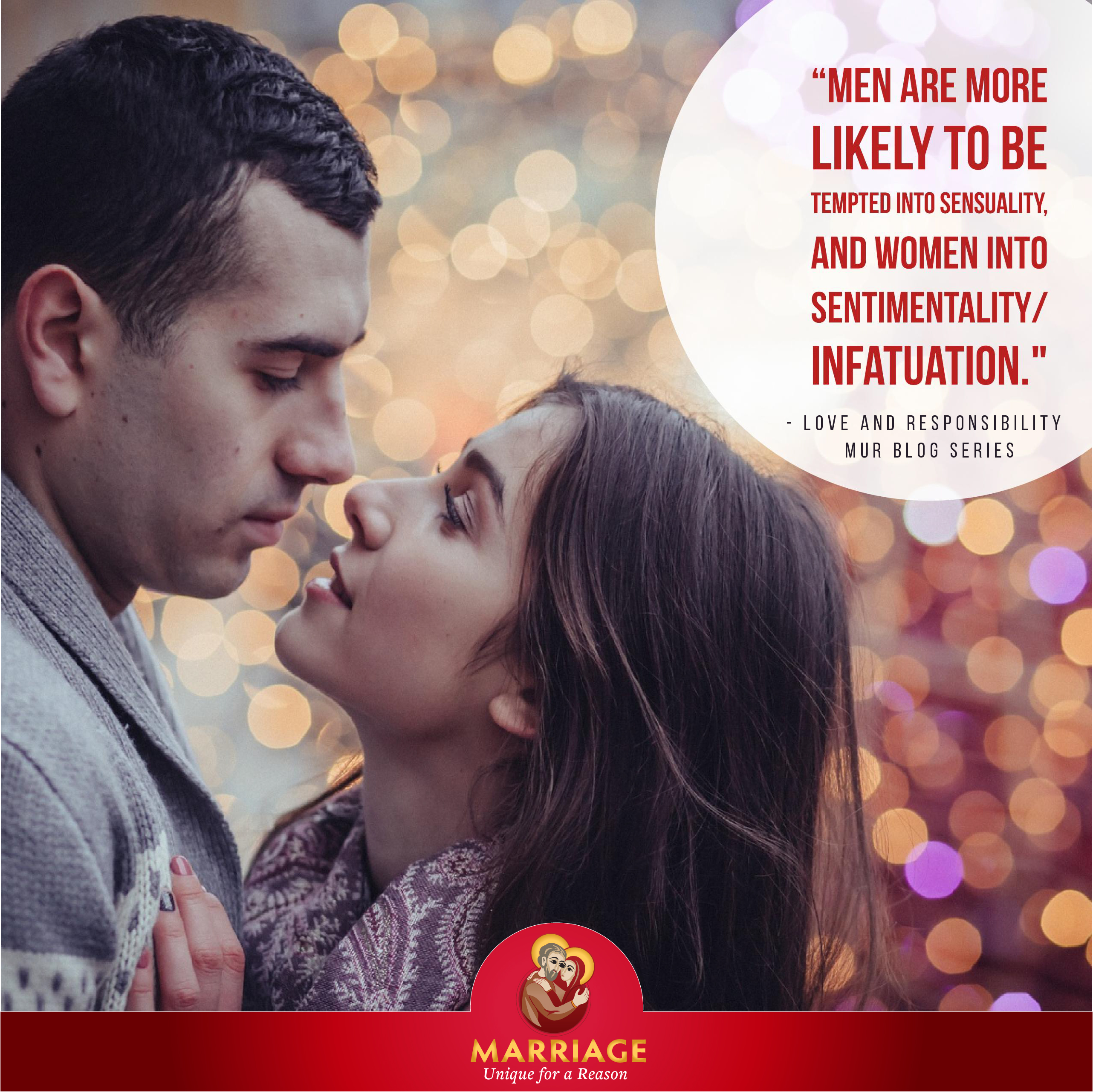 A person who is sentimentally attracted is always thinking about the other person and their “love.” In English, infatuation is probably the best term for what Wojtyla means—the stage in a relationship when the couple’s friends say, “Those two just can’t get enough of each other!” Often, these are the people texting each other at every moment, engaging in “PDA’s” and always trying to be together.
A person who is sentimentally attracted is always thinking about the other person and their “love.” In English, infatuation is probably the best term for what Wojtyla means—the stage in a relationship when the couple’s friends say, “Those two just can’t get enough of each other!” Often, these are the people texting each other at every moment, engaging in “PDA’s” and always trying to be together.
Wojtyla notes that there seems to be a marked difference between men and woman in this regard: men are more likely to be tempted into sensuality, women into sentimentality/ infatuation. This is a generalization, of course, but a helpful one. Because of his physiological and psychological makeup, a man is more likely than a woman to experience a desire to use someone’s body for pleasure; this means the man has a responsibility to be aware of this tendency and to guard against it. Sally may see a certain tenderness or other physical contact with Harry as a sign of affection, part of a growing love between them, while Harry may recognize that, for his part, his mind and body have crossed the line into a desire for pleasure or enjoyment. In that case, Harry should communicate this to Sally and they should set boundaries to help ensure that real love has a chance to grow.
Sentimentality is Not Based on Reality:
Sentimentality may sound better than sensuality, in terms of weaknesses, but Wojtyla explains why this is not necessarily the case. In infatuation, “a variety of values are bestowed upon the object of love which he or she does not necessarily possess in reality. These are ideal values, not real ones.”[ii] This kind of idealization happens in young love: the other person is just  an opportunity for one’s own “perfect” man or woman to be loved. It is a way of using the person emotionally. The other person (usually the man), “is less the object than the occasion for affection.”[iii] In other words, Harry is just the guy who is allowing Sally to “love” someone and be someone’s girlfriend. It could as easily have been Greg. Sally then endows Harry with every good quality she imagines in a man: Harry is smart, strong, confident, funny, kind, etc. Sally doesn’t know that Harry is all these things, but she thinks or decides that he is. This infatuation “feeds” on Sally’s feelings and desires rather than who Harry actually is, so even though Sally wants to be around him all the time, she doesn’t necessarily want to know the real Harry. She doesn’t want to know his insecurities, vulnerabilities, weaknesses, failures, or sins. “This is why sentimental love is very often a cause of disillusionment… The discrepancy between the ideal and the reality often results in sentimental love fading or indeed changing into a feeling of hatred.”[iv] Infatuation may be fun, but it has to mature, or even die, in order to become love.
an opportunity for one’s own “perfect” man or woman to be loved. It is a way of using the person emotionally. The other person (usually the man), “is less the object than the occasion for affection.”[iii] In other words, Harry is just the guy who is allowing Sally to “love” someone and be someone’s girlfriend. It could as easily have been Greg. Sally then endows Harry with every good quality she imagines in a man: Harry is smart, strong, confident, funny, kind, etc. Sally doesn’t know that Harry is all these things, but she thinks or decides that he is. This infatuation “feeds” on Sally’s feelings and desires rather than who Harry actually is, so even though Sally wants to be around him all the time, she doesn’t necessarily want to know the real Harry. She doesn’t want to know his insecurities, vulnerabilities, weaknesses, failures, or sins. “This is why sentimental love is very often a cause of disillusionment… The discrepancy between the ideal and the reality often results in sentimental love fading or indeed changing into a feeling of hatred.”[iv] Infatuation may be fun, but it has to mature, or even die, in order to become love.
Neither sensuality nor sentimentality, then, results in a robust love that is capable of weathering storms. The next section will be about integrating love in order that two people can pledge themselves to one another for life.
[i] Wojtyla, Karol. Love and Responsibility (San Francisco: Ignatius Press, 1993), p. 110.
[ii] Ibid, p. 112.
[iii] Ibid, p. 113.
[iv] Ibid, p. 113.
Archive
Sensuality: Love and Responsibility Series (Post #9)
Sensuality as Impression:
In his section on sensuality, Wojtyla looks at what happens when a man and a woman “make an impression” on each other. With this phrase, we are saying more than that Harry and Sally met; We are saying that this meeting left an impression. Harry walked away with a mental picture of what Sally looked like; Sally left with a memory of what Harry sounded like (for example). The impression was spontaneous—it happened to them, they didn’t do it to themselves—but it linked up with an intellectual acknowledgement, such as, “He/she is attractive; maybe we could get together.”
The immediate reaction is what Wojtyla calls sensuality. “Sensuality is not just a matter of male x becoming aware of female y through his senses, or vice versa. Sensuality always implies experiencing a particular value bound up with this sensory awareness. Specifically we are concerned with a sexual value, connected above all with the body of a person of the other sex.”[1] Sensuality by itself, Wojtyla says, has a “consumer orientation,”[i] being aimed at a body and not a person; in this way it can interfere with noticing and knowing the person as they truly are.
Sensual Reaction is Natural:
Wojtyla is quick to point out that a sensual reaction is natural, not evil; it is a “reflex.”[ii] A healthy body reacts with sensuality because of the biological facts of human existence (man + woman = baby) and it is in and through the body that these facts are experienced. Sexual attraction to another person reaches consciousness “where the impression is accompanied by an emotion experienced not only mentally but bodily. Sensuality is connected with the stirrings of the body, especially in its so-called erogenous zones.”[iii] This kind of spontaneous bodily reaction is particularly strong in men. Wojtyla notes that a man’s bodily reactions “would give man all the guidance he needs in his sexual life”[iv] if he were only an animal, driven by instinct to another animal. But man is called to exercise his freedom and self-control.
The sensual reactions of the body can pose a threat to true love when they “devalue the person”[v] by seeing the other as an object. This is why the  conscience is often stirred by sensual reactions—a man (or a woman) knows that this reaction does not do full justice to the person in front of them. They may be embarrassed by it. But sensuality can be understood as the “raw material” for love, when it is integrated into a full human relationship.
conscience is often stirred by sensual reactions—a man (or a woman) knows that this reaction does not do full justice to the person in front of them. They may be embarrassed by it. But sensuality can be understood as the “raw material” for love, when it is integrated into a full human relationship.
Wojtyla notes that sensuality, since it is focused only on a body, is notoriously fickle. It turns easily from one person to the next. A man who goes to a bar and “checks out” every woman who walks in the door is a prime example of someone seemingly ruled by sensuality. Wojtyla also notes that a person may 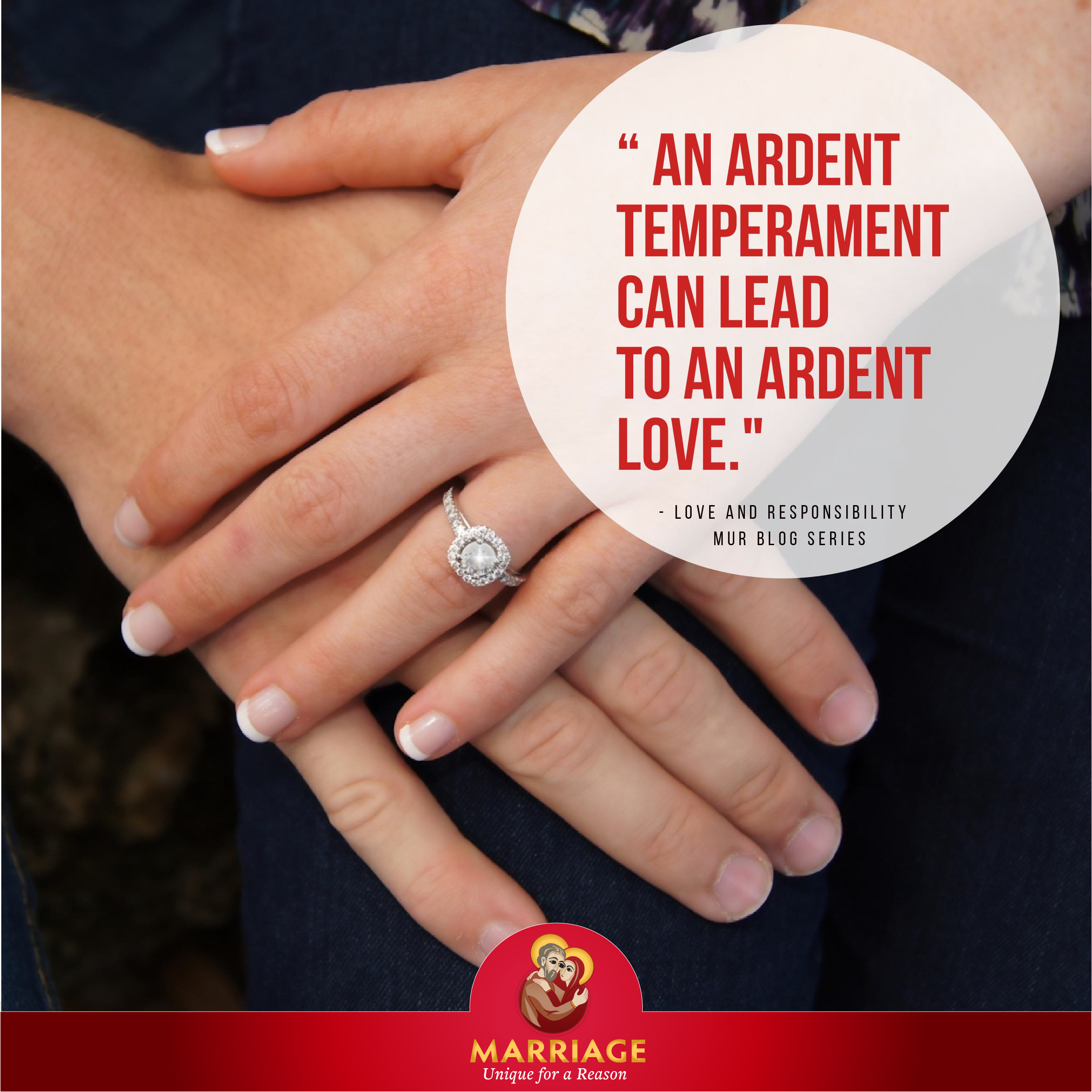 react sensually to a body that is not present (consider pornography) and that sensuality may “insinuate itself into [a] situation ‘uninvited,’”[vi] such as when an artist is painting a nude model (and has no intention of using her sexually). These reactions make life complicated!
react sensually to a body that is not present (consider pornography) and that sensuality may “insinuate itself into [a] situation ‘uninvited,’”[vi] such as when an artist is painting a nude model (and has no intention of using her sexually). These reactions make life complicated!
Lest a person who is naturally more sensual (reacting swiftly or strongly to the other sex) be led to despair, Wojtyla notes at the end of this section that, “An exuberant and ready roused sensuality is the stuff from which a rich—if difficult—personal life may be made.”[vii] An ardent temperament can lead to an ardent love.
[1] Wojtyla, Karol. Love and Responsibility (San Francisco: Ignatius Press, 1993), p. 105.
[i] Ibid, p. 105.
[ii] Ibid, p. 106.
[iii] Ibid, p. 107.
[iv] Ibid, p. 107.
[v] Ibid, p. 107.
[vi] Ibid, p. 109.
[vii] Ibid, p. 109.
Archive
Marital Love: Love and Responsibility Series (Post #8)
Betrothed Love:
In this section of Love and Responsibility, Wojtyla looks specifically at the type of love that a husband and wife share, and he calls this “betrothed love.” The phrase in English that better conveys what Wojtyla means is “marital love,” since he means the love in which a man and woman give themselves fully to one another.
Wojtyla reminds us that we must possess ourselves before we can give ourselves. Self-gift is not about passively becoming what someone else wants us to be. Have you seen the movie 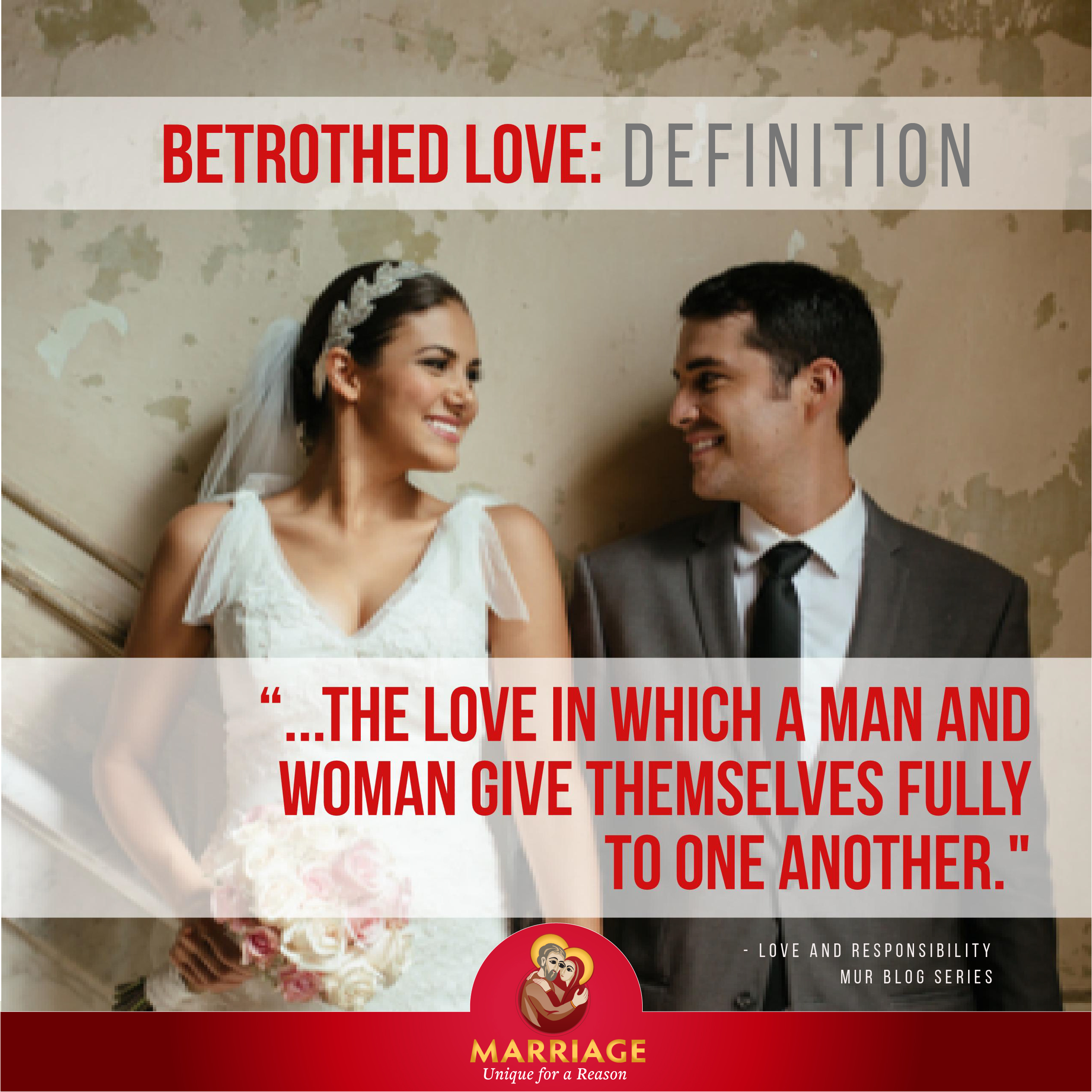 Runaway Bride (1999)? The main character (Maggie) always adjusted her likes and dislikes according to what her boyfriend or fiancé liked. She wanted to be loved, so she changed herself to match whatever the man she was with liked in a woman. With the hippie, she became a hippie; with the athletic guy, she became a sports fan. After this habit was pointed out to her, Maggie realized that she didn’t know herself.
Runaway Bride (1999)? The main character (Maggie) always adjusted her likes and dislikes according to what her boyfriend or fiancé liked. She wanted to be loved, so she changed herself to match whatever the man she was with liked in a woman. With the hippie, she became a hippie; with the athletic guy, she became a sports fan. After this habit was pointed out to her, Maggie realized that she didn’t know herself.
Most of us can probably relate to this impulse at some level: We fudge our favorite book so that we sound smart, or nod our head when our crush talks about a band we’ve never heard of… if that kind of thing becomes a habit, we might reach a point where we don’t “possess” ourselves and cannot find real love. This is perhaps more common for women than men.
Marriage is to Give
Wojtyla points out that, psychologically speaking, it is usually the woman who feels that her role in marriage is to give. However, objectively (or ontologically) speaking, both spouses must give themselves to one another, and not just sexually. “Giving oneself only sexually, without the full gift of the person,”[1] is just a form of use, as previously discussed. Husband and wife give themselves to one another even through the mundane activities of daily life. 
At the risk of being too movie-heavy in this post, the movie Fireproof (2008), while one of the cheesiest movies ever, does a great job communicating this truth about marriage. Once the husband (Caleb) begins really giving himself to his wife by making her coffee, buying her flowers, and considering her needs before his own (possibly for the first time in their entire marriage), the relationship is transformed. Caleb comes to understand that love is a choice; He recognizes that he has been selfish and that he has not acted with goodwill and friendship.
The Person and Love:
Wojtyla concludes with the note that marital love is not some isolated kind of love, different from every other kind. “Betrothed love, though of its nature it differs from all the forms of love previously analyzed, can nevertheless not develop in isolation from 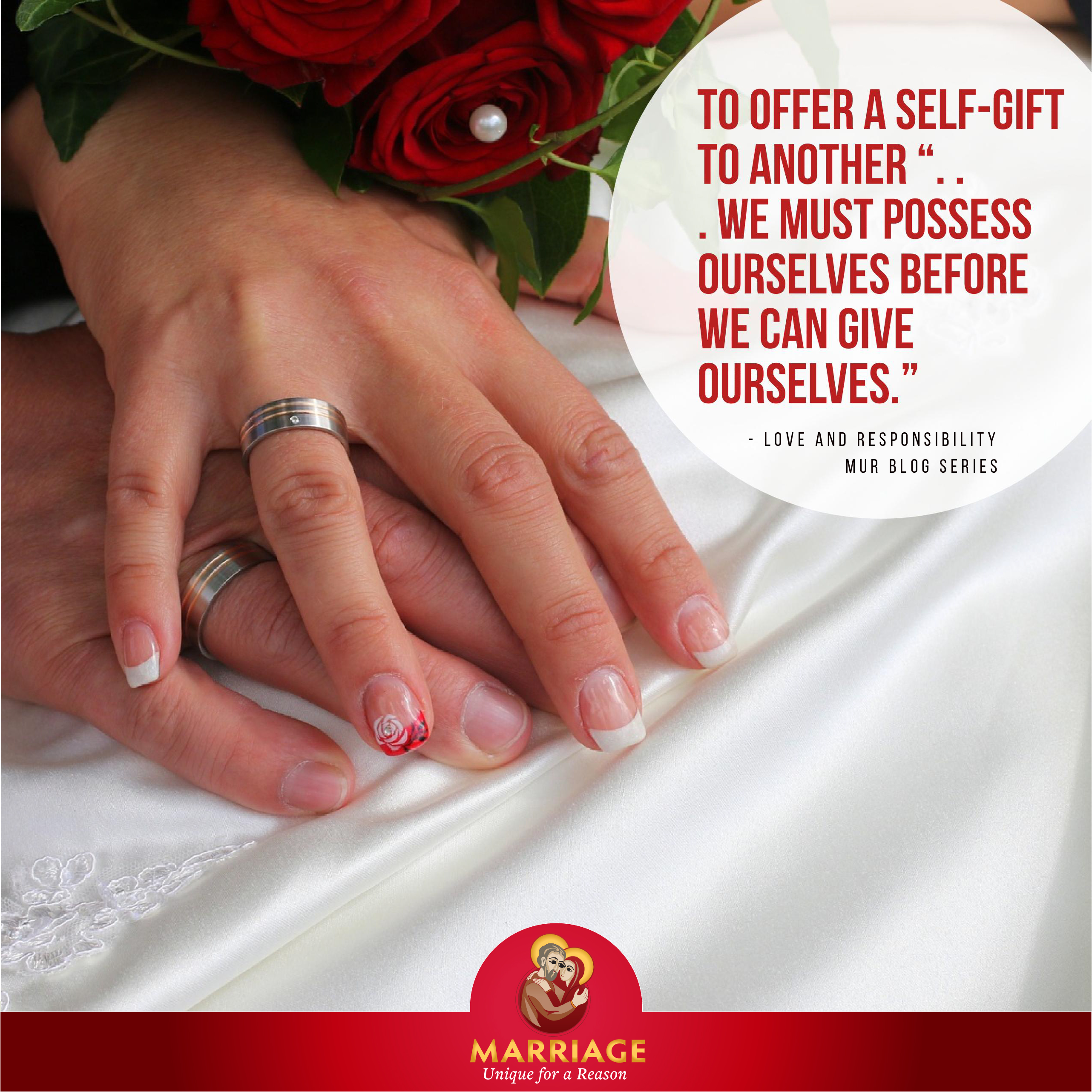 them. In particular, it is essential that Husband and wife give themselves to one another even through the mundane activities of daily life..”[2]
them. In particular, it is essential that Husband and wife give themselves to one another even through the mundane activities of daily life..”[2]
Thus concludes the section on “The Person and Love.” We have looked at attraction, desire, goodwill, reciprocity, friendship, and betrothed love as experiences of the person. In the next section, Wojtyla goes into a psychological analysis of love. Stay tuned!
[1] Ibid, p. 99.
[2] Ibid, p. 100.
Archive
Infatuation/Sympathy and Friendship: Love and Responsibility Series (Post #7)
 NOTE: While we normally use “sympathy” to describe sharing in someone else’s suffering, Karol Wojtyla uses the word according to its root meaning – feeling the same as another person – to describe the emotional feeling of love that couples experience as they date and approach marriage. I will also use the term “infatuation” for the same phenomenon.
NOTE: While we normally use “sympathy” to describe sharing in someone else’s suffering, Karol Wojtyla uses the word according to its root meaning – feeling the same as another person – to describe the emotional feeling of love that couples experience as they date and approach marriage. I will also use the term “infatuation” for the same phenomenon.
Love as Desire Needs to Becomes Love as Goodwill
In the next section of Love and Responsibility, Wojtyla examines how sympathy matures into friendship. This process is like the earlier one (where love as desire has to mature to love as goodwill). In both cases, emotions come first, and the will follows.
Wojtyla writes that sympathy— infatuation, the “high” that a man and a woman experience when they discover that they like each other romantically—“takes possession of one’s feelings and will, irrespective of the objective worth of the person for whom it is felt.”[1] Studies have shown that the first stage of romance,  being “in love,” releases lots of happy chemicals in the brain—it’s even like being on drugs! Infatuation makes a man and a woman feel close to each other and aware of their mutual attraction. It lays a foundation and “creates conditions for friendship.”[2]
being “in love,” releases lots of happy chemicals in the brain—it’s even like being on drugs! Infatuation makes a man and a woman feel close to each other and aware of their mutual attraction. It lays a foundation and “creates conditions for friendship.”[2]
Love between a man and a woman must mature into friendship. In friendship, a person chooses the other and wants what is best for him or her. The choice to be friends with someone must be based on who he or she really is, so knowledge and time are crucial. The emotion of sympathy—liking each other—must be supplemented “with an objective knowledge and belief in the value of that person.”[3] “Love at first sight” can spring up in a moment, but becoming friends, “normally demands time and reflection.”[4]
When a priest meeting with an engaged couple asks, “How long have you been dating?” it isn’t just out of curiosity – he’s trying to discern something about the depth of their friendship. It is important information for him to know to accompany them in their discernment of marriage. As Wojtyla puts it, only if a man and woman have a mature friendship that has “objective existence,” over and above feelings, “is it a friendship on the basis of which two people can build a marriage, and share their lives.”[5]
Marriage’s Strong Foundation: Friendship
Infatuation is not enough to keep a couple together over time. It will break down, and, “As soon as sympathy breaks down [the two people] usually feel that love has also come to an end.”[6] A marriage that takes place before a strong foundation is present is a danger; the 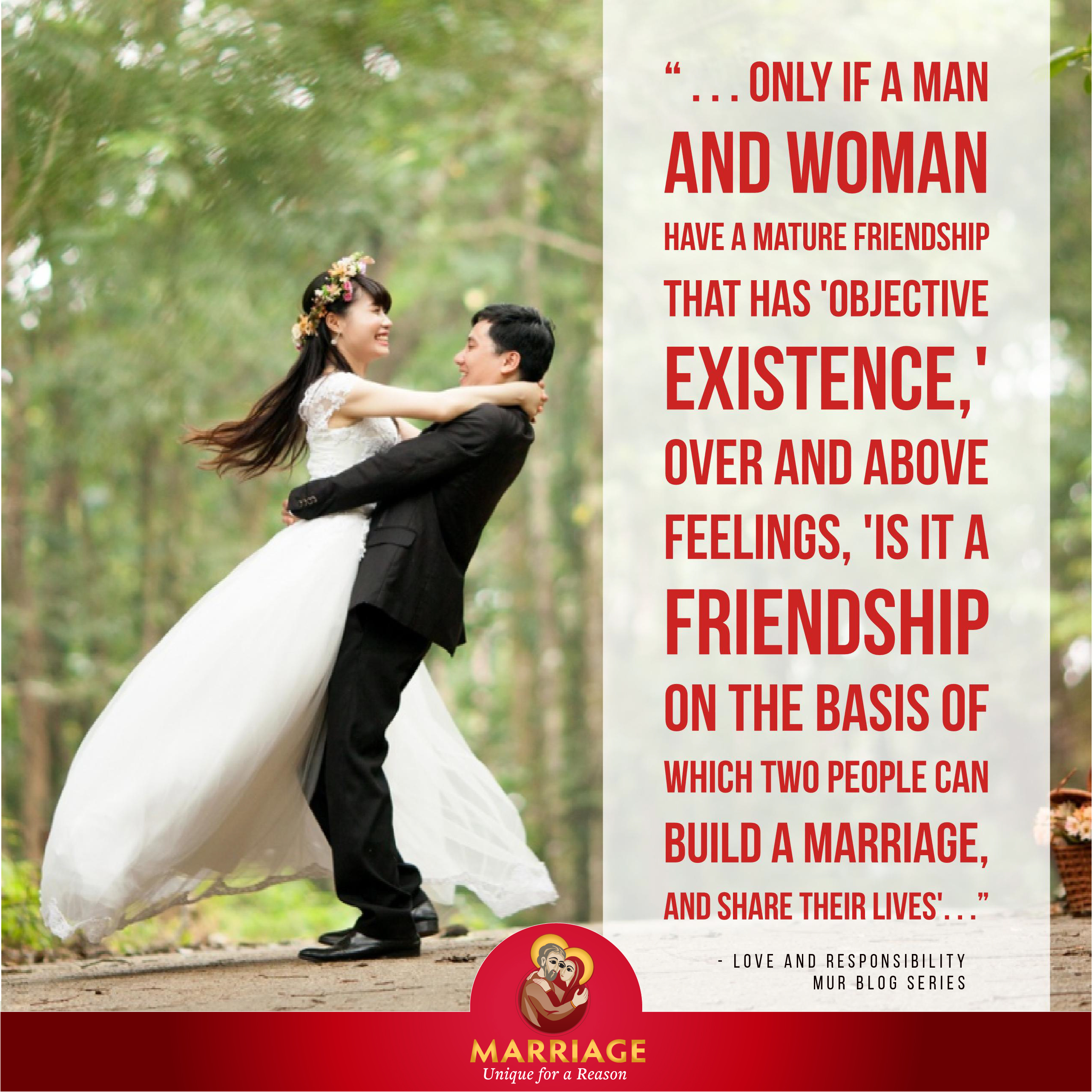 high divorce rate attests to it. Unless a man and a woman know each other’s characters and have formed a real friendship, if they marry, their marriage will not be on a strong foundation. Their marriage will not survive unless the spouses mature and “grow into” friendship after the wedding day.
high divorce rate attests to it. Unless a man and a woman know each other’s characters and have formed a real friendship, if they marry, their marriage will not be on a strong foundation. Their marriage will not survive unless the spouses mature and “grow into” friendship after the wedding day.
Comradeship in Marriage:
At the end of this section, Wojtyla mentions “comradeship,” by which he means that the man and woman are co-workers, partners in a project that is bigger than them. Being co-workers, “rests on such objective 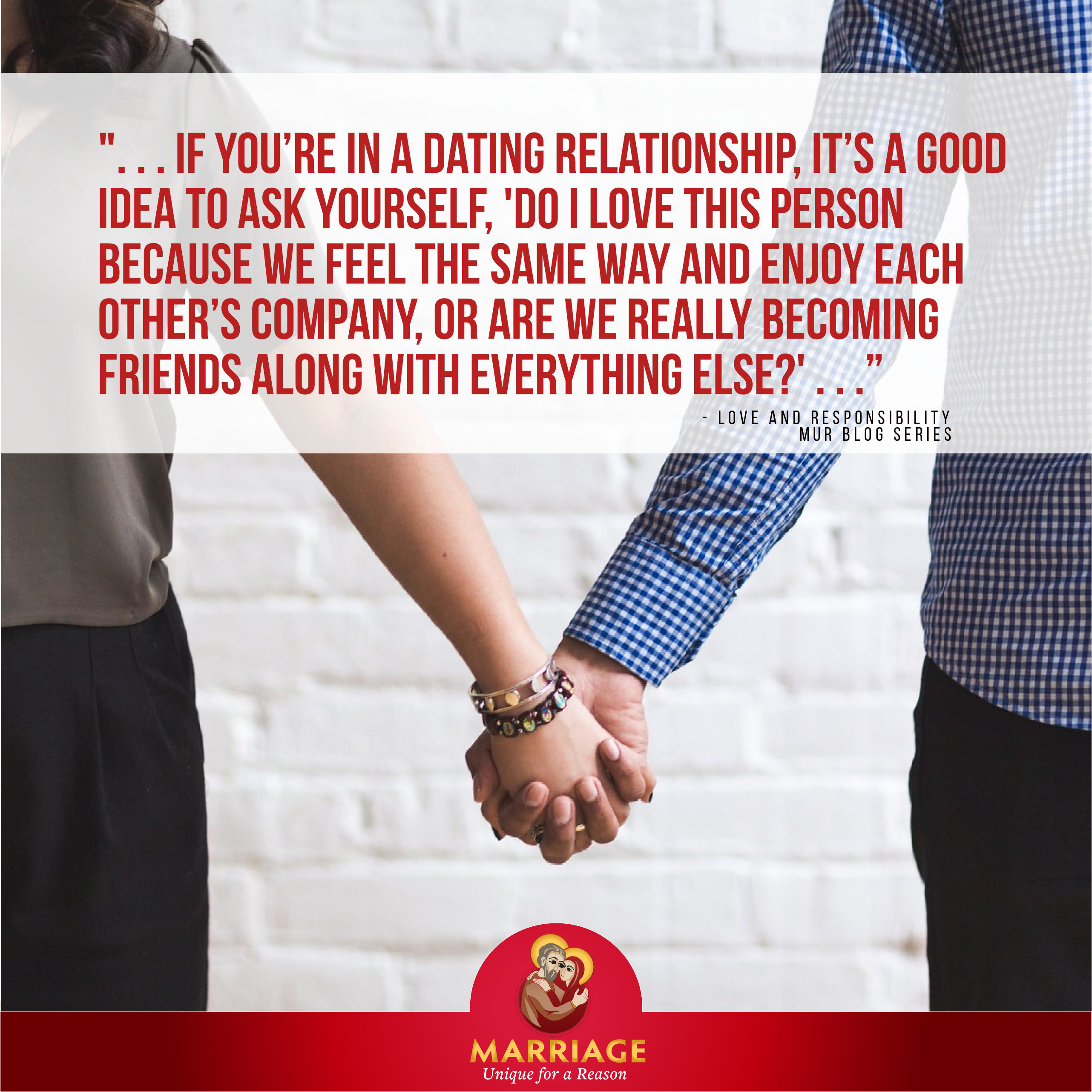 foundations as joint work, common goals, shared concerns, etc.”[7] If sympathy/ affection and comradeship/ partnership are present, “the combination is a very promising one.”[8] When two people work together on a project, a certain unity develops around that shared task. For example, “We made a picnic table this weekend” or “We cooked a meal for a soup kitchen last night.” There are simple, practical ways that people need one another and benefit from doing things with other people.[9] Wojtyla says that people who are good at working with others are also well-suited for marriage and family life.
foundations as joint work, common goals, shared concerns, etc.”[7] If sympathy/ affection and comradeship/ partnership are present, “the combination is a very promising one.”[8] When two people work together on a project, a certain unity develops around that shared task. For example, “We made a picnic table this weekend” or “We cooked a meal for a soup kitchen last night.” There are simple, practical ways that people need one another and benefit from doing things with other people.[9] Wojtyla says that people who are good at working with others are also well-suited for marriage and family life.
In conclusion, if you’re in a dating relationship, it’s a good idea to ask yourself, “Do I love this person because we feel the same way and enjoy each other’s company, or are we really becoming friends along with everything else?”
[1] Wojtyla, Karol. Love and Responsibility (San Francisco: Ignatius Press, 1993), p. 90.
[2] Ibid, p. 91.
[3] Ibid, p. 92.
[4] Ibid, p. 92. The philosopher Aristotle wrote in Nicomachean Ethics that while the desire to be friends may happen immediately, friendship itself does not.
[5] Ibid, p. 94.
[6] Ibid, p. 90.
[7] Ibid, p. 94.
[8] Ibid, p. 94.
[9] Wendell Berry writes about how men and women used to objectively need one another more in the past (to raise the barn, to harvest the fields, to teach the children all that they needed to know, etc.), and this led to stronger bonds between spouses in marriage and among the community at large.
Archive
Love as Attraction: Love and Responsibility Series (Post #5)
 In the section entitled, “The Metaphysical Analysis of Love,” Karol Wojtyla discusses a number of aspects that make up the “invisible” side of love, namely attraction, desire, goodwill, reciprocity, and friendship. These are experiences that men and woman have when they meet one another. Today we focus on attraction.
In the section entitled, “The Metaphysical Analysis of Love,” Karol Wojtyla discusses a number of aspects that make up the “invisible” side of love, namely attraction, desire, goodwill, reciprocity, and friendship. These are experiences that men and woman have when they meet one another. Today we focus on attraction.
An attraction—a “liking”— happens quite naturally between men and women. An instant or initial attraction occurs, Wojtyla writes, as a result of natural sexual desire, but in order to really like someone on the personal level, we have to know them. Attraction to another person—a man to a woman, a woman to a man—“does not mean just thinking about some person as a good, it means a commitment to think of that person as a certain good, and such a commitment can in the last resort be effected only by the will.”[i] This is a really important point: we have to consent to an 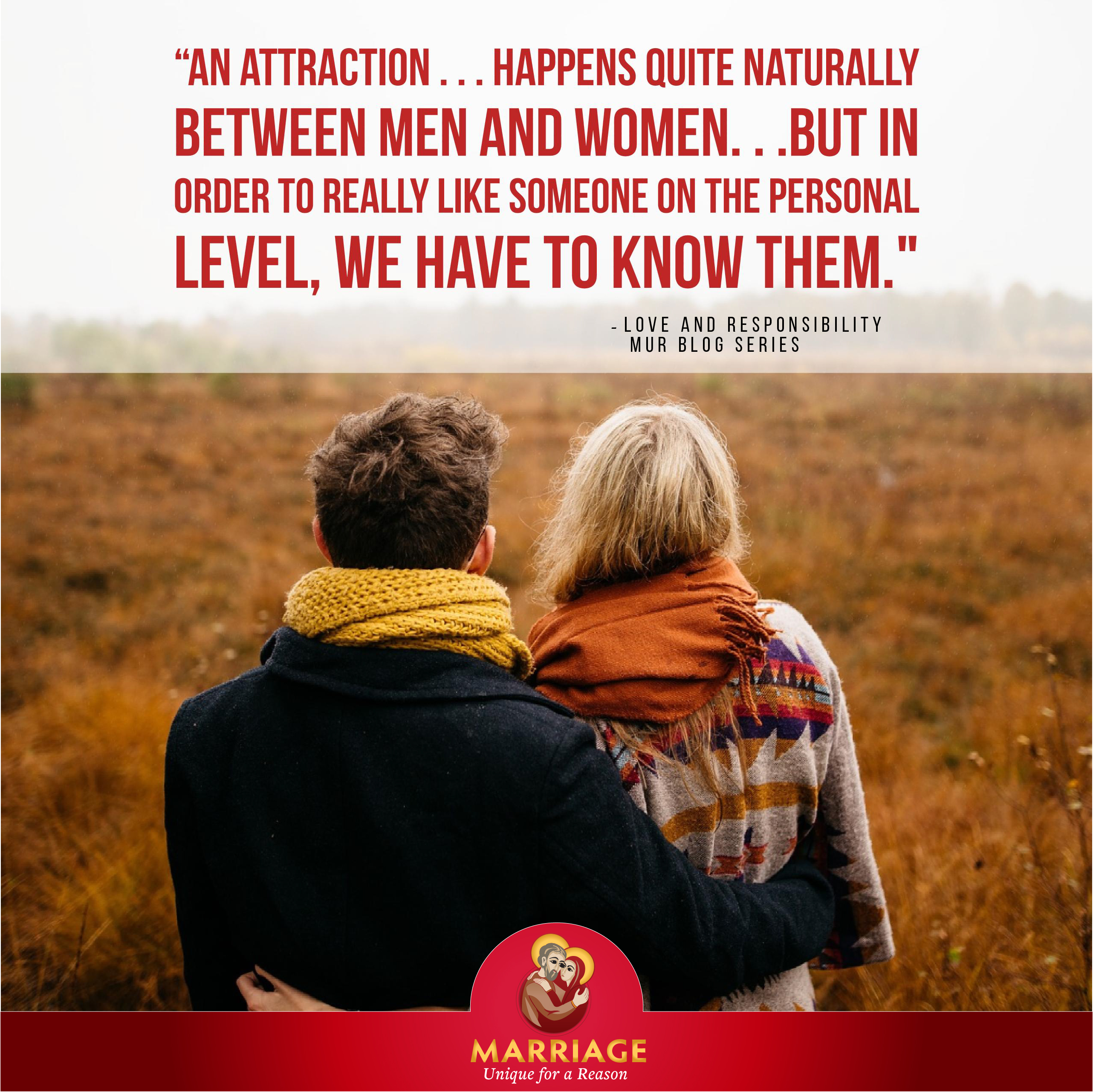 attraction before it will really take hold. Feelings may arrive spontaneously, but not a full attraction of one person to another.
attraction before it will really take hold. Feelings may arrive spontaneously, but not a full attraction of one person to another.
Our culture says the opposite: that attraction is a blind force, a passion, that moves people without their consent.[ii] We think that we have to be attracted to so-and-so; we have no choice in the matter. Wojtyla says that is not true: “At the base of attraction is a sense impression, but this is not decisive in itself. For we discover in an attraction a certain cognitive commitment of the subject, a man, let us say, towards the object, in this case a woman.”[iii]
Let’s say that a man sees a woman at a bar and is struck by her; He thinks she’s the most beautiful woman he’s ever seen. He starts walking over to ask for her number… when he realizes that she’s wearing a wedding ring. If he’s a good man (we’re going to presume that he is), the moment is over. “That woman at the bar” may always be the most beautiful woman the man has ever seen, but he’s not going to nurture an attraction toward her. He knows that being attracted to someone else’s wife is not going to make him happy. (Obviously, if he decided that he had “no choice” but to pursue an attraction to her regardless of her marriage, he’s not a good man!)
Wojtyla also analyzes the unpredictability of attraction, pointing out that every human person is complex and reacts to different qualities in others based on temperament, past experience, family background, etc. You can never tell who is going to like each other! 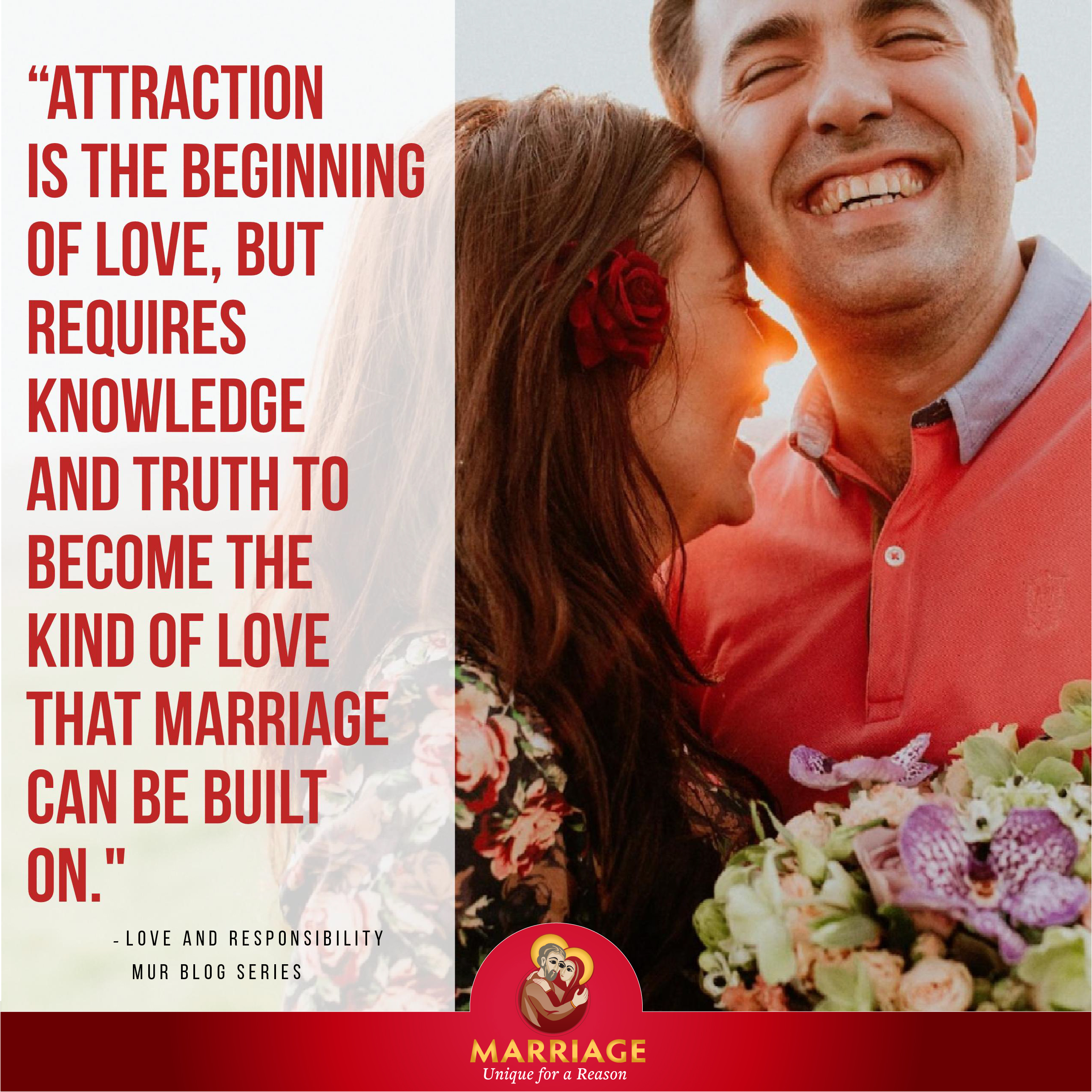 We are all a mixed bag, if you will. (Wojtyla’s phrase is “uneven good.”[iv]) This is why setting friends up on blind dates can be risky (though it’s a risk we encourage you to take!).
We are all a mixed bag, if you will. (Wojtyla’s phrase is “uneven good.”[iv]) This is why setting friends up on blind dates can be risky (though it’s a risk we encourage you to take!).
Wojtyla writes that an attraction must discover that it is rooted in the truth about the person before it can be called love. Perhaps Sally thinks that Harry is kind, but then she sees him repeatedly acting in an unkind way. Perhaps Harry thinks Sally is sweet and then finds her kicking puppies. This is when disillusionment sets in: “This person isn’t who I thought they were!” Wojtyla writes, “This emptiness and the feeling of disappointment which goes with [this experience] often produce an emotional reaction in the opposite direction: a purely emotional love often becomes an equally emotional hatred for the same person.”[v] That’s why it’s so important to always seek to know the real person, not the image in your head!
To sum things up: attraction is the beginning of love, but requires knowledge and truth to become the kind of love that marriage can be built on.
[i] Wojtyla, Karol. Love and Responsibility (San Francisco: Ignatius Press, 1993), p. 75.
[ii] Notably, in Dante’s Inferno, the adulterous couple Francesca and Paolo who are in hell because of their sin of lust are battered about by the winds, unable to control their movements forever as they were unable to use self-control in life.
[iii] Ibid, p. 75.
[iv] Ibid, p. 76.
[v] Ibid, p. 79.
[i]Wojtyla, Karol. Love and Responsibility (San Francisco: Ignatius Press, 1993), p. 75.
[ii] Ibid, p. 75.
[iii] Ibid, p. 76.
[iv] Ibid, p. 79.
Archive
Sexual Desire: Love and Responsibility Series (Post #4)

The Human Person’s Sexual Desire:
The second major section in the first chapter of Love and Responsibility is called “Interpretation of the Sexual Urge”—we are going to call this “sexual desire” since that is more familiar. In this section, Wojtyla lays out a few different ways of looking at sexual desire in the life of a human person.
Sexual desire is “instinctual” in the human being in that it is aimed at the survival of the species and is not a result of conscious deliberation. But while instinct implies a blind force that must be obeyed, sexual desire, while it is a natural drive, does not compel a person to obey it. After all, “Man is by nature capable of rising above instinct in his actions.”[1] While bodily reactions occur without a person choosing them, ethics come into play as soon as the person makes a choice.
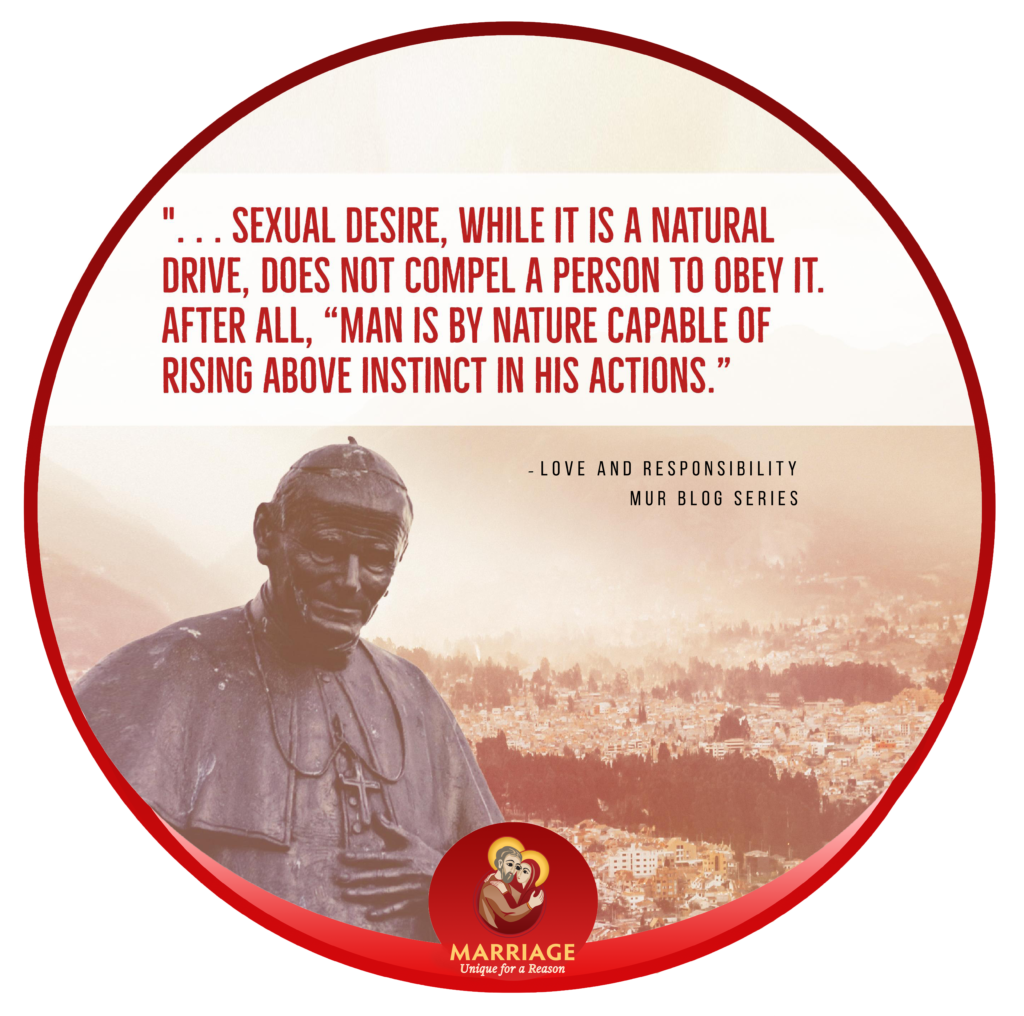 “Man is not responsible for what happens to him in the sphere of sex since he is obviously not himself the cause of it, but he is entirely responsible for what he does in this sphere.”[2] [Author’s note: Teaching young people the difference between a reaction they are not responsible for and a deliberate choice to consent to the reaction or further it is an important task for parents, youth ministers, pastors, and other trustworthy adults.]
“Man is not responsible for what happens to him in the sphere of sex since he is obviously not himself the cause of it, but he is entirely responsible for what he does in this sphere.”[2] [Author’s note: Teaching young people the difference between a reaction they are not responsible for and a deliberate choice to consent to the reaction or further it is an important task for parents, youth ministers, pastors, and other trustworthy adults.]
Wojtyla notes that sexual desire is an experience of every human person. “Every human being is by nature a sexual being, and belongs from birth to one of the two sexes.”[3] Being male or a female “means that a person’s whole existence has a particular orientation which shows itself in his or her actual internal development… and in the normal course of things… manifests itself in a certain natural predilection for, a tendency to seek, the other sex.”[4] In other words, we are “oriented” in an objective way: male toward female, female toward male.[5] 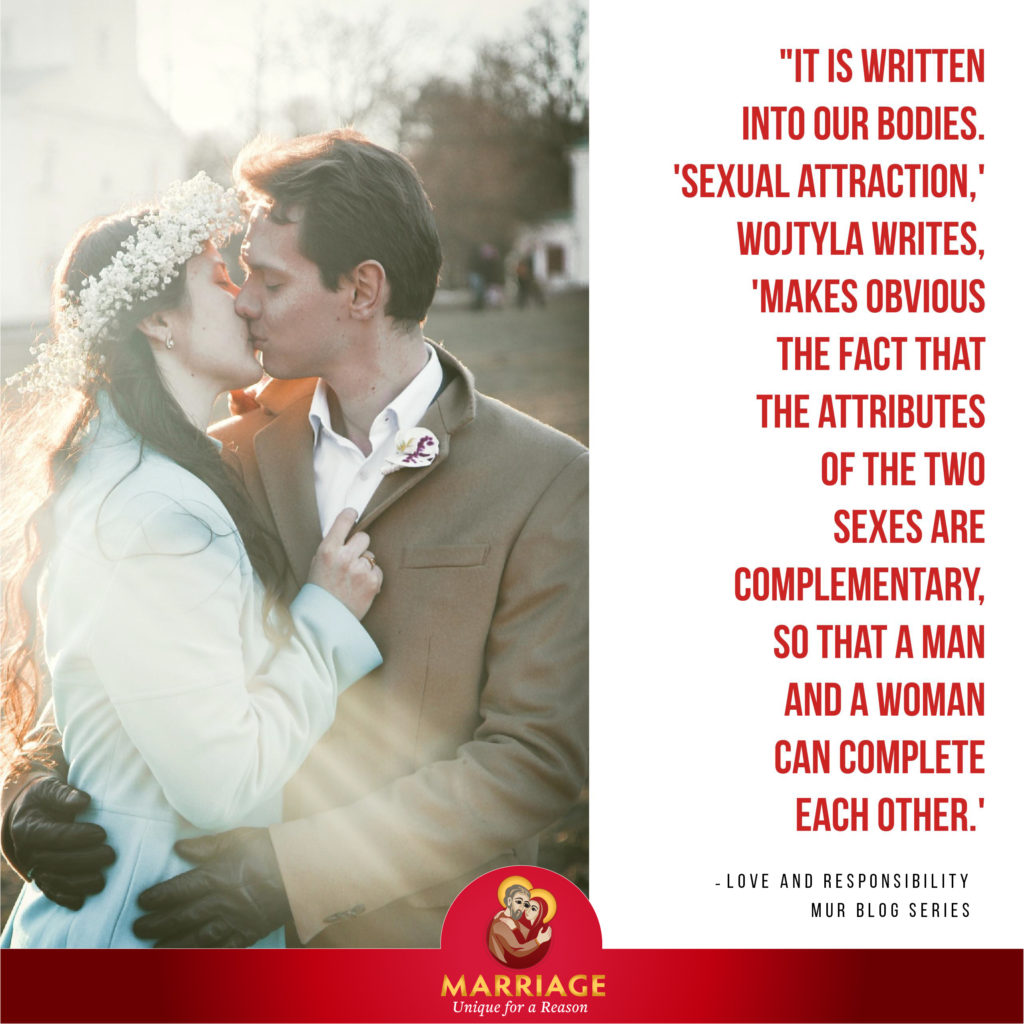 It is written into our bodies. “Sexual attraction,” Wojtyla writes, “makes obvious the fact that the attributes of the two sexes are complementary, so that a man and a woman can complete each other.”[6] Each of the sexes reveals one of the two ways of being human.
It is written into our bodies. “Sexual attraction,” Wojtyla writes, “makes obvious the fact that the attributes of the two sexes are complementary, so that a man and a woman can complete each other.”[6] Each of the sexes reveals one of the two ways of being human.
The continuation of humanity depends on individual people “obeying” their natural sexual desire and giving life to new human beings. Wojtyla argues that because sexual desire leads to new persons who have immortal souls, it is not solely of biological significance but existential: “It is bound up with the very existence of the person.”[7] Sexual desire thus gives an objective purpose and a shape to the love between a man and a woman—i.e. it’s important not just for the two of them, but for the world.[8]
The Religious Interpretation of Sexual Desire:
In the next sections, Wojtyla addresses the religious interpretation of sexual desire, followed by two misinterpretations. The religious significance of sexual desire is that it furthers the work of creation: when a married couple use the sexual urge in intercourse, they join “the cosmic stream by which existence is transmitted”[9] and become “the rational co-creators of a new human being.”[10] The two misinterpretations are: 1.) the body is evil and sexual intercourse is only a “necessary evil” for procreation and, 2.) a tendency to see all of human behavior in light of sexual desires and the pursuit of sexual pleasure. Wojtyla shows that neither of these interpretations are adequate.
In his “Final Observations,” Wojtyla writes that the Church has always taught two ends of marriage: procreation and mutual help. These aims will be fulfilled by following the personalistic norm (The only proper response to another human person is love). “Sexual morality and therefore conjugal morality consists of a stable and mature synthesis of nature’s purpose with the personalistic norm.”[11] In other words, knowing what is right and wrong when it comes to sex depends on knowing what nature’s purpose is (sex = babies) and what the loving thing to do is (according to what [who] a human person is). These things together are what give an objective form to love between man and woman.
[1] Wojtyla, Karol. Love and Responsibility (San Francisco: Ignatius Press, 1993), p. 46.
[2] Ibid, p. 47.
[3] Ibid, p. 47. Wojtyla notes here that this fact is not contradicted by persons who are born with ambiguous genitalia and the like, any more than any other disorder or disability puts human nature into question.
[4] Ibid, p. 48.
[5] The term “sexual orientation” today denotes a subjective feeling of attraction, but such a feeling can never change the objective nature and purpose of one’s sexual nature.
[6] Ibid, p. 48.
[7] Ibid, p. 52.
[8] Ibid, p. 53.
[9] Ibid, p. 54.
[10] Ibid, p. 55.
[11] Ibid, p. 67.
Thus ends the section on “The Person and the Sexual Urge.” Next, Wojtyla discusses “The Person and Love.”
[1] Love and Responsibility, p. 46.
[2] Ibid, p. 47.
[3] Ibid, p. 47. Wojtyla notes here that this fact is not contradicted by persons who are born with ambiguous genitalia and the like, any more than any other disorder or disability puts human nature into question.
[4] Ibid, p. 48.
[5] The term “sexual orientation” today denotes a subjective feeling of attraction, but such a feeling can never change the objective nature and purpose of one’s sexual nature.
[6] Ibid, p. 48.
[7] Ibid, p. 52.
[8] Ibid, p. 53.
[9] Ibid, p. 54.
[10] Ibid, p. 55.
[11] Ibid, p. 67.
Archive
Use v. Love: Love and Responsibility Series (Post #3)
Between ‘Use’ and ‘Love’:
The first distinction that Wojtyla makes in Love and Responsibility, between “use” and “love,” is one that we understand intuitively. No one wants to be used; It’s a terrible feeling! We commonly learn that pretty early on in life—maybe at the 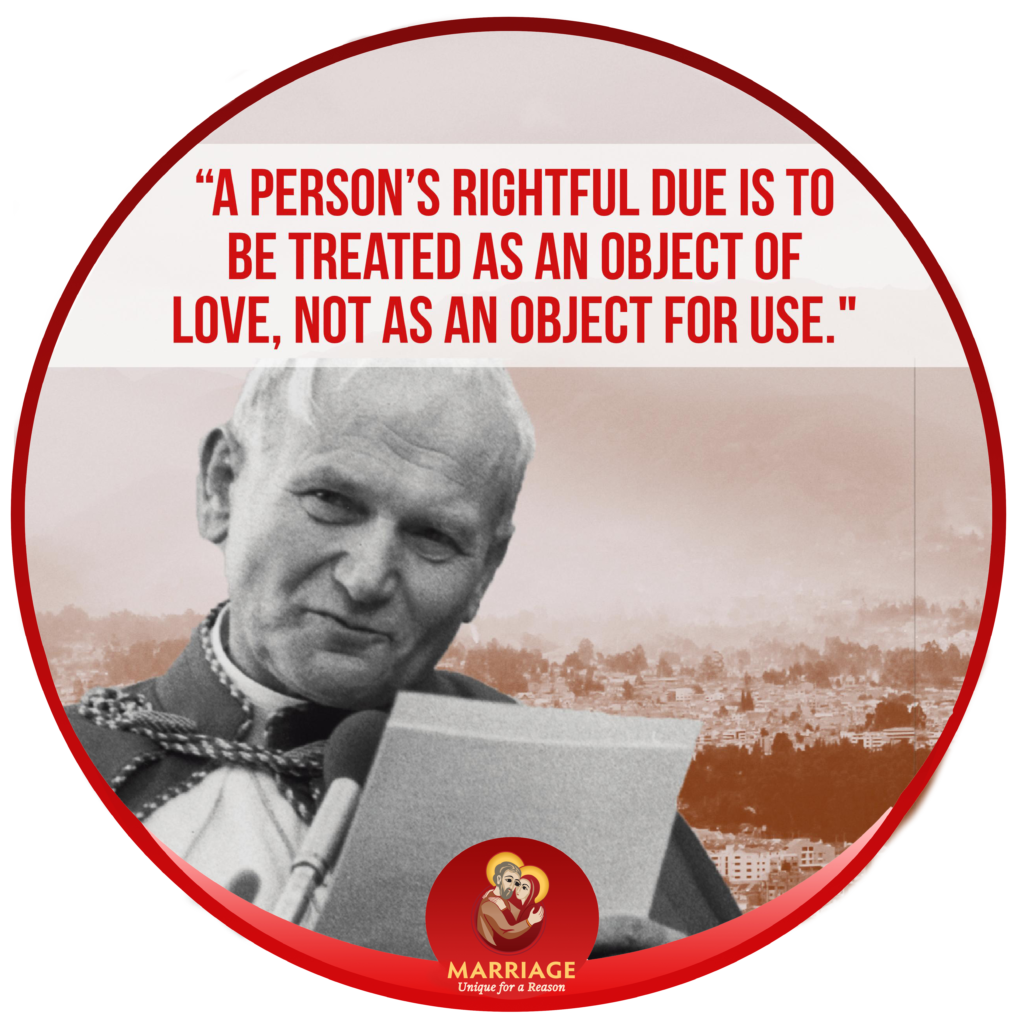 playground, or at a friend’s house—when we realize that the other kid only wants to play with us because we have the latest gadget that their parents won’t get for them. That’s such a small example, but these are real lessons in whether another person likes us for ourselves or only likes us for what we do for them.
playground, or at a friend’s house—when we realize that the other kid only wants to play with us because we have the latest gadget that their parents won’t get for them. That’s such a small example, but these are real lessons in whether another person likes us for ourselves or only likes us for what we do for them.
We all know that people can be used by others for sexual pleasure. This is not okay, even if the person consents to being used (such as in prostitution). A person has an inherent dignity that should rebel at even the suggestion that he or she should allow someone else to “use” them. But early childhood wounds, insecurity, or other factors may dull a person’s sense of how he or she deserves to be treated. In this section of Love and Responsibility, Wojtyla explains why using another person is incompatible with their dignity.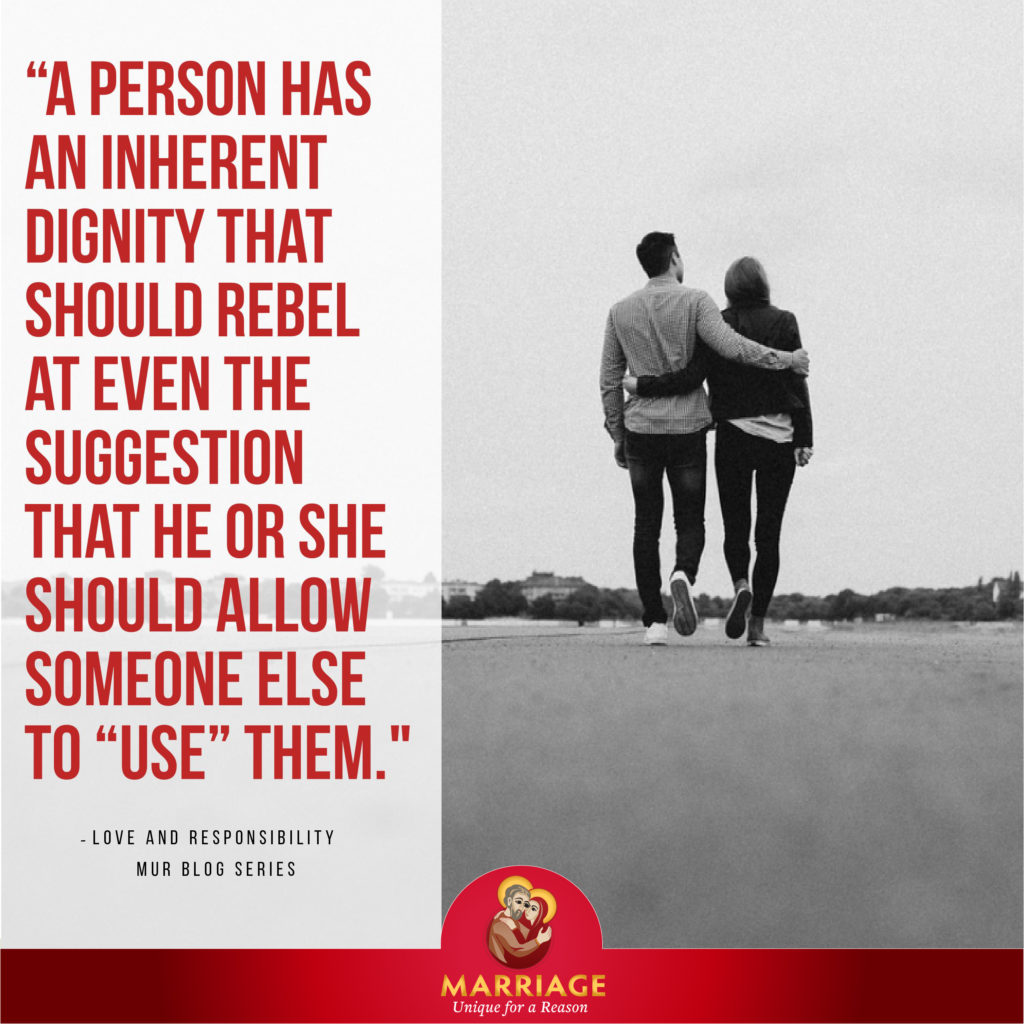
“To use means to employ some object of action as a means to an end—the specific end which the subject has in view.”[1] For example, I use a pencil to write on my calendar. The pencil is a means to the end of writing. My aim is to put something on my schedule; the pencil is just a means to accomplish that. In fact, a pen would do just as well. Chances are, I just picked up the closest tool, the closest object, that would do the job.
Karol Wojtyla’s Personalistic Norm:
When you think of it that way, it’s easy to see that a person shouldn’t be treated the same way as a pencil. Things are interchangeable, but persons aren’t. Wojtyla notes, “The sexual relationship presents more opportunities than most other activities for treating a person—sometimes even without realizing it—as an object of use.”[2] He calls us to be on guard against this tendency, which is in all of us to some extent.
There are lots of reasons why we may be tempted to treat another person as an object—as a means to our own pleasure or happiness. We may be more focused on our own feelings of loneliness or desire than on the actual person in front of us. But part of love is “a readiness to subordinate oneself” to the value of the person.[3] In other words, love means treating someone the way they deserve to be treated. If you love a person, you don’t want to use them—even if they were to mistakenly agree to be used.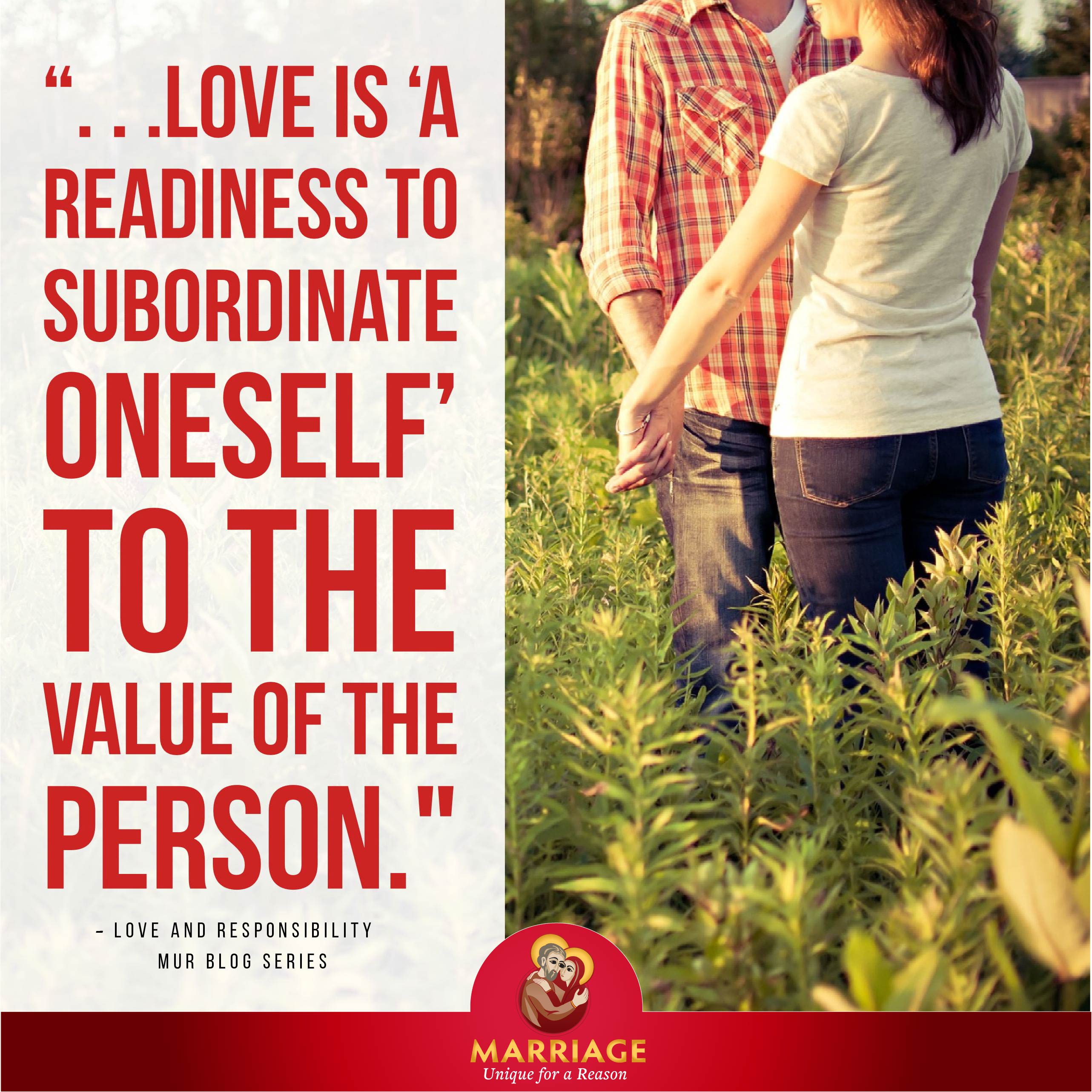
So we come to what Wojtyla terms the “personalistic norm”—the way persons ought to be treated: “the person is a good towards which the only proper and adequate attitude is love.”[4] The personalistic norm is essentially the same as God’s commandment to love. You could even think of it as the Golden Rule: treat others the way you want to be treated. But again, sometimes we mistakenly forget that we are children of God and should be treated with love and respect—sometimes we settle for being treated “okay,” which means we might think treating others just “okay” is fine. Instead, it might help to think about a young child whom you love—whether yours, or one in your family—and how you want them to be treated. This can be clarifying, kind of like when you ask a teenage boy how his little sister should be treated on a date. We often are more protective of others’ hearts than our own.
To conclude: Treating the person with love (and not using them) is a step in fulfilling God’s call to love our neighbor.
[1] Wojtyla, Karol. Love and Responsibility (San Francisco: Ignatius Press, 1993), p. 25.
[2] Ibid, p. 30.
[3] Ibid, p. 31.
[4] Ibid, p. 41.
Archive
Person as Subject and Object: Love and Responsibility Series (Post #2)
As mentioned in the Introduction, Karol Wojtyla (St. John Paul II) is interested in what (who) the human person is. What makes us human? Are there ways of acting that are “less” or “more” human? How do we know?
Person as Subject and Object:
The first section of Love and Responsibility is entitled “The Person and the Sexual Urge,” and the first topic is the person as both the subject (do-er) and the object (done-to) of actions. If I hug you, then I am the subject of that action, and you are the object. That does not make you an object in the sense that I have dehumanized you (we’ll talk about that later), but simply is a way of saying that “every subject also exists as an object, an objective ‘something’ or ‘somebody.’”[i]
Man as ‘Someone’ Not ‘Something’:
But man* is an object in a different way from everything else in the world, because he has an inner life. He is “someone,” not “something.” The term “person” developed out of a desire to express this difference.  Animals, for all their individual quirks and affections, are not persons. A person—and here Wojtyla uses Boethius’s definition of “an individual being of a rational nature”—has a spiritual character. He has an inner life that centers around truth and goodness.[ii]
Animals, for all their individual quirks and affections, are not persons. A person—and here Wojtyla uses Boethius’s definition of “an individual being of a rational nature”—has a spiritual character. He has an inner life that centers around truth and goodness.[ii]
It is this inwardness that makes it even possible to talk about ethics. A person has the power of self-determination. He can choose. “No one else can want for me. No one can substitute his act of will for mine,” writes Wojtyla. [iii]
Self-Sacrifice Found in Human Witness:
Often the most amazing stories we hear and share are stories of people who refuse to want or choose something, even their own life, over another value that they hold dear. For example, St. Maximillian Kolbe wanted life for another prisoner over his own. Or consider the book and movie “Unbroken,” where Louie Zamperini survives a plane crash, floats on the sea 47 days, and suffers in a series of prisoner-of-war camps, but never gives up his desire to live. Or remember Corrie ten Boom, who hid many Jewish people in her home in WWII, knowing that at any moment she could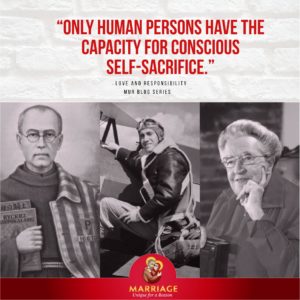 be caught. Only human persons have the capacity for conscious self-sacrifice.
be caught. Only human persons have the capacity for conscious self-sacrifice.
A person’s capacity to freely choose an action is the foundation of all ethics. When the object of a person’s action—that which is directly affected by what a person does—is another person, how much more important it is to know whether that action is good or evil. And since sexual morality almost always centers on the actions of one person with another person, then knowing what a person is, and how a person deserves to be treated, is crucial.
*I’m using “man” in its inclusive meaning of “human being, male or female.” It’s handy, less wordy, and conveys an idea of the common nature that we all share.
Click here to read the latest (all) –> Love and Responsibility Blog Series
[i] Wojtyla, Karol. Love and Responsibility (San Francisco: Ignatius Press, 1993), p. 21.
[ii] Ibid, p. 23.
[iii] Ibid, p. 24, emphasis original.
Archive
Gender Ideology Resource
“Gender” – as distinct from “sex” – is a term widely used today, but it is quite a new concept in history. While the term “gender” was used to denote masculinity and femininity as early as the Middle Ages (for example, in grammar), the idea that a human person’s masculinity or femininity could be separated from his or her bodily reality did not exist formally until the 1950s. Even then, the person at the origin of this concept – John Money – should give us pause, considering the controversy that surrounds him. There are many articles and books that examine the false separation of “gender” as a psychological experience and sexual difference as a biological reality, but that is not the purpose of this post.
MUR is sharing a simple resource document: a compilation of quotes from the last three pontificates, as well as other Church documents that address this phenomenon of “gender ideology” or “gender theory,” which is a position on anthropology (who a human being is) that is in conflict with the Christian one.
Please share this resource. Teachers, catechists, youth ministers, family life directors, and parents may find this compilation helpful in understanding and communicating about this topic:
Gender Ideology: Select Teaching Resources
Archive
Sunday Pope Quote: Bl. John Paul II on “Loving the Family”
“The future of humanity passes by way of the family. It is therefore indispensable and urgent that every person of good will should endeavor to save and foster the values and requirements of the family. I feel that I must ask for a particular effort in this field from the sons and daughters of the Church. Faith gives them full knowledge of God’s wonderful plan: they therefore have an extra reason for caring for the reality that is the family in this time of trial and of grace. They must show the family special love. This is an injunction that calls for concrete action.
Loving the family means being able to appreciate its values and capabilities, fostering them always. Loving the family means identifying the dangers and the evils that menace it, in order to overcome them. Loving the family means endeavoring to create for it an environment favorable for its development. The modern Christian family is often tempted to be discouraged and is distressed at the growth of its difficulties; it is an eminent form of love to give it back its reasons for confidence in itself, in the riches that it possesses by nature and grace, and in the mission that God has entrusted to it. ‘Yes indeed, the families of today must be called back to their original position. They must follow Christ.’”
–Familiaris Consortio, no 86 (italics original, bold added)
Archive
Friday Fast: For married couples and families struggling financially
Printable version (en español)
Intention: For married couples and families who are struggling financially or living in poverty – that God would provide for their needs and increase their trust in Him.
Reflection: Marriage matters to society. When a bride and groom become husband and wife on their wedding day, a new family is formed. Each family is an interdependent mini-society, born from the communion of husband and wife. As Bl. John Paul II said, the family is a “cradle of life and love.” It is the place where we learn to love and be loved.
For good reason, then, marriage and the family play a key role in Catholic social teaching (see ch. 5). The Church’s interest in marriage is not limited to religious concerns because marriage is not just a religious reality; it has major social implications, too. The Church’s concern for the poor overlaps with her concern for marriage because family breakdown has economic implications. For example, sadly, single mothers and their children are more likely to suffer from economic hardship.
Because marriage impacts each and every person in society, the Church strives to promote, strengthen, and defend marriage and the family. We pray today for all families who are struggling financially, that they would know the peace of the Lord.
Did you know? Today, we celebrate the feast day of St. Vincent de Paul. Born in France in 1580, St. Vincent was renowned for his work with the poor and sick. He founded both the Congregation of the Mission (known commonly as the Vincentians) and the Daughters of Charity. St. Vincent’s holy life inspired Bl. Frederic Ozanam to found the Society of St. Vincent de Paul, which now serves the poor in 148 countries.
More:
- Learn about the Bishops’ Call to Prayer for Life, Marriage, and Religious Liberty
- Sign the pledge to fast on Fridays for life, marriage, and religious liberty
- Join the Call to Prayer Facebook event
